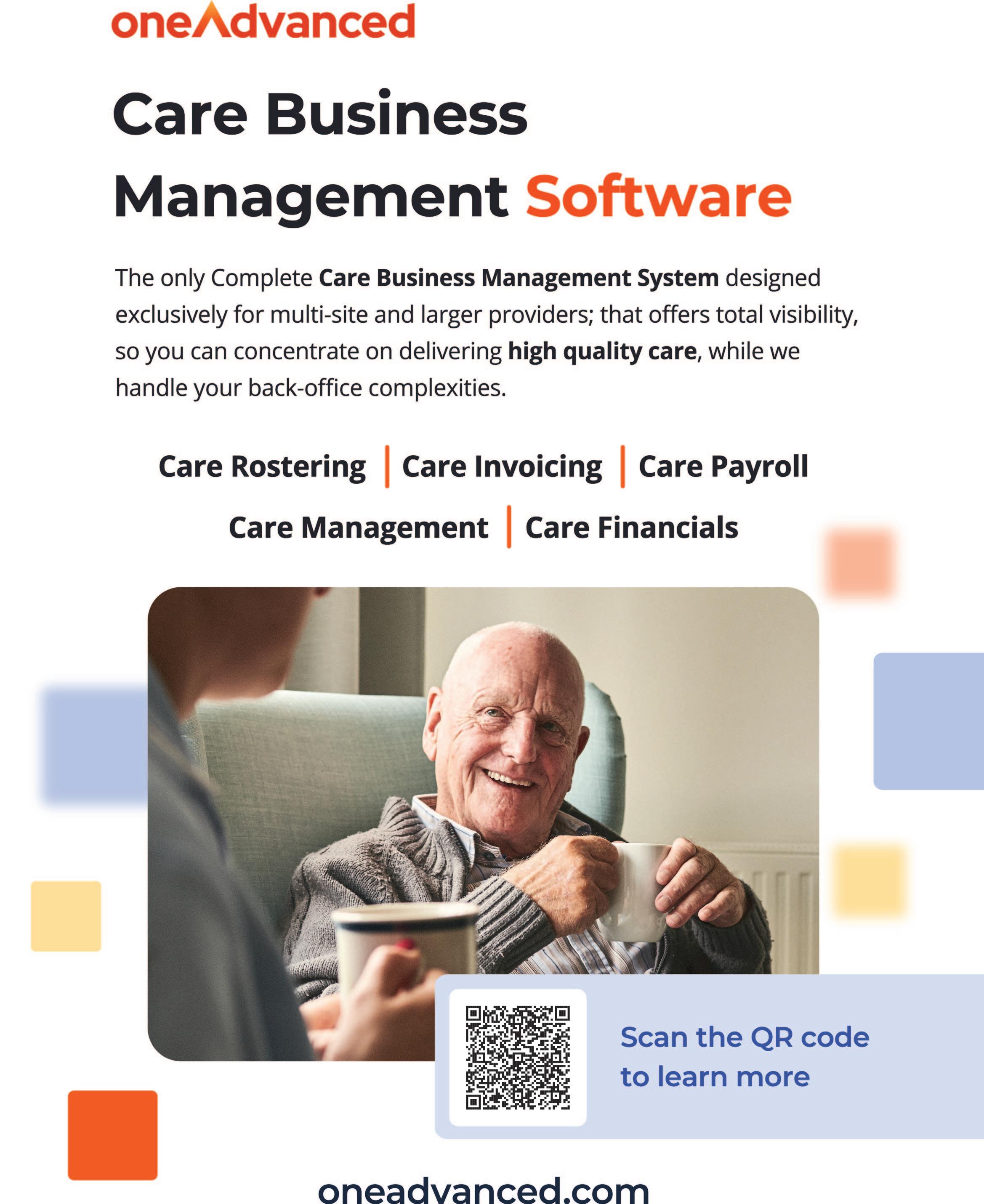

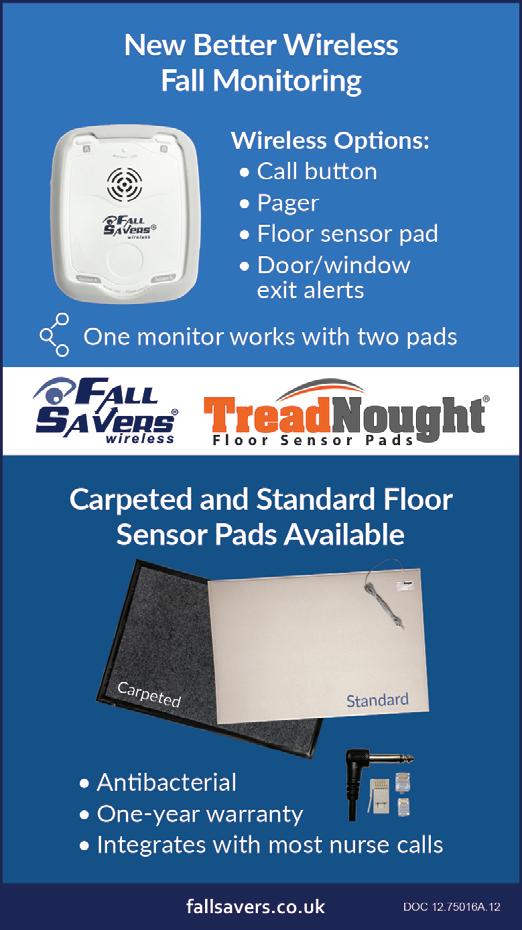













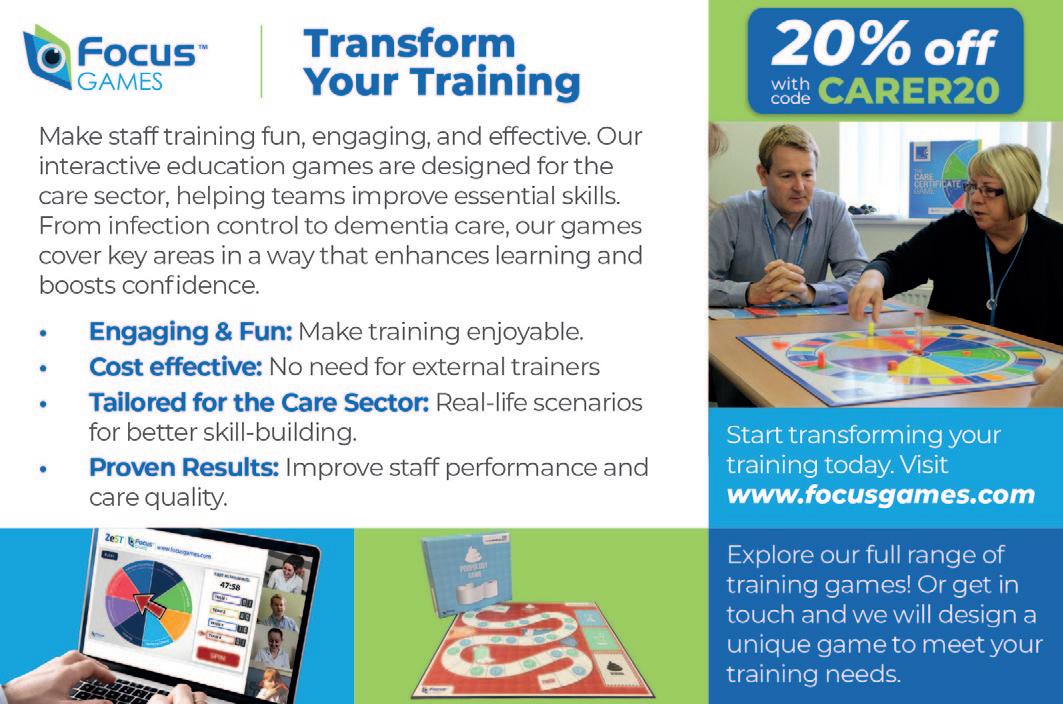
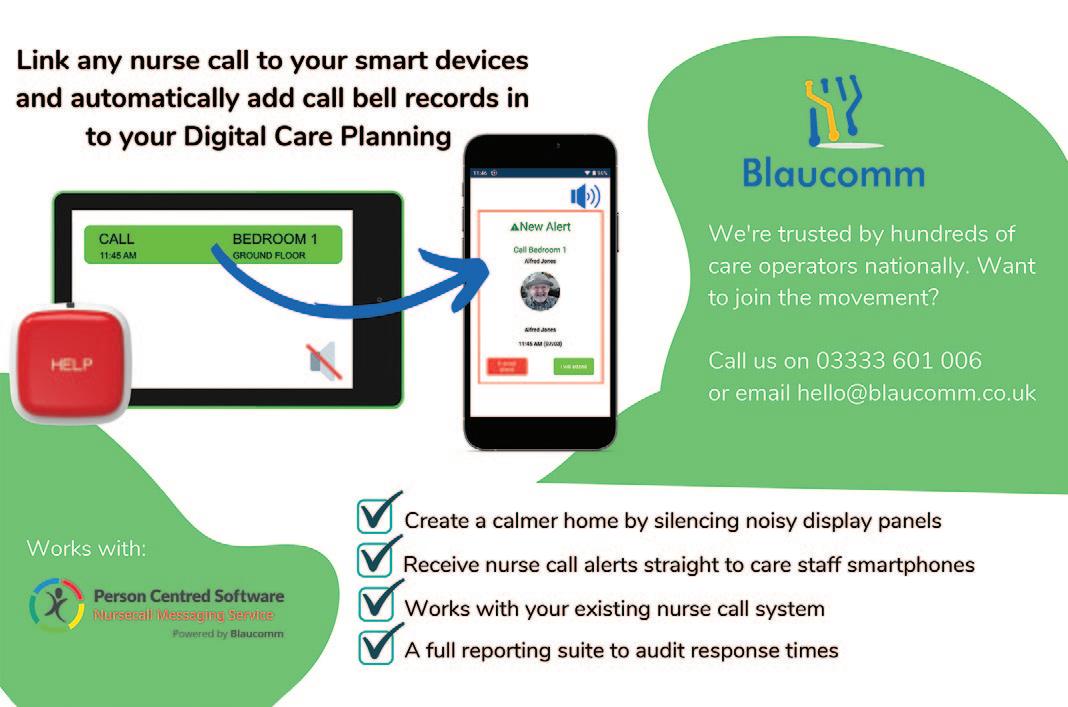
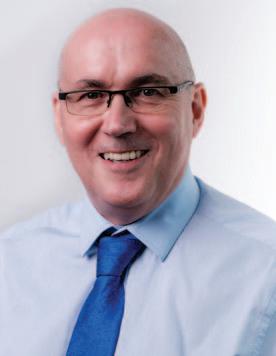
Editor
Peter Adams
Today’s Spending Review from Chancellor Rachel Reeves has, sadly, provided cold comfort to those of us in adult social care.
While the Chancellor pledged increased spending across a swathe of sectors—from defence and border control to housing, transport, science and AI—there was one glaring omission in her statement to Parliament: adult social care.
It is deeply disappointing, though not entirely surprising, that a sector so vital to the dignity and wellbeing of millions—older people, vulnerable adults, and their families—was once again pushed to the periphery of political focus.
As defence budgets grow, and as billions are earmarked for technology and infrastructure, the silence around care for our ageing population is both deafening and disheartening.
To be fair, the full Spending Review policy document does offer a small glimmer of recognition. It acknowledges the “significant challenges” facing the sector and reiterates the government’s “commitment to transforming the sector and supporting the care workforce.” Baroness Louise Casey has been tasked with leading an independent commission on adult social care reform, with the first phase set to report in 2026. A long wait, yet again.
The document also outlines a planned increase of £4 billion in adult social care funding by 2028–29. But we would be remiss not to question the substance behind the headline.
This uplift—while undoubtedly welcome—falls far short of the £7 billion annual increase that MPs across parties called for back in 2020 as a starting point for meaningful reform. To frame this delayed uplift as a transformation risks mistaking a long-overdue patch for the structural overhaul the sector urgently needs.

The workforce crisis is not something that can wait until 2026. Nor can overstretched providers, many on the brink of collapse, find solace in future promises while costs rise and recruitment falters now.
The Chancellor says she wants to be bold. Real boldness would have meant placing adult social care at the heart of today’s national priorities.
And let us not forget the context north of the border. Scotland’s own social care reforms—once heralded as groundbreaking—have now been significantly scaled back.
The much-touted National Care Service has been pared down amid budget constraints and political wrangling. It is a sobering reminder that rhetoric rarely translates into reform without sustained political will and realistic funding.
In fairness, this is only the Chancellor’s first fiscal announcement, and we await further clarity, particularly around how the Better Care Fund and NHS contributions will be deployed. But the message today was clear: adult social care remains a second-tier priority in a first-rate crisis.
We are already hearing voices of dismay from across the sector, and expect a fuller wave of reaction from providers, associations, and frontline staff in the hours ahead. We will carry comprehensive comment on our website tomorrow.
I would also encourage our readers to sign up for our bi-weekly digital newsletter at www.thecareruk.com and follow us on social media for all the latest news.
I can always be contacted at editor@thecareruk.com
The Carer is published by RBC Publishing Ltd, 3 Carlton Mount, 2 Cranborne Road, Bournemouth, Dorset BH2 5BR.
damage. Views expressed within this publication are not necessarily those of the publisher or the editorial team. Whilst every care is
responsibility for any effects, errors or omissions therefrom. All rights reserved, reproduction is forbidden unless written permission is


(CONTINUED FROM FRONT COVER)
Up to £10 billion allocated towards technology and digital transformation, thousands more GPs to be trained and funding allocated to deliver an additional 700,000 urgent NHS dentist appointments a year.
However, in her much-anticipated speech to Parliament this afternoon, Chancellor Reeves outlined increased support for the NHS, Defence, Border Security, Housing, Energy, Science & Technology, Transport, and Artificial Intelligence—yet failed to make any mention of adult social care.
The omission has caused huge disappointment to a sector still grappling with post-pandemic pressures, record vacancy rates, and spiralling operational costs.
£4BN INCREASE 2028-29
While making no direct mention of adult social care in her address, there is reference to it in the Full Spending Review Policy Paper, which states: “The government recognises the significant challenges facing the adult social care system and is committed to transforming the sector and supporting the care workforce. Baroness Louise Casey is leading an independent commission to build consensus on reform of adult social care.”
“The first phase will report in 2026 and will focus on how to make the most of existing resources to improve the system. The SR allows for an increase of over £4 billion of funding available for adult social care in 2028-29, compared to 2025-26. This includes an increase to the NHS’s minimum contribution to adult social care via the Better Care Fund, in line with DHSC’s SR settlement. This will support the sector to improve adult social care provision, with further details to be set out shortly.”
However, many in the sector view the todays silence as yet another example of successive governments failing to confront the ongoing crisis in social care.
THE NHS CAN’T THRIVE WITHOUT BETTER SOCIAL SERVICES
Laura Jordan, partner and head of corporate in the governance, funding and corporate team at Anthony Collins, said: “Without a plan to tackle the social care crisis, the Government’s NHS spending plan won’t work. The NHS can’t thrive without better social services.
“We have fantastic people working in the care system in this country, who go above and beyond to deliver exceptional services to the people and families they support. But the system is broken and it can’t continue to run on fresh air, hard work and kindness.”
“Social care services for vulnerable or disabled children, adults and elderly people aren’t a nice-to-have, they are essential to our way of life. It is a statutory obligation for local authorities to meet the needs of vulnerable and disabled people, but without the means to award reasonable fee uplifts to providers, they can’t do anything to help.”
“Instead of addressing the social care crisis, Government has added to the challenges that social care providers are facing by changing the immigration rules, which will cause current worker shortages to worsen, and cutting benefits which will increase demand. Providers can’t operate without staff and adequate funding to deliver services, and more businesses will close as a result.
“Research has shown that a third of social care providers are considering exiting the market in the year ahead. This means the remainder
will be spread too thin, and the people receiving support will end up paying the price.”
“Baroness Carey’s Social Care Commission could make a difference, but the process is too slow and may not be able to deliver any meaningful benefits in time. The Government is ignoring social care and failing to recognise what an important role it plays in freeing up hospital beds and optimising NHS resources.”
COMPLETELY ABANDONED
Carers Trust's CEO, Kirsty McHugh, said: “Millions of unpaid carers across the UK will feel completely abandoned by the Chancellor’s Comprehensive Spending Review. By continuing to starve local government of the funding it needs for social care, the sector’s crisis will only continue. This will heap even more pressure on unpaid carers and the underfunded, overstretched local care organisations they rely on. It will also make it harder for the Government’s pledges on the NHS to be met.”
“Carers Trust is pleased the Government has committed to replacing the Household Support Fund with long term funding for a new Crisis and Resilience Fund. This fund should support all those in financial crisis, including carers. However, the Government still seems determined to plough on with welfare reforms which will push many into poverty. Brutal cuts to Personal Independence Payments mean a vital financial safety net is being removed for carers and those they look after. The Government urgently needs to ensure carers and the local services they rely on are properly supported.”
UTTERLY BROKEN
Tom Marsland, Head of Policy at the national disability charity Sense, said: “The lack of focus on social care in the spending review will come as a huge disappointment to the 1.6 million disabled people with complex needs across the country and their families.”
“The social care system should be a lifeline for disabled people. It should be working alongside the NHS to deliver vital services. But for years it has been underfunded, left to lag behind until now it is utterly broken.”
“Sense has welcomed and will work with the Casey Commission as it makes recommendations to transform social care in the long term. But there will be no big changes until at least 2028.
“Social care is in crisis – disabled people can’t wait that long for change. Urgent investment in social care is needed now.”
DIFFICULT DECISIONS
Suneel Gupta, head of private healthcare at RSM UK, said: “The NHS has come out as one of the winners in today’s Spending Review, however, this boost will be consumed by pre-existing pressures faced by the UK’s healthcare system. The Chancellor’s 3% average annual real terms growth in NHS day-to-day spending is crucial to meet their goals of shifting from hospital to community care, sickness to prevention, and analogue to digital.”
“But it’s unclear exactly how and where they will spend this money. The additional funding must be used effectively, including towards greater collaboration between the private sector and NHS, as well as investment in technology to deliver these objectives. It is key progress is monitored closely to ensure they achieve an appropriate return on
investment, and relevant parties are held accountable.”
“While the Spending Review included an increase of over £4bn for adult social care in 2028-29, this falls short of what is needed in the sector. The Chancellor also mentioned a fundamental reform across social care, but details are lacking on what this will look like in practice. The reform must include breaking down silos in social care, the NHS and wider healthcare industry to allow better connectivity and alignment between social care and the wider health ecosystem. Without this, it’s unlikely we’ll see a notable improvement in end-to-end care for patients.”
ANAEMIC GROWTH
Nuffield Trust Senior Policy Analyst Sally Gainsbury said: “ The spending announced for the NHS exemplifies the dilemma faced by a government boxed in by anaemic growth and little appetite for further tax rises.”
“Spending pressures including inflation and increased planned treatment capacity mean that the funding announced at the Autumn Budget has been more than wiped out. DHSC starts the period covered by this Spending Review £1.3bn in the red.”
“Compared to the settlements for other departments - from policing to education - the NHS deal looks generous. But seen in the context of all the promises made by the government to the British people - to drive down waiting lists, shift care closer to home, rapidly improve tech - and the commitments to meet staff pay demands and rising costs of new drugs, today’s settlement soon melts away.”
“We now know what money Baroness Casey will have to work with as she carries out her review on social care over the next few years, and it’s unlikely to lead to the transformation we were promised. Local government may find enough money to keep up with existing demands from today’s settlement, but that will only come by racking up council tax again, and little will be left for a programme of reform. Plans for a Fair Pay Agreement for care workers are welcome, but with tightly constrained finances, councils could only fund this by cutting into other budgets.”
A DROP IN THE OCEAN
Sam Monaghan, Chief Executive at MHA commented, “We are pleased that the Chancellor has acknowledged the need for ‘fundamental reform’ in social care and that the government recognises the significant challenges facing the adult social care system.
“Whilst we welcome the increase of over £4 billion of funding available for adult social care in 2028-29, it is imperative that the Government spell out the detail through the better care fund as soon as possible to provide certainty, although this is a drop in the ocean compared to the extra £29bn made available to the NHS.
“The increase in grant-funding for local government, must translate into additional funding to ensure the true costs of care are met. Providers have seen increased costs over the past decade with chronic underfunding of council-funded care placements over many years have been intensified by Covid, the cost-of-living crisis, energy price hikes, a workforce crisis and increased national insurance costs. This is not sustainable.”
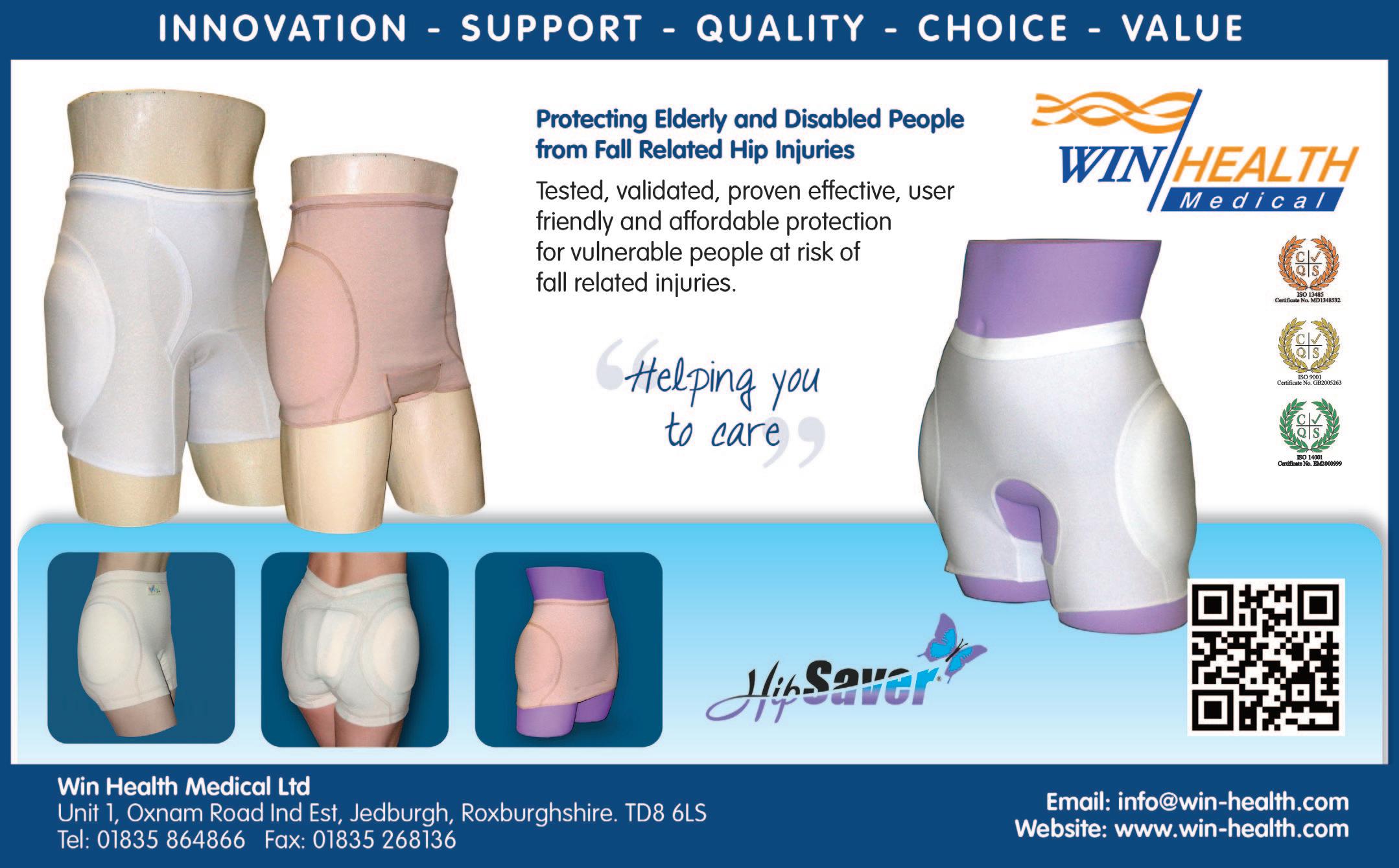
By Fran Kirke, OneAdvanced’s VP of Care and
health and care sector for over 15 years. OneAdvanced Care is a portfolio of business software designed specifically for the social care sector. (www.oneadvanced.com)

When I think about the care sector, I think of a community built on connection, empathy, and a commitment to supporting those who need it most. But at the same time, it’s a sector facing immense pressure – growing demand, operational inefficiencies, and stringent regulatory compliance.
And amongst the biggest digital transformation care has seen, artificial intelligence is now set to play a growing role. So, it’s natural to wonder, how will this blend of care and technology work? More importantly, how should it work for those living and working in the sector?
From my conversations with care professionals at the recent Care Show London, it’s clear to me that the sector is cautiously optimistic about the potential of AI but insists we tread carefully, putting people before processes. And I couldn’t agree more.
A TOOL TO HELP, NOT REPLACE
If there’s one sentiment that echoes throughout the care sector, it’s this: AI should not replace people, it needs to empower them. With the right approach, AI solutions can remove burdensome admin tasks, giving care workers what they desperately need more of—time. Time to focus on the people they support. Time to provide personal, meaningful interactions that shouldn’t be sacrificed under the weight of endless paperwork.
AI can be used to handle reporting, summarise care notes, or even support with local authority tenders. By taking these tasks off workers’ plates, AI can help free up time to focus on care itself. Some people I spoke to described it as giving them the bandwidth to ‘care more deeply’. However, there was understandable concern from some that this should never mean ‘automation at all costs’. People want assurances that AI won’t become an invisible decision-maker, introducing risks by sidelining human judgement. Because what good is tech for the sake of tech in a sector like social care, if it doesn’t put human needs at the forefront?
The care sector is understandably risk-averse, and for good reason. We’re dealing with people’s health, wellbeing, and livelihoods so it needs to be closely protected.
So, for providers to have confidence in AI, it must earn the trust of all people living and working in care.
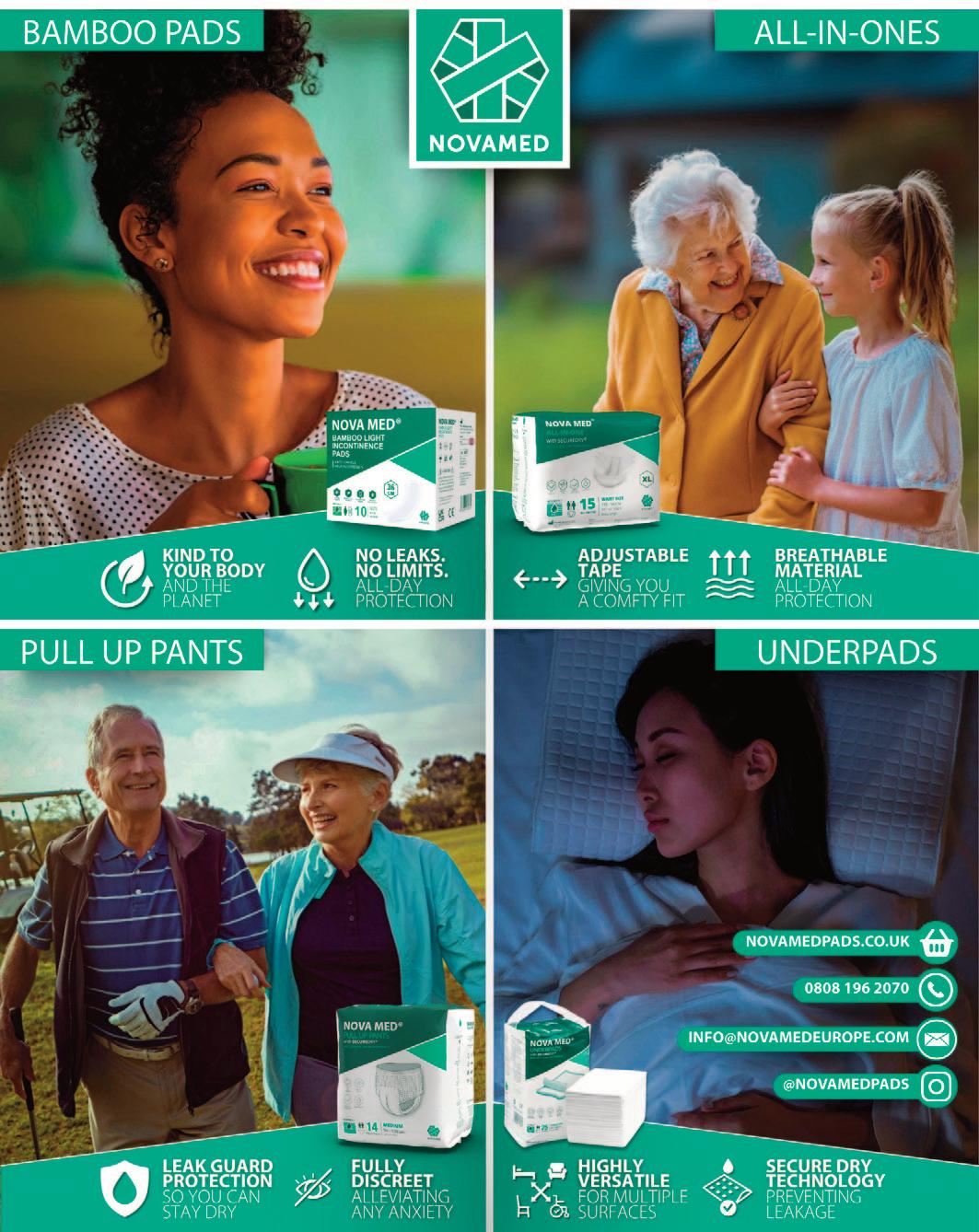
And it often starts with security. As you know, the care sector handles sensitive data, governed by vital regulations. Therefore, AI must hold up under scrutiny here, ensuring personal data is not misused, vulnerable to breaches or public access.
And to further build trust, education also emerged as a priority. If we want the care sector to see AI as a partner rather than a threat, we’ve got to demystify it. Training programmes and transparent communication will be key to show care teams not only what the technology can do but also that it’s here to work with them, not against them.
One phrase always resonates with me when talking about AI within care circles: ‘human in the loop’. For all the efficiencies AI promises, there’s no replacing the insight, intuition, and compassion of a trained professional.
AI could assist with early detection of health issues by analysing patterns in client data or flagging anomalies. But the final call, the decision to act, should always rest with a qualified care professional.
The same applies to personal interactions. AI might recommend adjustments to a care plan based on behavioural patterns, but it cannot recognise the subtleties of someone’s emotions or what they’re not saying with words. Keeping human oversight ensures that any system can remain empathetically rooted in the care sector’s core mission – to provide person-centred care.
After speaking to many professionals in the sector, it reinforced to me that this balance is key. We should leverage artificial intelligence to eliminate inefficiencies while reinforcing, not replacing, human expertise.
Despite the concerns, there’s immense optimism about what AI can achieve for care. And by streamlining operations, many in the sector see AI as a missing puzzle piece.
From analysing information from multiple sources, to predicting trends or identifying gaps, AI could bring reduced inefficiencies and perhaps even improved care outcomes.
And yet, a recurring point raised is caution around how quickly we implement these technologies. The fear isn’t AI itself, but the lack of sufficient guidance around it. Thoughtful, deliberate action is therefore needed to ensure safe and ethical adoption.
At the end of the day, care is deeply personal, often intimate work. So of course, people within the sector are right to protect it fiercely. The introduction of AI must respect this, acting as a supportive partner rather than a disruptive force.
With empathy, education, and a critical focus on safety, we can position AI as an enabler of better care. AI is already proving it can help us rise to the challenges we face. And by keeping humans in the loop, safeguarding trust, and listening to the sector’s voice, we can help ensure AI supports the care sectors’ needs, empower care professionals and support care delivery.


• We specialise in the sale and purchase of quality used wheelchair accessible vehicles and ambulances.
• They can be bought as seen or refurbished and sign-written to your own requirements.
• Fully serviced, new mot & warranty
• Engineers inspection supplied if required.
• Free delivery service available
• All buses comply with new legislation
•
• Lease hire and purchase


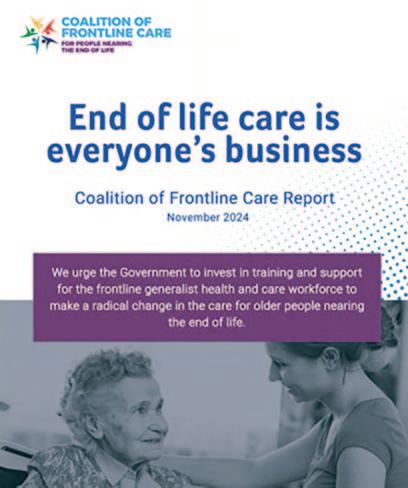
The Coalition of Frontline Care for People Nearing the End of Life welcomes the publication of the Palliative and End of life care Commission report.
In a statement a spokesperson said: “We share the Commission’s desire for urgent improvement in the quality and availability of care for people nearing the end of their life. We were pleased to have had the opportunity to contribute by providing oral and written evidence, as well as submitting our report, End of Life Care is Everyone’s Business.”
“Though much of the Commission’s report focused on specialist palliative care, the importance of the generalist health and social care workforce was highlighted as vital to any future National Strategy.”
“The need for quality training and support for health and social care staff at all levels was emphasised as a key means of improving care and preventing emergency admissions.
HC-One’s Victoria House Care Home in Stockton-on-Tees, was visited on Friday 6th June by MP for Stockton North, Chris McDonald.
Residents and colleagues of the HC-One owned care home enjoyed meeting their MP, Chris McDonald, and chatting to him about what life is like at Victoria House Care Home – which is an integral part of the local Stockton-on-Tees community.
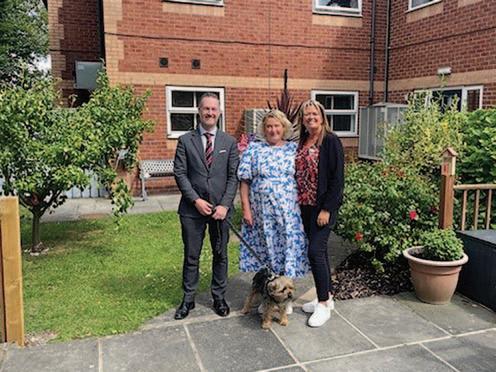
MP Chris McDonald enjoyed visiting the 70 bedded residential, nursing and dementia care home,
and chatting to Amanda Gell, Home Manager at HC-One’s Victoria House Care Home and Hazel Southern, Area Director, in the garden area before indulging in tea and cakes in the home’s dining room.
Amanda Gell, Home Manager at HC-One’s Victoria House Care Home, commented: “We were delighted to welcome MP Chris McDonald to our home. Everyone had a great time, chatting and discussing key issues they care about and what actions can be taken to overcome them.”
Mandatory undergraduate palliative care training for all health and social care staff was recommended from Sept 2026.
The benefits of early identification were noted, and advance care planning discussions with patients and families to plan future care were affirmed, with training in communication skills recommended.”
“We were also pleased to see the report’s focus on the importance of collaboration with other specialists, including experts in older people’s healthcare (geriatric medicine), in the report. A proposal for accessible evidence from both health and social care professionals via an Impact Centre (a ‘what works’ point of contact), was also welcomed.”
The Coalition of Frontline Care represents the frontline generalist workforce in health and social care, including over 3 million staff in care homes, domiciliary care, primary care, acute and community hospitals, and retirement communities. Together, this workforce provides the majority (approx. 90%) of frontline care for people nearing the end of life in the UK. We advocate a radical transformational shift in care for people nearing the end of life, the majority of whom live and die with age-related conditions, such as frailty and dementia, along with multiple other long-term conditions. Therefore, if good quality end of life care is to be the norm in our country, we affirm the need for a ‘both/and’ approach, including investment in both generalists and specialists in end-of-life care.

WE NOW SUPPLY A WIDE RANGE OF FURNITURE
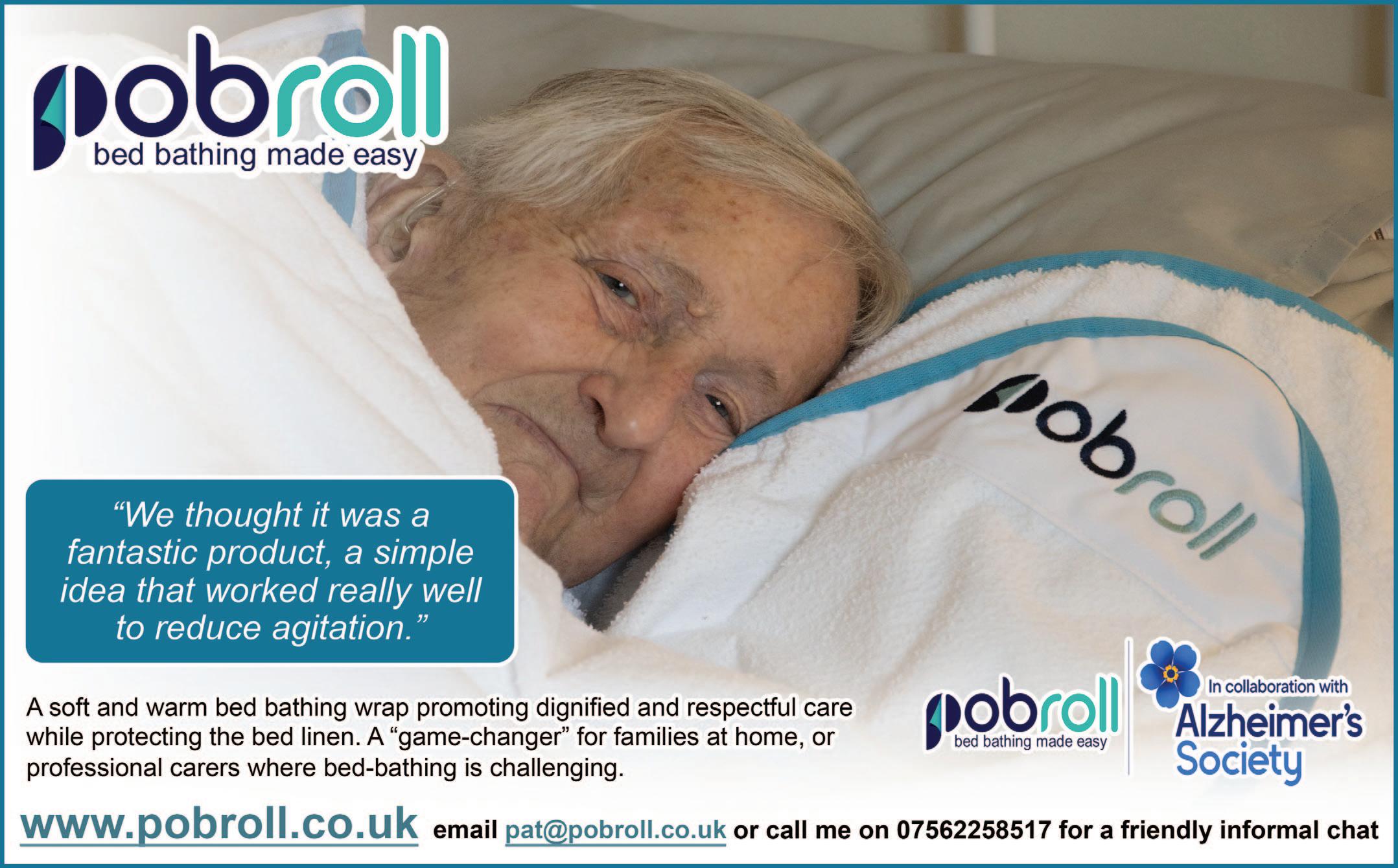
by Louise Blezzard, Founder and CEO of Venelle
home care service (www.venellelife.co.uk)

Loneliness Awareness Week (9–15 June) is a powerful reminder of the emotional toll isolation can take – particularly for those receiving care at home. While practical assistance is essential, it’s often the emotional support from caregivers that makes the greatest difference. Through genuine companionship and engaging interaction, caregivers can enrich lives and protect against the harmful effects of loneliness.
According to Age UK’s December 2024 report, 1.4 million older adults
in the UK experience chronic loneliness. More than a third of those aged 65+ say loneliness negatively affects their health. The problem is most acute among those living alone – highlighting the essential role that caregivers play in bridging the gap between isolation and connection.
Companionship is more than conversation. It’s about creating a space where individuals feel heard, valued and connected to the world around them. For those in home care, these emotional bonds are vital to overall wellbeing, offering a sense of purpose, joy and belonging. Here are six ways caregivers can actively foster companionship and reduce loneliness:
1. ORGANISE SOCIAL OUTINGS AND ACTIVITIES
Taking individuals to parks, cultural events or local gatherings offers a refreshing change of scenery and opportunities to form new connections. When tailored to the person’s interests, these experiences become more meaningful – and more likely to spark joy.
2. ENCOURAGE GROUP CHALLENGES
Shared activities like fitness routines, cooking sessions or gardening projects can encourage collaboration and community spirit. These interactions offer physical, mental and emotional benefits – while helping participants form lasting bonds.
3. USE TECHNOLOGY THOUGHTFULLY
Digital tools can be a lifeline, especially for those separated from family or friends. Regular video calls using platforms like Zoom or
FaceTime help maintain close relationships, while virtual events or immersive experiences allow individuals to explore the world from home.
4. CREATE A PEN PAL SCHEME
Letter writing brings a personal, nostalgic charm that digital communication often lacks. A pen pal programme allows individuals to exchange stories and reflections – fostering long-term engagement and emotional connection.
5. SET UP VIRTUAL BOOK CLUBS
Books are a natural bridge to conversation and shared reflection. Virtual book clubs stimulate the mind and provide a gentle social structure – allowing care recipients to express themselves and bond over shared stories.
6. MAKE TIME FOR REGULAR CALLS
Sometimes, something as simple as a phone call can brighten someone’s day. Regular check-ins – whether by caregivers or trained volunteers—offer reassurance, reduce anxiety and reinforce the message that someone cares.
At Venelle, we believe companionship is not an optional extra – it’s central to high-quality home care. During Loneliness Awareness Week, we reflect on the human need for connection and the power caregivers have to meet that need with empathy and warmth.
With the right support, loneliness can be replaced by belonging –and lives can be lived with dignity, independence and joy.
The executive chef at a Midlands-based care group has been awarded the Chef of the Year title at the recent Care Home Catering Awards. Anas Al Saadi is known affectionately as ‘Ratatouille’ by his colleagues and residents across the Macc Care Group, where he heads up the catering offering, thanks to the personal touch he puts into all his food.
This award recognises Anas’ culinary skills, innovative approach to nutrition and his commitment to creating meaningful meals for the residents.
Anas draws inspiration for his menus from personal stories and memories of the residents he serves.
The title of Chef of the year recognises Anas’ ability to tailor his menus and recipes to fit individual resident’s’ needs. He understands that older adults have specific dietary requirements and he designs his menus to ensure they’re balanced and rich in protein, fibre and essential vitamins. He also works to ensure that residents with conditions like diabetes or high blood pressure receive meals that support their wellbeing without compromising on taste or variety.

The award also commends Anas’ sensitivity to residents with conditions like dysphagia or dementia. He hand-pipes pureed diets to resemble traditional meals and has introduced a ‘restaurant service’ for those
Social Care TV continue to fly the flag for highest quality online training for Health and Social Care, after unwavering commitment to excellence within the sector for over 25 years.
Their widely-used health and social care specific courses - produced and edited in-house - are expertly designed to make learning engaging, informative and, therefore, highly effective for learners.
Accredited by CPD, training with Social Care TV is quality assured, comprehensive and relevant.
As one of the leading online training providers in the health and social care sector in the UK, they supply training for local authorities, recruitment agencies, care home groups and other health and social care organisations.
Their feature-rich Manager platform has further been enhanced this year with the introduction of several new Manager tools designed to aid with compliance, reporting and trainee management. Features now available include:
• Compliance Dashboard with Traffic Light System
• Downloadable Trainee Matrix
• Custom Bundles
• Trainee Groups
• Bulk Uploads
• Bulk Enrolment Onto Custom Bundles
• Course Enrolment Notifications
• Course Reminders
living with dementia, allowing them to pre-order meals, reducing stress at mealtimes.
Anas’ unique ability to connect his cooking to the residents is also recognised in this award, having both his signature dishes – “Nonna’s Legacy” and “Seafood Medley” inspired by a residents upbring in Pompeii.
Anas said he was delighted with the award: “Mealtimes are such an important part of our residents’ daily lives, I spend time with each resident, learning about their life history and their favourite meals. Food is not just about nourishment; it’s about creating an experience, one that brings joy and a sense of home.
“It is wonderful that it is all being recognised in this award win.” This is the latest award win for Anas, who earlier this year was named winner of the Care Home Chef Award at the Regional Great British Care Awards, and was highly commended at the national Great British Care Awards.
Bhav Amlani of Macc Care said: “We are so proud of Anas and the dedication he shows to creating exceptional dining experiences for our residents. His ability to connect with each individual, understand their needs, and deliver food that brings both comfort and joy is a testament to his culinary expertise and compassion. This award is a well-deserved recognition of his hard work and commitment to excellence.”

SCTV regularly release new and updated high-quality courses. Previews for all courses can be viewed at: Courses - Social Care TV (www.social-care.tv/courses/course-details)
To enhance their learners' experience further they have created free, comprehensive subject-specific workbooks which were rolled out across all courses this year. This unique addition provides excellent value and a fully robust training package.
SCTV are delighted to have won several awards over the last 12 months including:
• Best Online Health and Social Care Learning Platform’ – Global Health & Pharma Social Care Awards 2024
• ‘CPD Provider of the Year’ – The CPD Awards
• Social Care Training Provider of the Year’ - Corporate Livewire Innovation & Excellence Awards
Gold standard customer service remains a core staple of the business, with expert support and guidance provided via telephone, email and live chat. They place great importance on the training and development of their customer services team to ensure that they continue to
provide a personal, friendly and knowledgeable service.
Their much-loved ‘Care Worker of the Month’ award recognises and rewards the selfless dedication shown by care workers across the UK and they proudly support the Care Workers Charity who aim to advance the financial, professional and mental wellbeing of social care workers.
SCTV believe that high quality training should be accessible to all and offer regular, free courses which include a digital certificate accessible via their website.
The company stands behind a clear mission and set of values which define their ethos and their dedication to both the Care Sector and those within it. These can be viewed at: Mission Statement and Core Values - Social Care TV (www.social-care.tv/about/mission-statement-and-core-values) Social Care TV are a responsible business, committed to ensuring that their actions have a positive impact on their employees, customers, the wider health and social care community and the environment.
Above all, SCTV consistently strive to make a meaningful contribution to the wellbeing of those being cared for.
For more information please see: Homepage - Social Care TV (www.social-care.tv) and see advert on the facing page.
Social care providers across York and North Yorkshire, whether members of the Independent Care Group (ICG) or not, are being urged to attend one of two emergency meetings that could shape the future of care in the region.
The ICG is calling on providers to give a clear mandate on how to respond to the unsustainable fee levels for some providers being offered by commissioners, fees that many say are making quality care increasingly unviable.
The two meetings will take place on Tuesday 10th June at 6.30pm at Skipton Town Hall and on Thursday 12th June at 6.00pm at St Lawrence Community Hall in York. Providers are urged to attend

whichever session suits them best.
Mike Padgham, Chair of the Independent Care Group, said: “This is the most serious situation we have faced in years. Providers are being left with no choice but to consider options such as handing contracts back to commissioners, including the Integrated Care Board, and even withdrawing services in certain circumstances. We can’t carry on like this.”
He continued: “This is a once-only opportunity for care providers, whether they’re ICG members or not, to have their say and shape the next steps. These decisions will affect the future of care in our region. Please be there.”
A DORSET care home has stepped in to save a community group which was at risk of closure due to a lack of volunteers.
The Open House group has been operating for 25 years from the village of Sandford, near Wareham, and is a place where members of the community come together on a monthly basis for social interaction and activities.
However, the main organiser is about to leave the area and two other volunteers are also retiring, so the future looked bleak for the group which regularly attracts over 20 people to its sessions. But it’s future has now been secured after the Pine Martin Grange Care Community in Sandford agreed to take over the running of the group.
And the group has come full circle because the sessions are now being held in the Sandford Heritage Hall, a refurbished Victorian school and church hall in the grounds of Pine Martin Grange.

Open House used to run from the hall when it was a church ten years ago before it moved to Sandford St Martin’s Church.
Open House is now being overseen by Helen Mutton, Activity Coordinator at Pine Martin Grange. Helen said: “We had regular visits to Open House as part of the activity programme at Pine Martin
Grange so when we heard it was in danger of closing, we knew we had to step in to ensure this did not happen.
“Several of our residents attend Open House including someone who went to school in the heritage hall, another who taught there and a gentlemen who played the organ, so it’s a venue not only literally on our doorstep but which has lots of special meaning and memories as well.
“We are delighted to be running Open House and are hoping to attract even more people from our local community to join us for coffee, cake, raffle, games and, more importantly, some social interaction.”
Lesley Milsom, the former organiser of Open House who is leaving the area, said: “There’s no doubt that if Pine Martin Grange hadn’t come forward then we would have to close after 25 years, which would have been incredibly sad indeed.
“It’s an important community asset so I am delighted that it can now continue thanks to the home and Helen in particular.”
Maureen Lever, who assists Lesley and will now work closely with Helen, said: “I have been involved with the church for 48 years so it’s fantastic we have been able to keep the group running with the support of Pine Martin Grange."


It’s a time of massive upheaval in the care sector, particularly when it comes to staffing and employment.
Employment Partner at Ramsdens Solicitors (www.ramsdens.co.uk) Gareth Dando explains how employers should navigate upcoming changes, including the Employment Rights Bill.
It’s a time of major change for employers in care. The fundamentals which have held the industry together in recent years, foreign workers and flexible conditions, are being restricted, so the care workforce is set to change radically in the coming years.
This will come as another major shock to the industry, which has been shaken relentlessly in the past few years, from Brexit to Covid. However, the upside of having been through so many changes already is that we’ve learned how to, and how not to, navigate them.
Changes to employment law tend to be long term and structural, so understanding and preparing for them is critical to mitigating their impact and reducing friction in the workforce.
There’s rightly been a lot of focus on the government’s Employment
Rights Bill, which is currently going through the House of Lords. The bill has not been passed yet, so is subject to amendment, but the major reforms it contains have been revealed and are highly likely be implemented. Understanding and planning for these changes now is the best way to mitigate their impact later.
Under the new rules, firms will have to offer guaranteed hours to qualifying workers after a reference period (which we anticipate will be 12 weeks), and provide guidance on the working patterns of these hours (i.e. times of day). The guaranteed hours must reflect the hours worked during the reference period.
For care providers, who rely heavily on agency, part time, and flexible staff, such contracts may be disruptive. It is very difficult to predict how many hours employees will needto work far ahead of time, especially when there’s a high turnover of staff and patient needs varying day to day.
However, some have welcomed the move, which will help combat exploitative working practices and make the industry more appealing to work in. The practicalities of the change are a worry though, many have called for more funding from local authorities, as more contracts will mean higher wage bills.
While the changes are likely to increase costs, examining exact staffing needs and allocating contracts accordingly is the best way to avoid signing contracts with surplus hours and prevent overspending.
Probably the most prominent measure in the bill, staff will now have rights including sick pay, parental leave, and unfair dismissal from day one of their employment.
Similar to zero hours contracts, many have welcomed the rights changes, which will make industries like care, where work is often casual, more appealing to work in. However, the practicalities remain a problem, with more funding required to subsidise additional leave.
Probationary periods will still be allowed, during which employers will be able to dismiss staff more easily if they have concerns. Employers should make use of these to ensure they’re maintaining workforce quality.
The bill will make it much harder for employers to refuse requests to work flexibly.
Care providers are well placed to reject such requests, as they have reasonable grounds for doing so – patients require constant care so shift work is a necessity, so as a care worker not being on time and at your place of work would have a detrimental impact on your ability to do your job.
However, employers can expect to see more disputes with their employees on this issue, as other industries, particularly in the service sector, move towards more flexible policies. Explaining to staff why rights to flexible working are not appropriate in the care sector is probably the best way to prevent such disputes ahead of time.
These changes, alongside new immigration rules, will radically alter the care industry in coming months and years. Starting your planning now is the best way to navigate the storm. This isn’t the first radical overhaul the sector has experienced in the last few years, and it won’t be the last. Employers with cool heads and a long-term view will come off best.
Care provider, CHD Living, has been crowned Residential Elderly Care Provider of the Year – Medium Group at the HealthInvestor Awards 2025 – one of the UK care sector’s highest honours.
The win places CHD Living among the very best in the country, with judges recognising the group’s distinctive approach to person-centred care, its long-standing family values, and its ambition to transform the experience of later life.
Founded in 1984, CHD Living is now a third-generation, family-owned care provider operating across Surrey, Hampshire, Berkshire, Middlesex, and South London. It delivers a fully integrated care pathway – from rehabilitation and complex clinical support to nursing, residential, dementia, and end-of-life care – with 14 services, two care-at-home branches, and further developments in progress.

In a year that saw fierce competition from some of the sector’s biggest names, CHD Living stood out for its clear vision, operational strength, and deeply human approach to care. From investing in smart assistive technologies to enhancing its in-house clinical teams,
the group continues to lead with innovation, without losing sight of the everyday compassion that defines it.
Liakat Hasham, Co-Founder and CEO of CHD Living, said:
“This is a landmark moment in our journey. The HealthInvestor Awards are the pinnacle of recognition in our sector, and to be named Residential Elderly Care Provider of the Year is a true testament to everything our team stands for. We’ve grown from a single care home into a leading provider across the South of England – not by chasing scale, but by staying true to our values of compassion, quality and family.”
“This award reflects the dedication of our incredible team, the trust placed in us by our residents and their families, and the strength of our vision to redefine what care can and should look like. From the very beginning, we’ve believed in doing things differently, delivering care that is truly personcentred, clinically excellent, and deeply human.
“We’re proud of how far we’ve come, and even more excited about what lies ahead. This recognition is not the end of the story; it’s fuel for our next chapter.”
Last month Claremont Parkway care home in Holdenby, Kettering brought together residents, families and community for World Day for Cultural Diversity with a vibrant intergenerational celebration.
The special event, held during the home’s weekly Parent and Baby Group, featured staff members from various cultural backgrounds sharing their heritage through storytelling, traditional dance performances and authentic cuisine. Dressed in traditional costumes, team members offered guests fascinating insights into their countries of origin while serving homemade delicacies that reflected the rich tapestry of cultures represented within the care home. The celebration created meaningful connections across generations as residents shared their own cultural memories and stories with younger visitors. Families explored interactive cultural displays, enjoyed live music performances, and participated in activities designed to honour the diverse back-
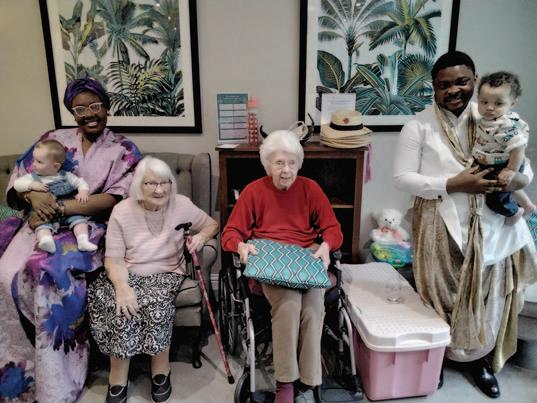
grounds that make up their community.
“This was more than just a celebration – it was an opportunity to bridge generations and cultures in our care home family,” said Joanna Mosses, General Manager. “Seeing our residents light up as they shared their own cultural experiences while learning about others was truly special.”
The World Day for Cultural Diversity for Dialogue and Development, often known as Diversity Day, is observed annually by the United Nations to promote understanding between different cultures and highlight the value of cultural diversity in fostering dialogue and development.
The event reinforced Claremont Parkway’s commitment to creating an inclusive environment where every resident’s background is valued and celebrated, while building stronger bonds between the care home and the wider community.
Age UK is publishing a new short, accessible Myth Busters resource for older people and their families, and for professionals too, to help people understand that assisted dying and end of life advance care planning are two totally separate things.
The Charity is taking this step after becoming concerned that anunintended consequence of the Parliamentary and public debate about assisted dying is that some people are being put off from engaging in end-of-life advance care planning.
The Charity has heard from some older people who are now hesitant to engage in conversations with loved ones and healthcare professionals about what they wish for their health and care when they approach the end of their life – which may be soon or a long way off – fearing that these discussions are a ruse to persuade them to seek an assisted death, something which some people mistakenly believe is already legal in this country.
A Private Members Bill to legalise assisted dying, for some people under certain circumstances, is currently making its passage through Parliament. Even if the Bill successfully passes all its stages, it will not become law until next year at the earliest, and then there will need to be a period of consideration to work out how it should be implemented. The upshot is that for now assisted dying remains illegal and
unavailable in this country and it is not expected to become legal and operational here until 2029, if then.
To help the public to navigate this period Age UK has produced a set of Assisted Dying Myth Busters.
During the pandemic there were situations where some people felt forced into decisions that were being added to their health records, (like do not administer cardiopulmonary resuscitation orders, commonly known as DNR orders), without understanding what that meant, or even against their will. It is completely understandable that this bad practice has worried people.
This is another reason though why having an Advance Care Planning conversation can be helpful, because it can help you make informed decisions and talk through any questions that you may have.
Caroline Abrahams, Charity Director at Age UK said: “Advance Care Planning is a valuable, very individual process. It’s about giving all of us the opportunity to think about and record our preferences for our care towards the end of life. These conversations help ensure that our individual wishes are respected and understood, especially if we become so unwell that we are no longer able to communicate them when the time comes.”
“Advance Care Planning includes discussing and docu-
On Wednesday, 28th May, staff from Avante Care & Support marked a significant milestone in the development of their new care home in West Malling.
A special launch event was held at the care home site on Lucks Hill Road, West Malling, attended by Avante staff, trustees, and members of the local community.

Guests were first welcomed at More Park Catholic Primary School, located opposite the site, where they enjoyed a refreshing selection of smoothies and non-alcoholic cocktails, courtesy of Nick from Katie’s Fizz Shack.
From there, guests made their way across to the construction site to observe the building progress and hear Chris Francis, Director of Property and Development, speak about the vision, ambition, and future plans for the home.
Andrew Ireland, Chair of Trustees, followed thanking everyone for their support and involvement in the project.
He reflected on the importance of the new home to the local community and the exciting journey ahead as the development continues.
The new care home is scheduled to open in summer 2026.
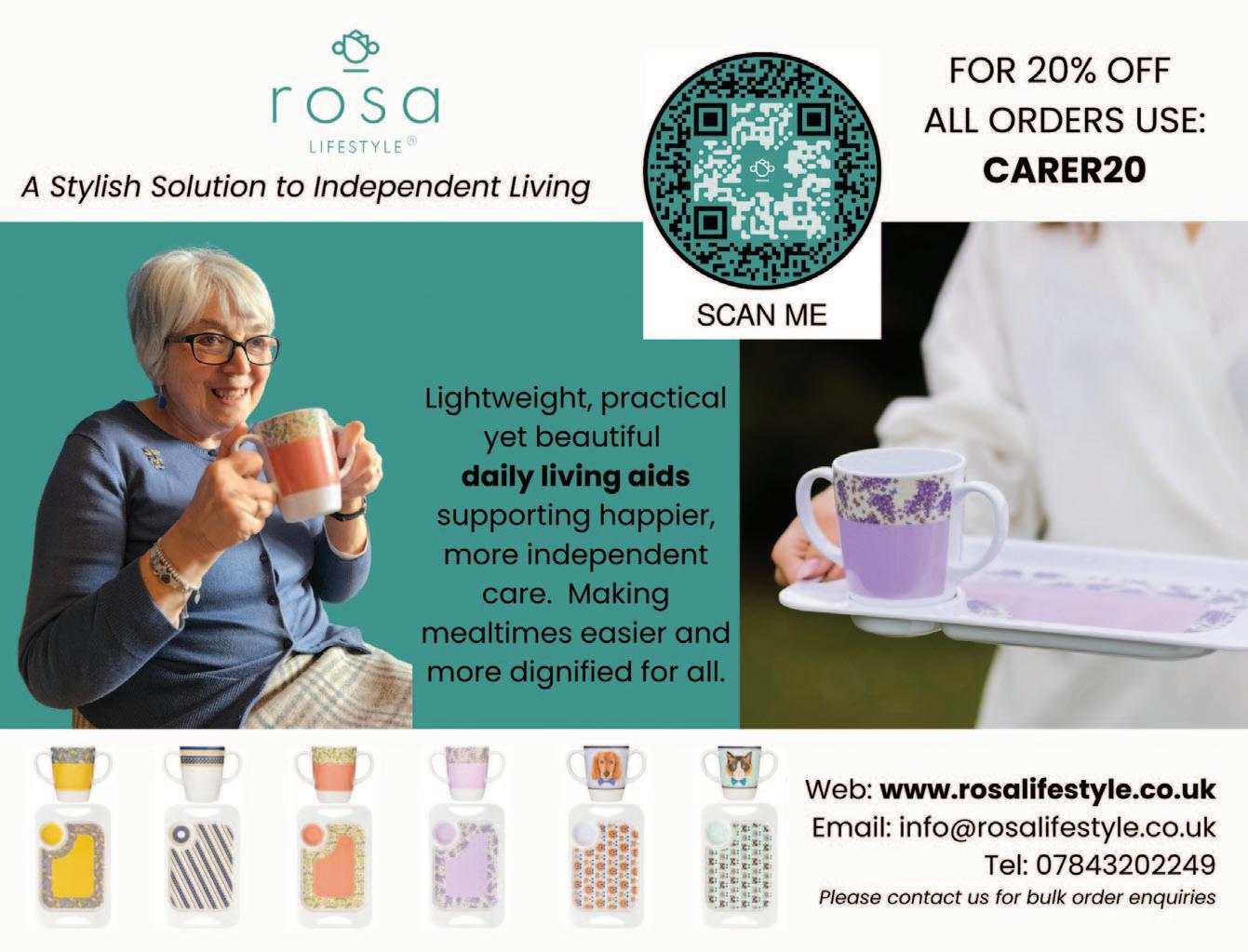
menting where a person would like to receive care, the treatments they would or would not want, and who they trust to make decisions on their behalf, if that becomes necessary. We are encouraging older people not to be deterred from having these conversations by the ongoing debate around assisted dying, which remains illegal in England.”
“That’s why we have published a new resource outlining the facts about Advance Care Planning and its benefits, and a set of Myth busters so that people understand it’s nothing to do with assisted dying.”
“It would be a real shame if unfounded confusion with assisted dying stopped people from making their wishes known. We want everyone to feel confident to have end of life advance planning conversations when the time is right for them, regardless of the progress of the Bill and whether assisted dying becomes legal and operational in this country in future, or not.”

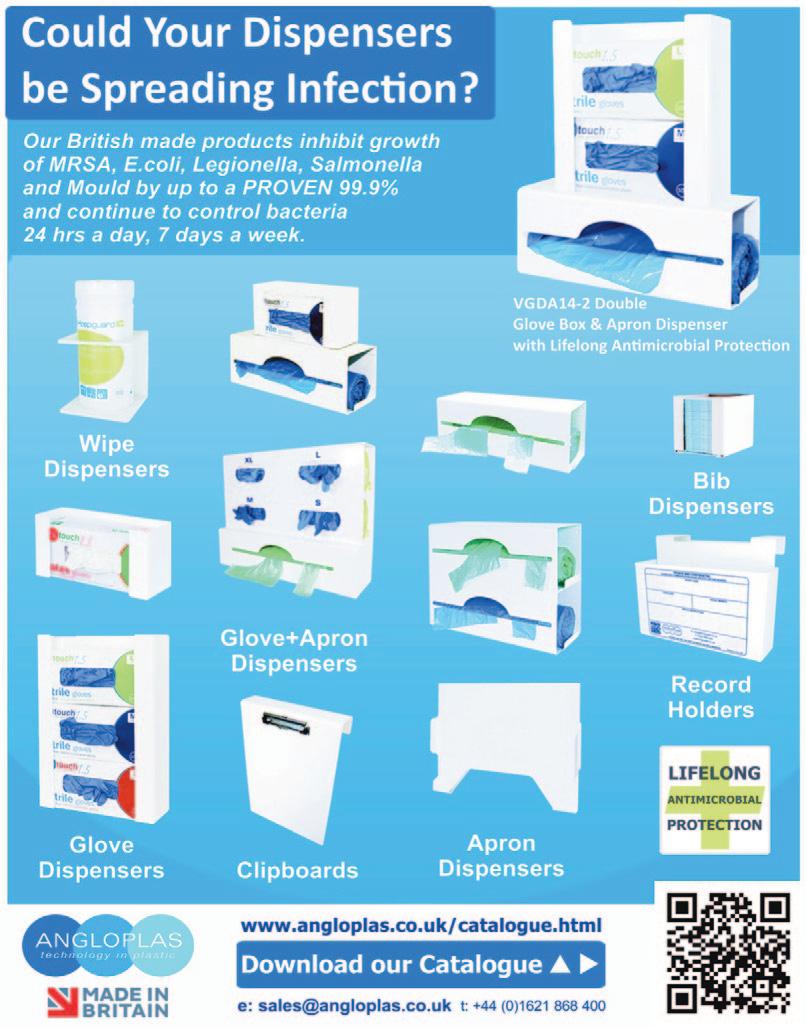

As Carers Week 2025 (9th – 15th June) shines a national spotlight on the dedication of unpaid carers, Lilian Faithfull Care is calling for greater awareness of the mental health challenges they face and offers practical support to help carers protect their own wellbeing.
Across the UK, an estimated 5.8 million people are providing unpaid care for a loved one who is older, disabled or ill. Despite contributing an estimated £184 billion to the UK economy each year, many carers feel undervalued and unsupported. While their role is often described as a “labour of love”, the emotional and physical toll it takes is immense. According to Carers UK 2025 report, over a third of carers (35%) said their mental health was bad or very bad, an increase from 2024 (27%).
“Unpaid carers are the invisible backbone of our health and social care system,” says Kevin Snowball, CEO of Lilian Faithfull Care. “They give so much of themselves, often at the expense of their own mental health. Carers Week is the perfect time to remind them that their wellbeing matters too. We’re here to offer reassurance, practical support, and respite when they need a break.”
MENTAL HEALTH TIPS FOR UNPAID CARERS:
Lilian Faithfull Care is sharing five key tips that unpaid carers can use to protect their mental health:
• Practice “micro moments” of self-care - You may not have time for an hour-long break, but even a five-
minute ritual, for example, a cup of tea in the garden, a favourite song, or a deep-breathing exercise can offer a vital emotional reset.
• Use journaling as an emotional outlet - Keeping a short, private journal can help process the ups and downs of caregiving. It doesn't have to be daily, just jotting down thoughts once or twice a week can reduce stress and bring clarity.
• Talk to someone – Sharing your experiences with a friend, support group or counsellor can ease stress and reduce feelings of isolation.
• Set realistic boundaries – It’s okay to say no and to ask for help when you need it.
• Keep up with your GP – Your own health matters. Regular check-ins with your doctor can prevent small issues from becoming big ones.
Seek respite or adult day care support – Temporary care for your loved one can give you time to recharge without guilt.
HELP IS AT HAND
As a charity dedicated to care, Lilian Faithfull Care offers respite stays at its homes in Gloucestershire and adult day care at its Secret Garden Hubs in Cheltenham and Prestbury, giving unpaid carers peace of mind while they take time to rest, recover, or attend to other life responsibilities. “Even a few days of respite can make a huge difference,” Kevin adds. “We work closely with families to ensure their loved ones feel safe, supported, and part of our wider care family while they’re with us.”
Carers are encouraged to reach out to Lilian Faithfull Care if they are exploring options for short-term support. No one should feel they have to do it all alone.
Visit www.lilianfaithfull.co.uk
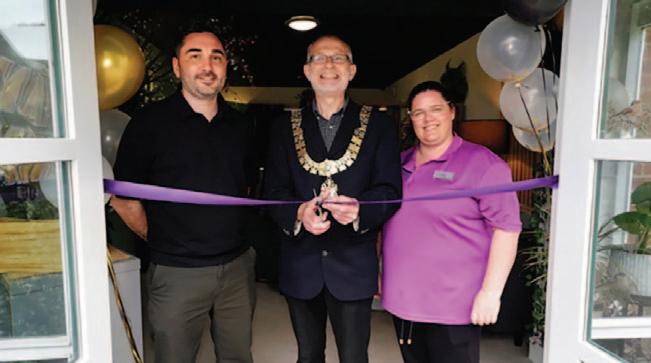
Anchor’s The Firs care home in Felixstowe is celebrating the opening of its new Namaste Room, a multisensory room to enhance the wellbeing of residents, including those living with dementia.
Made possible through the efforts of colleagues, residents, their loved ones and the local community, the Namaste Room will offer a holistic approach to care that supports the behavioural and psychological symptoms of dementia.
Dr Nicholas Neill, who is resident GP at The Firs and GP at Haven Health in Felixstowe, which is run by Suffolk Primary Care, was inspired to create the Namaste Room at The Firs care home, during his participation in the Health Education England Trailblazer Fellowship. This was after learning about similar person-centred approaches to care, called Namaste Care, taken by the Alzheimer’s Society. The initiative has been brought to life through the dedication of the care home and the local community. The Firs Catering Assistant Zeta and Team Leader Nicky took a hands-on approach, planning, preparing and decorating, whilst R.P. Plastering Services re-plastered the walls. In addition to this, family members helped fit carpets. Fundraising efforts and very generous donations have played a vital role in supporting the project. Local florist Susan’s Flowers helped to create the floral display, while Iain, a son of The Firs’
oldest resident Pat helped with painting and general DIY work.
The opening event, officiated by the Mayor of Felixstowe, was a joyful celebration of teamwork with residents, colleagues, district nurses and the volunteers who helped create the Namaste Room. The occasion was marked with a performance from local band Shane’s Rock and Roll Show.
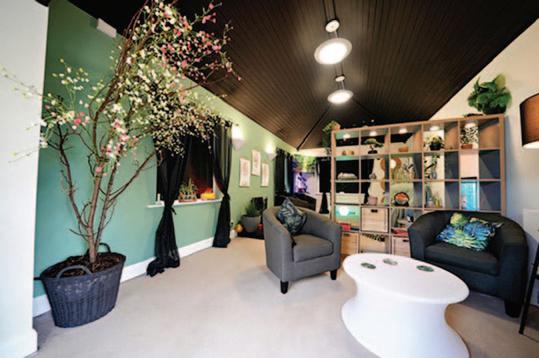
Nicky, Team Leader at Anchor’s The Firs care home, says: “Opening a dedicated wellbeing space for our residents has been incredibly rewarding. The Namaste Room has brought together people from across The Firs and our community, and it’s been a transformative space for our residents. We look forward to seeing how it will continue to support and enrich the lives of our residents and their loved ones.”
Dr Neill, resident GP at The Firs, says: “With many residents at The Firs care home living with dementia we were keen to find a way to make activities and support even more comprehensive. We were inspired by Namaste Care due to the strong evidence that it can reduce the reliance on medication for managing the symptoms of individuals with dementia.”
This has been an energising and inspiring project, and we can’t thank everyone enough for their hard work and support.”

Residents of Fleetwood Hall Care Home in Fleetwood, part of Sandstone Care Group, enjoyed a cheerful morning thanks to the arrival of two charming, four-legged friends.
The residents were visited by miniature Shetland ponies Caramel and William from Simply Shetlands. The residents and staff formed a connection with both of the beautiful ponies and showered them with affection, carrots, grass, and water .
Local school pupils also joined in to enjoy a hands-on experience with the ponies.
Resident Kathlean, 89, said: “It was lovely to see the local school children that brought a delight to the experience.”
The ponies didn’t just socialise in the lounge; they also took
to the corridors and visited residents in their rooms meaning everyone had the opportunity to get involved.
The activities team at Fleetwood Hall, said: “The day was a delight for everyone ,we are so grateful for the visit. We saw so many smiles. It was lovely to watch the residents and staff sharing this memorable experience together.”
76-year-old resident Sue, said: “I petted William a miniature pony, it made me so happy.”
89-year-old resident Barbara said: “What a lovely experience in a lovely friendly home.’
90-year-old Vera added: “It was such a delightful experience and made me feel so happy meeting the ponies.”
There are more potential new medicines being tested for Alzheimer’s disease, according to an annual review published today, which reports that 138 drugs are currently being tested – an increase of nearly 9% from last year.
Drugs that could potentially help people in all stages of Alzheimer’s are being tested, from those in people showing no symptoms to those in later stages and with severe disease.
Experts are hopeful that the wide range of drugs now being tested will lead to safer and more effective medicines. This builds on recent progress with lecanemab and donanemab, which are the first treatments to slow down the progression of Alzheimer’s.
Further advances in drug development could lead to new treatment approaches – such as oral therapies or injections – that could be taken at home rather than in hospital, making treatment less disruptive for people and families living with dementia.
“This latest report shows us that there is hope on the horizon for people with Alzheimer’s after lecanemab and donanemab,” says Dr Sheona Scales, Director of Research at Alzheimer’s Research UK. “But we must go further as progress is not fast enough for the millions of people affected by dementia in the UK who have no treatments to stop this heart-breaking condition.”
The number of drugs entering early-stage clinical trials has jumped from 27 last year to 48 this year. These are looking at a wide range of approaches, including vaccines and engineered immune cells.
Most of the drugs target the underlying disease and are designed to slow the decline of memory loss rather than just treat the symptoms. This could ultimately help people to live independently for longer.
“There are more diverse experimental medicines than ever in the current pipeline targeting different pro-
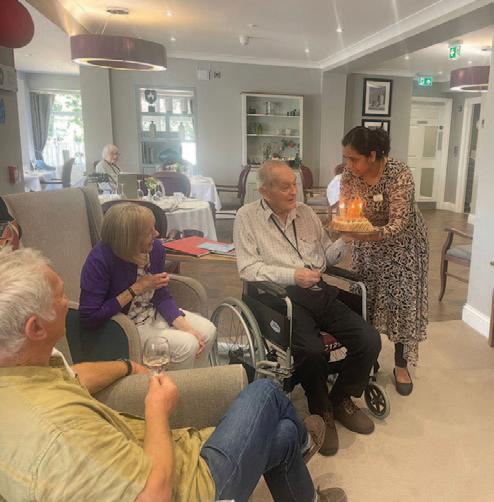
cesses,” says Prof Emma Mead, Chief Scientific Officer at the Alzheimer’s Research UK Oxford Drug Discovery Institute. “There’s an incredible range of drugs being tested to treat Alzheimer’s across the world, and I am hopeful we have the building blocks for a future where there will be a cure for this devastating disease.”
There are currently 182 clinical trials globally. Of these, over 40 are middle and late-stage trials that could publish their results this year. These include medicines that are already approved to treat other conditions and which are now being tested for Alzheimer’s.
One large trial is testing a pill form of semaglutide as a potential treatment for people with early Alzheimer’s. This drug is currently being used as an injection to manage type 2 diabetes and help with weight loss. Early research suggests that semaglutide could reduce inflammation in the brain, which can cause a cascade of damage that leads to Alzheimer’s disease and vascular dementia.
One of the major barriers to progress in developing new drugs is recruitment onto trials: globally more than 50,000 people are needed to populate all the current Alzheimer’s trials.
“Compared with the rest of the world, the UK is way behind in the delivery of clinical trials, meaning people here are missing out on potentially life-changing treatments,” says Dr Scales.
In the UK, it is estimated that over 10,000 more people could benefit from participating in clinical trials for dementia, if the UK enrolled people onto trials at a comparable rate to the rest of the world.
“Diagnosing people within the NHS needs to be faster and more accurate so we can match people with Alzheimer’s to the right trials where they can benefit from the latest treatments being tested.”
Jean and Reg, residents at Edingley Lodge care home, both celebrated reaching their 93rd and 101st Birthday on the same day on May 20th
The home held a combined birthday party for the two lovely residents and there was plenty of birthday cake and presents in honour of their joint birthdays.
Reg at Edingley Lodge care home was kindly visited by a local rugby team to celebrate his birthday. Reg has always had a deep love for the sport, having played for many years, so the staff at Edingley Lodge knew this would mean a lot to him.
General Manager at Edingley Lodge care home, said: “It is wonderful to be able to celebrate this occasion with these residents who love life and enjoy having fun.”


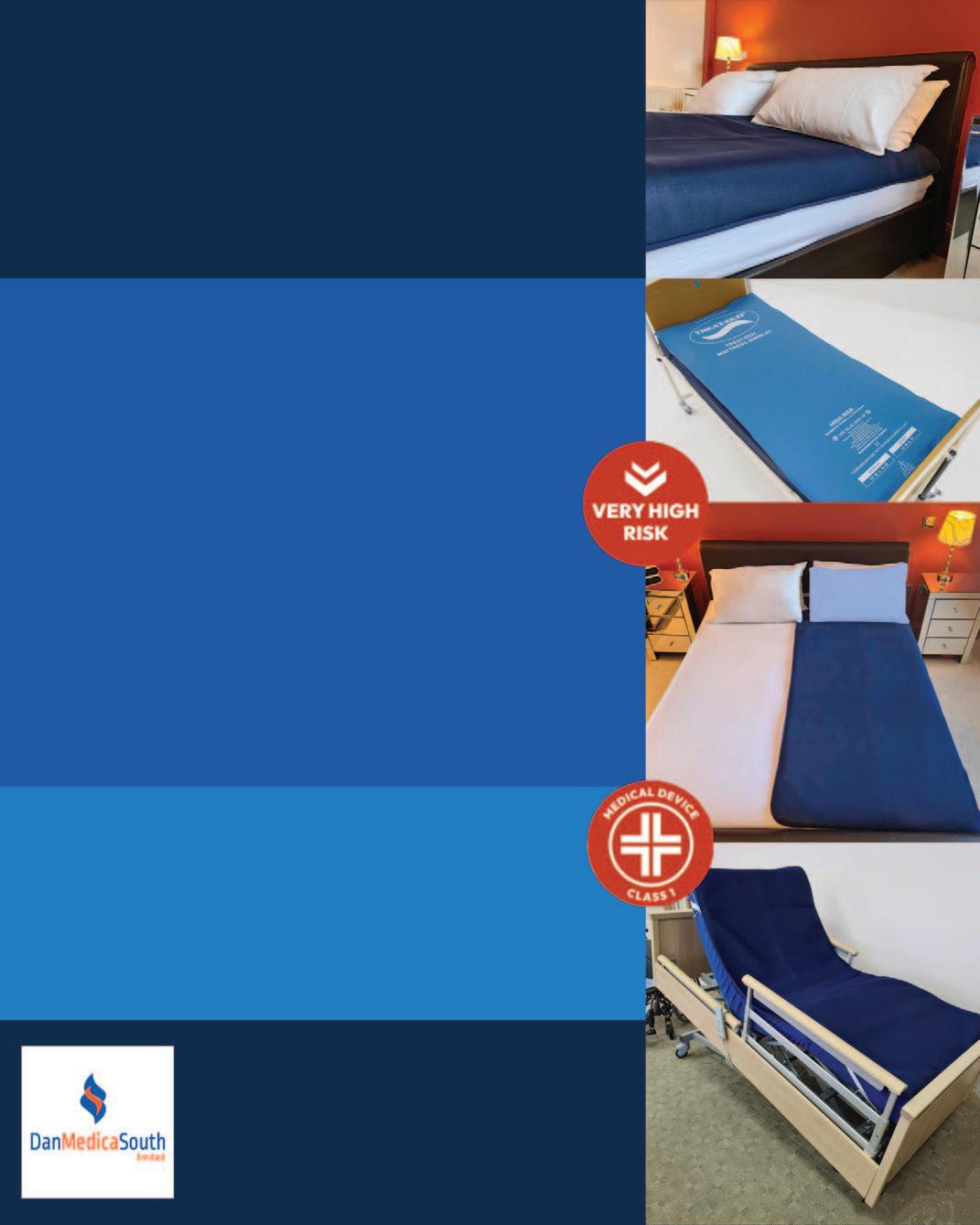

Intergenerational living isn’t new, it’s how communities have functioned for centuries. Families once lived with grandparents, children, and extended relatives under one roof or within walking distance. But in today’s age-segregated society that kind of proximity and shared experience is increasingly rare. We’ve built lives around separation, and the consequences are showing. Loneliness, social fragmentation, and misunderstanding between age groups are major issues we are facing. Designing for intergenerational living offers a compelling response. It is about creating homes, neighbourhoods, and care environments where people of different ages can live not just side by side, but with meaningful opportunities to interact, support, and learn from each other.
The case for intergenerational design is rooted in mutual benefit. For older adults, daily contact with younger people can reduce isolation, boost mental wellbeing, and slow cognitive decline. For children and young adults, exposure to older generations builds empathy, reduces prejudice, and supports emotional development. At a time when both young and old are disproportionately affected by mental health challenges, the value of everyday social contact cannot be overstated.
Yet current housing models often entrench separation. Student housing, retirement developments, and single-use residential schemes often cater to narrow life stages and can isolate their residents from the wider community. While these models serve important practical functions (such as affordability, or specialist care, for example) they can reinforce loneliness and limit spontaneous social exchange. In contrast, intergenerational schemes foster the kind of informal support systems that make communities resilient: a teenager teaching
a grandparent how to use a smartphone, a retired neighbour watching children after school, or different generations tending a shared garden. These exchanges are small, but their impact is large.
Interest in intergenerational living is growing, particularly in the care and senior living sectors. There’s an increasing desire to shift from institutional models to community-based ones where older adults are visible, active members of the neighbourhood, not hidden behind fences or walls.
This shift is also visible in planning and development. Sites close to schools, nurseries, and community infrastructure are now being prioritised for housing aimed at older people. Developers are exploring tenure-blind models, where housing types are mixed and amenities are shared, such as cafés, fitness spaces, and communal lounges accessible to all, regardless of age or life stage.
The design response has become more ambitious. High-density, mixed-use urban sites now offer opportunities to layer different forms of housing such as general needs, co-living, senior living, and student accommodation, within a single neighbourhood. These integrated models can accommodate evolving needs, family structures, and care responsibilities over time.
Despite growing interest, intergenerational living faces some persistent challenges. A common misconception is that older adults won’t want regular contact with younger people, or vice versa. But in reality, most residents want the choice. Good design should provide that choice, offering a mix of private, semi-private, and shared spaces. Think of quiet garden areas, flexible lounges, or outward-facing front doors that encourage neighbourly interaction without obliging it.
Another barrier is the perception that senior housing isn’t suitable for younger people. Yet the very features that make such environments accessible and safe can make them ideal for families, children, or young adults with specific needs. The key is to challenge stigma and replace institutional aesthetics with welcoming, inclusive design.
Infection control, understandably heightened by the pandemic, also needs to be addressed. But with considered zoning, good ventilation, modular guest spaces, and outdoor-focused activity areas, health concerns can be managed without cutting off social connection.
A further challenge lies in planning and regulation. Age-limited
By Holly Sissons, Associate Director at Corstorphine & Wright (www.corstorphine-wright.com)
schemes can unintentionally exclude younger family members, carers, or visitors. More flexible classifications and tenure options (such as larger units with shared facilities or multigenerational homes with annexes) would unlock greater potential for age-inclusive communities.
Some of the most effective intergenerational design emerges not from top-down briefs but from local needs. Community-led housing, neighbourhood planning, and co-design initiatives often highlight the importance of shared spaces, adaptability, and interdependence. These voices can and should shape how we design for ageing and youth alike.
Design precedents elsewhere point the way forward. For example, in some new communities, homes have been designed with independent annexes that flex to suit changing household dynamics, whether that’s a teenager moving back home, a grandparent needing nearby support, or a home-based carer. By planning for adaptability from the start, such schemes accommodate life as it happens.
WHAT’S NEXT?
To make intergenerational living a standard, not an exception, we need strategic alignment. That means updating planning policy to encourage age-inclusive design - setting clear targets for accessible housing, funding home adaptations, and embedding intergenerational principles in local plans.
It also means reshaping the narrative around ageing. Rather than seeing older adults as recipients of care, we should recognise their role as mentors, caregivers, and contributors. Intergenerational living reflects this shift, not as a burden-sharing model, but as one of mutual enrichment.
And finally, we need to build homes that reflect how people actually live. The traditional nuclear family is no longer the norm. Many households today are blended, extended, or otherwise non-standard. Designing homes and neighbourhoods with flexibility at their core will serve everyone, regardless of their age.
At its heart, designing for intergenerational living is about dignity, connection, and sustainability. It’s about places that evolve with people and bring generations together, not apart. In a time of increasing social isolation and division, this approach offers something rare and essential: a blueprint for belonging at every stage of life.
Holmer Court Home in Hereford has received an incredible donation of £1,600 from The Hereford Welsh Club, thanks to the club’s tireless fundraising efforts over the past year. The club’s committee members, staff, and members have been busy raising funds for local charities, supporting causes that matter to the community.
Through a variety of fundraising activities, including an impressive ten-hour dance-a-thon, the club managed to raise:
• £675 for Cats Protection
• £1,600 for Holmer Court Home
• £1,600 for Hereford Dementia Café
One of the club’s dedicated members, Mandy, who is the granddaughter of a former Holmer Court resident, nominated the home to receive some of the funds raised.
Mandy shared: “You’re very welcome. Your home was very good to

my Nan, and also the support you gave me as well will never be forgotten.”
Holmer Court’s Home Manager, Claire Boulter, expressed her gratitude: “It’s heart-warming to see the community come together like this. The Hereford Welsh Club has shown such incredible spirit and dedication, and we’re beyond thankful for everything they’ve done for us and our residents.”
Wellbeing Coordinator, Becky Webber, added: “It was such a fantastic evening. We’re so grateful for the club’s generosity and can’t wait to welcome them to Holmer Court. Their support means we can do even more for our residents, making their lives brighter and more fulfilling.”
The Hereford Welsh Club has also agreed to visit Holmer Court for a sing and dance session with the residents—giving everyone the chance to thank them personally for their kindness.
The pobroll® is the invention of Pat O’Brien, a physiotherapist, Moving and Handling trainer, and Conflict Management tutor with over two decades of experience in care homes and nursing homes
Care home managers often face challenges in delivering intimate care while balancing efficiency and managing costs, particularly when these essential tasks provoke behaviours that can be challenging to safely manage. Traditional methods—especially for bed-bound residents—often lead to lengthy processes and frequent linen changes, driving up costs and consuming valuable staff time. The pobroll® provides a transformative solution that supports dignified care, achieves significant cost savings, and reduces the need for additional staffing.
The pobroll® is an innovative bed-bathing wrap specifically designed to enhance comfort and dignity during personal washing for individuals who require in-bed care. Centred on the resident’s experience, it minimizes distress by providing sensory comfort. Crafted with two layers of high-quality cotton-terry toweling and a waterproof layer in between, it delivers a soothing, calming experience while keeping the bed completely dry. Sized for a standard single bed, the pobroll®’s dual-layer design offers warmth and a sense of security and privacy, allowing residents to maintain comfort and dignity during bed-based bathing routines.
BOOSTING COST SAVINGS AND OPERATIONAL EFFICIENCY
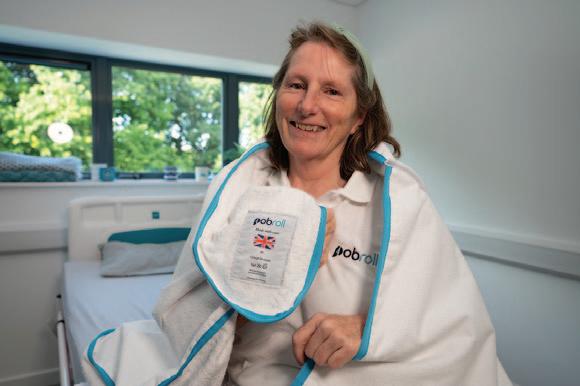
pobroll® provides an effective solution that supports both economic and environmental goals.
Managing resident agitation—particularly for those with dementia—often requires specialised training in restraint techniques. The pobroll® significantly reduces the need for physical intervention by providing a warm, secure covering that alleviates resident distress. This gentle approach minimizes aggressive or defensive reactions, reducing the number of staff needed for these interactions. As a result, facilities can potentially lower staffing levels without compromising care quality, yielding substantial cost savings. Additionally, reduced dependence on physical intervention decreases training costs associated with restraint techniques. By simplifying the process of intimate care, the pobroll® reduces the need for specialised training, making onboarding smoother and lowering turnover-related training expenses.
The pobroll® supports compliance with restraint reduction guidelines, helping facilities minimise documentation burdens and regulatory liabilities linked to physical interventions. This non-invasive solution improves safety for both residents and caregivers, fostering a culture of dignity and respect that boosts satisfaction among residents and their families.
CONCLUSION: A VALUABLE ASSET FOR QUALITY CARE AND COST MANAGEMENT
The pobroll®'s waterproof design enables caregivers to provide a complete wet wash without the risk of soaking the bed, minimising the need for frequent linen changes. This leads to fewer laundry loads, reducing labour and utility costs, as well as wear on linens. By reducing logistical tasks, caregivers have more time to focus on direct resident care, enhancing productivity overall. Additionally, reduced reliance on disposable wipes results in further cost savings and supports environmentally sustainable practices. With its durable, reusable design, the pobroll® maintains hygiene standards and allows for extended use across multiple residents. As care homes face increased pressure to adopt sustainable practices, the
For care homes, the pobroll® represents a strategic investment, offering measurable savings by reducing reliance on disposable products, lowering laundry and training costs, and enabling efficient staffing. Most importantly, it prioritises resident dignity and comfort, setting a high standard for compassionate, personcentred care. For facilities seeking to enhance financial performance and care quality, the pobroll® is an invaluable addition to their resources. For further information, see the advert on page 5 or visit www.pobroll.co.uk
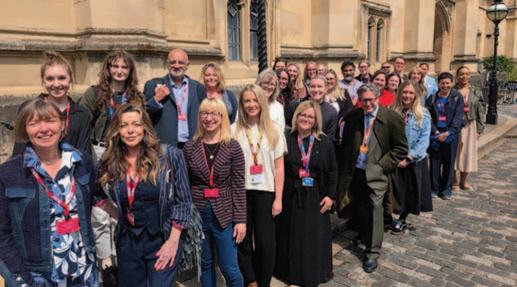
A landmark roundtable discussion, led by Cygnet and hosted by Lord Patel of Bradford, brought together leading voices from across health, social care and the third sector at the Palace of Westminster on Wednesday 21 May, to tackle the pressing issue of domestic abuse.
The event formed part of Cygnet’s ongoing Domestic Abuse Quality Improvement (QI) project, aimed at enhancing how domestic abuse is recognised and addressed by staff, both for service users and within the workforce.
Chaired by Phil Winterbottom, Cygnet’s Head of Safeguarding and Protection, the discussion opened with keynote contributions from Dame Nicole Jacobs, Domestic Abuse Commissioner for England and Wales, and Susan Bright, CEO of the Employers Initiative on Domestic Abuse (EIDA).
Dame Nicole Jacobs said: “We are not nearly where we need to be in our health response to domestic abuse. I am really thankful to Cygnet for bringing us all together, it’s important to have people with different experiences and perspectives to help build on what’s already happening. We have a shared endeavour to bring the best information to the fore.”
The event brought together organisations including the Royal Colleges of Nursing, Psychiatry, and GPs, NHS England, Kings College London, Standing Together Against Domestic Abuse, Mankind Initiative, and the Social Care Institute for Excellence, among others. Their collective aim was to identify the gold standard for domestic abuse response, address existing challenges, and share
learning for national dissemination.
Lord Patel, Non-Executive Director at Cygnet, emphasised the importance of the discussion. He said: “Today is an opportunity for some really meaningful and productive discussions. Hosting this roundtable in the House of Lords reflects the gravity of the issue. It is a place of responsibility and there is no issue more deserving of our energy and collective commitment for how we as a society identify and respond to domestic abuse.“With 12.6 million adults having experienced abusive behaviours, we must ask the difficult questions and confront the gaps in our systems. Today is about aligning our efforts toward real change.”
Susan Bright highlighted the alignment between EIDA’s mission and Cygnet’s initiative. She said: “It is a real pleasure to be here today to hear the discussions that will take place on this imperative issue. Our vision is very aligned to what Cygnet is trying to achieve; we want every employer in the UK to take action on domestic abuse. It’s about raising awareness, creating tools to help employers to support their people impacted by domestic abuse and bringing businesses together to share learnings.”
Discussion topics included improving staff training, the role of HR mechanisms in responding to domestic abuse impacting employees, and systemic changes needed both internally and nationally to strengthen responses.
Reflecting on the discussions, Phil said: “It is vital we highlight the importance of this issue and come together to learn from one another.”
“Domestic abuse can impact anyone – service users, colleagues, carers – and the consequences can be profound and long-lasting. Today’s discussion allowed us to look honestly at how we currently respond, where the gaps lie, and what gold-standard practice could look like. Whether it’s small ideas, big ideas or systemic change, these moments of collaboration, especially when grounded in lived experience, can inspire the kind of meaningful progress that truly changes lives.”
“It is our responsibility as care providers to create environments where safety, understanding and support are embedded into everything we do.”



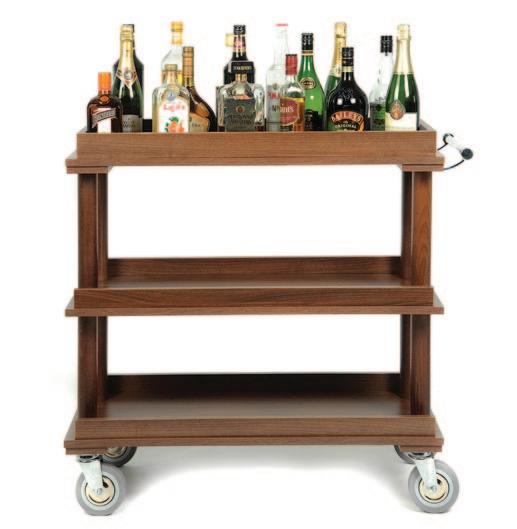
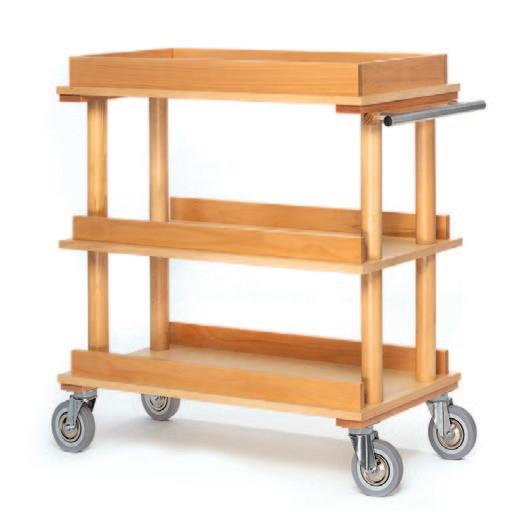
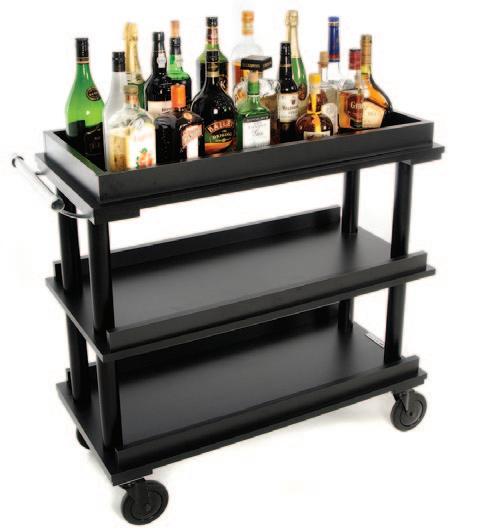
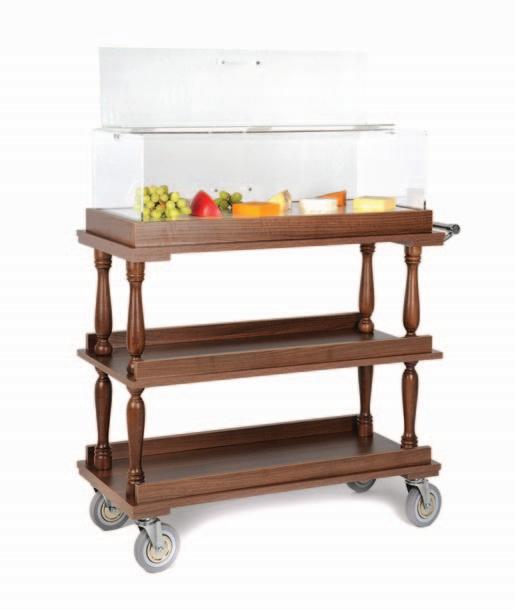

A woman with a passion for care and improving the wellbeing of carers has reflected on the importance of carers in health and social care.
Beata Bikowska is a Safeguarding, Wellbeing and Carers Lead at Cygnet Hospital Godden Green.
Located in Kent Weald, Cygnet Hospital Godden Green is a 33-bed hospital providing specialist acute and PICU services for women, run by Cygnet Health Care.
Beata joined Cygnet Group in 2023 after realising how the leading health and social care provider’s values of prioritising carer involvement, emotional wellbeing and safeguarding aligned closely with her own similar values.
She said: “I knew I was stepping into an organisation with a strong sense of purpose, a commitment not only to clinical excellence but also to human connection, compassion, and collaboration. My position as a Safeguarding, Wellbeing and Carers Lead allows me to work at the intersection of patient care, staff support, and carer engagement, areas that are often seen as separate but are deeply interconnected.
“Mental health recovery does not happen in isolation. It is a shared journey that depends on a network of support, empathy and trust. At the heart of that network are not only mental health professionals and support staff, but also carers - the parents, siblings, partners, and friends who walk alongside someone through the most difficult periods of their lives.”
In her role, Beata has also tried to raise awareness of what a carer actually is, beyond the clinical-sounding label.
She said: “To me, carers are often the people holding things together when systems fall short. They are the ones advocating for loved ones in the darkest moments, keeping track of medications, noticing the small changes others miss, and offering comfort when no one else is around.
“They do this not because they are paid to, but because they care. But behind that description are people with real names, real emotions, and real burdens.
“Some are parents who've watched their child disappear under the weight of depression. Some are partners navigating relationships altered by psychosis, addiction or trauma. Some are siblings who’ve had to grow up too fast. And some are friends who refuse to walk away even when it would be easier to.
“Each story is different, but they share a common thread: dedication, often at great personal cost. Carers are not “extras” in the story of recovery. They are essential partners.”
For Cygnet’s Carers Week, which starts on 9 June, Beata also reflected on the importance of carers’ wellbeing.
The Kent-based worker said: “I think for carers, wellbeing means not being forgotten. It means knowing who to contact. Being updated when things change. Being asked for your view. Having a space to cry, rage, laugh, or just breathe without judgement. It means recognising that many carers have their own experiences of mental ill health, trauma, or loss. They need support too, not because they are weak, but because they have been strong for too long without help.
“At Cygnet, we are working hard to ensure carers are not just acknowledged but actively included and involved in our services. This work is rooted in our Carer Support and Involvement Programme, which has evolved in direct response to carer feedback.”
Cygnet Health Care has a variety of ways that carers can get involved but also receive support, such as regular carer forums, meaningful involvement in care planning as well as a constant recognition and celebration of carers. The role of Carer Leads also provides carers with constant access to dedicated people who act as their point of contact.
Beata highlighted the importance of her role and connecting with carers: “Mental health recovery is not just about diagnosis, medication, or even therapy. It’s about connection. About the relationships that hold us through darkness and walk beside us toward light.
“Carers are a critical part of that journey. We owe them not just our thanks, but our collaboration. To every carer reading this: you matter. Your voice matters. Your wellbeing matters. And Cygnet sees you.”
Beata also reflected on different ways to work better with carers and provided her thoughts.
She said, “My ten top tips are:
• Introduce yourself clearly and ask who they are, not just who they’re with.
• Be open and honest, don’t sugar-coat or avoid difficult conversations.
• Ask for their insight — they often know more than they think.
• Check in regularly, not just when there’s a crisis.
• Respect boundaries, both theirs and the service users.
• Provide tailored information, not just generic leaflets.
• Acknowledge their feelings, especially guilt, fear, or grief.
• Involve them in planning, not just in emergencies.
• Encourage self-care and offer signposting to support services.
• Say thank you, often and sincerely.”
Best friends Phoebe Hastings and Ross Tanner have completed an incredible journey across New Zealand, raising money for St Peter’s Hospice in memory of Phoebe’s father.
The duo began their epic trek on 16th November 2024, tackling the Te Araroa Trail, a 3,000km route stretching the entire length of New Zealand, from Cape Reinga in the north to Bluff in the south. They had originally planned to finish the 1800-mile challenge by 6th April 2025, but Phoebe, 26, and Ross, 25, arrived at the finish line ahead of schedule, celebrating their final steps in early April.
The challenge was undertaken in honour of Phoebe’s dad, Chris, who passed away, aged 63, in July 2023.
“St Peter’s Hospice provided such incredible support to my family during one of the most difficult times in our lives,” said Phoebe. “Dad was ill for about a year before he died and was supported by the Hospice team at home, before being cared for at the in-patient unit in his last few weeks.

“His care at the Hospice was incredible. Even though my dad was really sick at that point, the doctors and nurses, especially, really got to know his personality and understood him as a person. This just goes to
show the kindness and care that the staff show towards all their patients.”
The friends initially set out to raise £1,000 for Bristol’s only adult Hospice, but have already raised over £3,000 through their JustGiving page. With donations still coming in, the new target is £4,000, and the fundraising page will remain open until 24 June. Now the pair are encouraging others to take on a bucket list challenge in aid of the Hospice.
Ross said: “Phoebe and I met at university in Glasgow and have shared a love of the outdoors ever since. This was one of the hardest but most rewarding things we’ve ever done and knowing it’s for such an important cause kept us going every step of the way.
“Anyone who has a bucket list idea of something they’d like to achieve should go for it now whether that be a skydive, a bespoke challenge you organise yourself or signing up to one of the Hospice’s challenges like the upcoming Cambodia Trek.
“You will make memories to last a lifetime, you’ll test yourself and achieve something really special. Being able to do it for a cause like St Peter’s Hospice is an added bonus.”
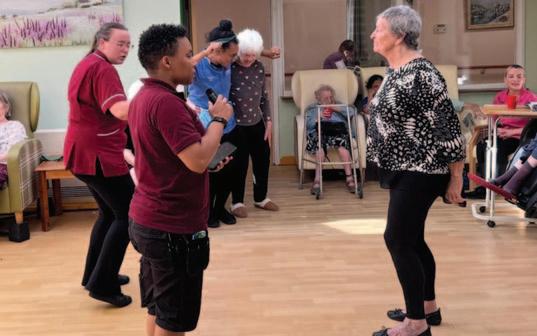
Traditional music from Portugal struck a chord with residents at Avalon Nursing Home in Bridgwater. It was part of a day of celebration of Portuguese culture at the home in Somerset which cares for residents with dementia led by activities co-ordinator Lisandra Costa.
Lisandra who grew up in Portugal treated residents to her rendition of classic typical Portuguese songs known as Fado before getting involved in a lively karaoke session and dancing.
Food was at the heart of the celebration with Lisandra, her mother and sister preparing typical Portuguese dishes, including Bacalhau com natas (cod fish with cream), cozido à portuguesa (a Portuguese stew) and pastel de nata (egg tarts).
“It was such a joy to bring a slice of home to work,” said Lisandra. “Seeing everyone enjoy the food and the music and join in with the dancing was really special.
“It felt like my family and work came together.”
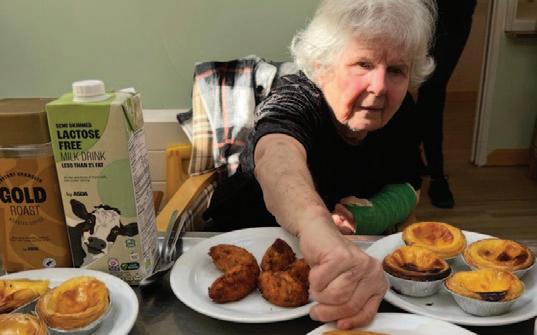

We offer high-quality residential, nursing, dementia and respite care in a welcoming and engaging environment. Arrange a visit to discover comfort, companionship, and expert care. Find your
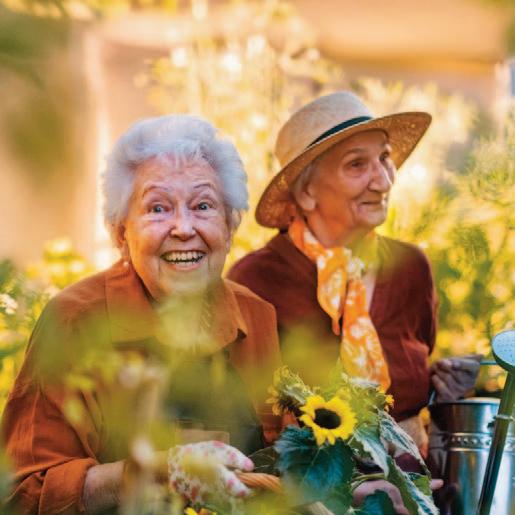
By Adrian Silaghi,

As the care sector continues to evolve, catering services have become an important pillar— not just in meeting nutritional needs, but in supporting dignity, independence and social well-being. At the heart of person-centred care, catering now emphasises personalisation, safety, sustainability and smart technology.
There is growing recognition that catering should be fully integrated with care and clinical services.
Close collaboration between catering, care and nursing teams ensures residents remain central to all decisions, with nutritional care given equal priority to physical care.
Tailored nutrition is key to enhancing health, autonomy and daily enjoyment. Meanwhile, environmentally and socially sustainable practices – such as reducing waste, sourcing locally and embracing greener technologies – allow care homes to nourish both people and the planet.
Here are some thoughtful and effective ways that catering can enrich care delivery – and how providers can tap into its full potential to inspire change, connection and pride across their homes.
SPECIALIST CARE CATERING: THE IMPORTANCE OF INDIVIDUALISED NUTRITION
Within every care home setting, food must cater for a broad spectrum of requirements – dietary, cultural, clinical and emotional. For residents with certain conditions like dementia or dysphagia (difficulty swallowing), dining has to be sensitive and responsive. For instance, at Nellsar this has meant developing texture-modified meals that maintain nutritional value and are visually appealing even when puréed. The chefs shape puréed food to resemble its original form using moulds and piping techniques – puréed meat or poultry to look like a chop or thigh and puréed broccoli and cauliflower to look like florets – stimulating memory and increasing comfort at mealtimes.
This is a skill of care catering where clinical accuracy meets culinary creativity. Good nutrition in care homes promotes physical health, limits
the risk of chronic disease and frailty and enhances mental health through maintaining mood and cognitive function. Additionally, food is tailored not only to meet physical requirements but to create pleasure and appreciation – an approach that facilitates respect and self-determination for residents, empowering them to make nutritional choices about what they eat and enjoy.
EMBEDDING SUSTAINABILITY IN DAILY CATERING
Sustainability is becoming popular in care catering as care homes are adopting locally sourced and organic ingredients, forming partnerships with local farms. These practices aim to reduce environmental impact and improve meal quality.
It's alarming that three in four care homes are concerned about food waste and its associated costs. But there are ways to tackle this issue. For instance, Princess Christian Care Home has started a composting initiative as part of its Cooking Club. This program brings families and residents together to cook, and any food scraps are composted to help grow vegetables in the home's vegetable patch – creating a meaningful cycle of growing, cooking and eating.
Social sustainability is also embedded within this activity. Cooking together encourages enjoyment, confidence and fosters a sense of shared purpose. Residents, team members and visiting family members engage in a familiar and inclusive activity that balances fun with environmental consideration – supporting well-being through connection and routine as much as through nutrition.
SUPPORTING CATERING TEAMS THROUGH TRAINING AND COLLABORATION
A strong catering operation is underpinned by a confident, welltrained team. Many care homes are creating opportunities for catering professionals to connect and share knowledge. For example, Nellsar is forming a Chef Committee to encourage peer-to-peer learning among Head Chefs. This not only encourages innovation but promotes a culture of mutual support and social sustainability.
Horizontal learning models are another effective strategy – offering team members the chance to share skills in areas like menu design, food presentation and specialist diets. These approaches create lasting professional development opportunities that can be scaled across homes through online platforms.
Crucially, these models elevate the status of care catering, positioning it as integral to clinical and emotional support.
LEVERAGING TECHNOLOGY TO IMPROVE CARE CATERING OFFERINGS
Technology continues to revolutionise how care homes manage food service. From menu planning tools to dietary tracking apps, digital solutions streamline operations and promote safety. For instance, the International Dysphagia Diet Standardisation Initiative (IDDSI) app helps to ensure diet textures are correctly managed for residents with swal-

lowing difficulties.
In addition, admin systems like Care Vision allow nursing and catering teams to share dietary and care updates and reports in real-time. This holistic coordination supports safe, personalised dining experiences.
Technology can also contribute to sustainability. For example, Nellsar’s in-house yoghurt production using stainless-steel pots, electric mixers and biologic cultures has significantly reduced single-use plastic.
Mealtimes should be moments of enjoyment, calm and connection. Care homes benefit greatly from dedicated roles focused on resident experience. Social interaction during mealtimes facilitates community and engagement, further supporting residents’ emotional well-being. One-way Nellsar’s Residents’ Dining Experience Lead exemplifies this is by working alongside catering and care teams to promote personcentred dining environments.
The emphasis of this role is to support a whole-team approach across Nellsar’s homes, in providing individualised experiences while simultaneously meeting the nutritional needs of the residents — ensuring mealtimes are a calm and enjoyable experience for all.
The dynamic, hands-on support includes mentoring team members, offering strategies for managing behavioural changes sensitively and creating action plans to be implemented collaboratively. Continued involvement through follow-up visits and audits ensures improvements are maintained, with a focus on positive reinforcement and practical problem-solving.
Care catering thrives as a whole-home responsibility. When chefs, care teams and clinical colleagues work together, residents are nourished physically and emotionally. Positive dining experiences built on sustainability, innovation and compassion help residents feel valued, supported and truly at home.
Care professionals across the UK are being called to centre stage as Homecare’s Got Talent (HCGT) makes its much-anticipated return this summer. Now in its second year, the nationwide competition is once again shining a spotlight on the incredible – and often unseen – talents within the homecare workforce. And this time, it is even bigger, with the backing of 16 of the sector’s leading names.
Launched last year to celebrate the creativity, individuality and diversity of care professionals, HCGT has quickly become a unifying force within the industry. This year, it’s supported by an impressive collective of homecare brands: Visiting Angels, Radfield Home Care, Home Instead, Sylvian Care, Apollo Care, Care Your Way, City & County Healthcare Group, Bluebird Care, Caremark, Heritage Healthcare, Percurra, Walfinch, Guardian Angel Carers, SureCare, Clarity Homecare, Right at Home and Promedica24.

Whether their talents lie in singing, dancing, comedy, poetry or something entirely unexpected, care professionals are invited to step into the spotlight and submit their auditions online. Semi-finals will be held live in London, Manchester and Glasgow on 8th, 9th and 10th July, with the grand finale taking place at Birmingham’s Crescent Theatre on 14th August.
Martin Jones, CEO of Home Instead, said: “Home Instead is proud to support HCGT, a wonderful initiative that celebrates the many talents of care professionals across the UK. These individuals carry out an incredibly important role, delivering high-quality care to people in their own homes. “But they also have a wealth of skills and interests beyond their day-to-day work – and they deserve to be recognised for all that they bring, both in and out of the workplace. In a sector where care profession-
als can sometimes feel overlooked, this is a great way to shine a spotlight on their creativity, personality and passion. We’re excited to be part of it and look forward to seeing the amazing entries come through.”
Jonathan Gardner, CEO of Bluebird Care, echoed the message: “We’re really proud to support this year’s HCGT because we truly believe in celebrating the person behind the profession. The values of HCGT really align with our Employee Value Proposition – you’re where you belong at Bluebird Care.
“It’s also about showcasing the extraordinary diversity of our workforce. People from all walks of life, with different experiences, backgrounds and skills, come together to provide life-changing care. That’s something to be recognised, not just professionally, but personally too.
“As we keep pushing for wider public recognition and appreciation of the value of care work, we have to make sure we’re battling negative misconceptions, and showcasing and celebrating the individual people who choose care as the rewarding and meaningful career we know it can be.”
For Dan Archer, UK CEO of Visiting Angels and the driving force behind the initiative, this year’s groundswell of support sends a powerful message: there’s more to care than meets the eye. “The growing support from across the sector shows just how united we are in wanting to raise the profile of our workforce and put a spotlight on the people who are changing lives every day.
“We’re proud to be championing this celebration of talent, and we look forward to welcoming more carers into the spotlight this year.”
For more information and to enter, visit www.homecaresgottalent.co.uk

A Durham care home has partnered with local baby development class, Lullababy Durham, to host monthly sessions for its residents.
Intergenerational activities bring together younger and older generations to create meaningful experiences that benefit all involved. The DurhamGate Care Home hosts regular baby and toddler sessions designed to bring generations together through music, movement, and shared experiences. Providing care, community, and connection, the initiative Lullababy Durham, led by Cheryl Armstrong, delivers interactive sessions that encourage residents to get involved, waving ribbons, singing along and dancing with the little ones.
With a huge impact on both older people and young families, Lisa Tones, Care Manager at The DurhamGate Care Home, explains four benefits of intergenerational activities:
BOOSTS MENTAL AND EMOTIONAL WELLBEING
“Intergenerational activities often spark conversations, unlock memories, and create connection. For older adults, these activities can improve mental and emotional wellbeing by boosting their mood and keeping their minds active.
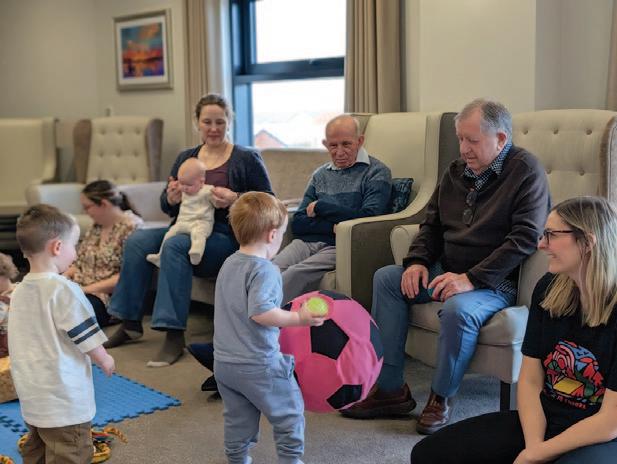
It’s incredibly heartwarming to see how our residents light up during these sessions. The feedback from these sessions has been fantastic, which is why we’ve made them a regular event so that the positive impact is long-lasting, not just a one-off.”
PROMOTES MEANINGFUL LEARNING AND INTERACTION
“What’s particularly special about these visits is the mutual exchange of experiences and skills. While the babies benefit from sensory play and new stimuli, older people enjoy meaningful interactions that remind them of their own parenting days.
They also get the chance to share advice and stories with the parents, creating a three-way learning experience. Intergenerational sessions like this aren’t just heartwarming, they’re a powerful way to pass on knowledge across generations.”
CONNECTING WITH THE COMMUNITY
“Connection is key, especially later in life. Intergenerational activities provide a great opportunity to socialise with others outside of their own age group, helping older adults feel valued and connected to the wider community.
For some of our residents, especially those whose families live further away and aren’t able to visit regularly, it’s like a second family. The visits from the babies and parents bring so much happiness to the residents and have led to lifelong bonds.”
ENCOURAGES PHYSICAL ACTIVITY
“As we get older, mobility can become more limited and staying active can become more challenging, so incorporating movement into fun activities is a great way to support physical wellbeing.
Activities such as dancing, light movement, and games can be adapted so everyone can take part, regardless of age or ability. It’s a fun and inclusive way to keep moving, and many of our residents don’t even realise they’re exercising.”
Cheryl Armstrong, Class Leader at Lullababy Durham comments, “I started this class to connect generations. The residents don’t always have family nearby, so this gives them a chance to see and interact with babies each week. It’s gentle exercise and emotional connection all rolled into one.”
The classes also offer support for new parents, who describe the care home in Durham as a warm, welcoming space. The mums always comment on how lovely the home is,” Cheryl adds. “It’s become a real community. Residents and parents now know each other by name. It’s magic.”
Resident at The DurhamGate Care Home, Mike Holmes, added, “My late wife and I fostered many children and babies, and it brings me so much joy to still get to spend time with youngsters. It really brightens my day.”
Intergenerational activities are a key part of life at The DurhamGate Care Home. Alongside the regular Lullababy sessions, the care home has also recently welcomed pupils from King Street Primary School to spend time with residents.
Care Inspections UK (CIUK), the UK’s only accredited inspection body for care homes, has launched a pay-as-you-go inspection service aimed at helping care homes improve quality, performance, risk management, and regulatory ratings in the face of the increasing costs affecting the social care sector.
To ease cash flow during rising National Insurance and wage pressures, the subscription service offers care homes structured, evidence-based support to navigate compliance challenges effectively. To add to this support, CIUK is offering up to £100 per month off all new subscriptions for twelve months for sign-ups in May 2025.
Designed to accommodate a range of operational needs and budgets, the three-tiered subscription model, Silver, Gold, and Platinum, offers varying levels of inspection frequency, expert guidance, and action plans tailored to each home’s requirements.

Under the Silver plan, care homes receive an annual comprehensive inspection carried out by experienced, accredited professionals. The resulting detailed report includes a full breakdown of every aspect of the care home, along with easy click-through access to relevant standards, regulations, and best practices. An action plan is provided to cover any non-conformances, with ongoing review and support to ensure continuous progress. Homes that meet the required thresholds will be awarded a certification, signifying excellence in care provision. Additional benefits include advisory support before and after inspections, access to exclusive online events and forums for networking and best practice sharing, and participation in CIUK-led publicity initiatives designed to highlight high standards of care. CIUK also guarantees that, by fully implementing all aspects of the action plan, homes will see improvements in their regulatory ratings (CQC, CI, CIW, RQIA), giving providers added assurance that their investment in quality improvement will yield tangible results.
The Gold tier builds upon the Silver plan by offering additional regulatory and commissioning pre-
inspection tools. This deeper level of service helps care providers prepare more effectively for formal inspections, giving them an edge in demonstrating compliance with industry standards. Gold members benefit from an in-depth assessment of their readiness for external regulatory visits, with tailored support that helps anticipate potential concerns and address them proactively. In addition to all the features of the Silver package, Gold subscribers receive a more comprehensive level of preparatory guidance, ensuring that homes meet and exceed industry expectations.
The Platinum package is the most comprehensive offering, providing two inspections per year to ensure that care homes maintain consistently high standards throughout the year. Alongside the core benefits found in the Gold and Silver plans, Platinum members gain access to detailed analysis of inspection trends, helping care homes identify recurring issues and implement long-term solutions for sustained compliance and excellence. Additional advisory support is extended to Platinum members, ensuring they have ongoing expert guidance in regulatory matters, risk management, and quality improvement. This elite tier is particularly beneficial for larger care providers or those undergoing transitions, such as ownership changes or expansion, who require higher scrutiny and support.
Kevin Groombridge, chief executive at Care Inspections UK, said: “Our mission is to raise standards in the care sector by providing accessible, evidence-based support. This subscription model equips care homes with the tools to enhance compliance and deliver the highest-quality care.
With rising costs placing additional pressure on the sector, for only a couple hundred pounds a month, our service offers expert guidance and regular inspections to help providers navigate these challenges. By following our structured action plan, care homes can guarantee an improvement in their regulatory ratings, ensuring better outcomes for both residents and staff.”
See the advert on the facing page for further information.
In care environments where hygiene and safety are paramount, Jangro’s Professional Nitrile disposable gloves (DG130) offer a dependable solution, meeting the rigorous demands of daily care tasks. Designed with caregivers in mind, these gloves provide a comfortable fit without compromising on protection.
Made from high-quality nitrile, these gloves are both powder and latexfree, making them an ideal choice for individuals with latex sensitivities. Nitrile technology provides an exceptionally soft and pliable material that conforms naturally to the shape of the hand. This flexibility reduces hand fatigue during prolonged use and extended wear, allowing caregivers to perform tasks with comfort and ease. Textured fingertips enhance grip, even when wet, ensuring precision during delicate procedures. Whether assisting with personal care, handling food, or performing cleaning duties, these gloves support a wide range of applications within care settings. They’re more than just protective, these gloves are fully compliant with EN455 standards for medical use and EN ISO 374-5 for protection against bacteria, fungi and viruses, underscoring their suitability for infec-
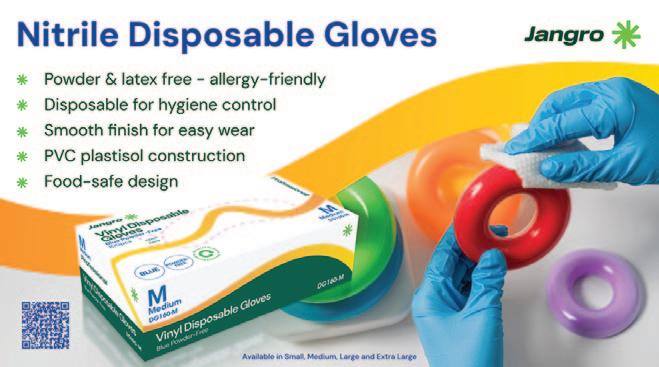
tion control protocols. They also comply with the Medical Devices Regulation (EU) 2017/745 Class I and are manufactured in accordance with the Personal Protective Equipment Regulation (EU) 2016/425. Plus, they’ve been tested for food safety compliance under Commission Regulation (EU) No 10/2011, meaning these gloves are as versatile as they are protective.
The design features, including ambidextrous fitting and ridged cuffs for easy removal and their vibrant blue colour to aid visibility, have been carefully considered to streamline workflow for busy care professionals. At Jangro, we understand that the right protective equipment isn’t just about meeting standards, it’s about supporting the people who care for others every day. That is why our nitrile gloves are manufactured under stringent quality controls to meet the demands of healthcare environments, providing peace of mind for both staff and residents. For more information or to view the full range of disposable gloves visit Jangro’s official website. www.jangro.net
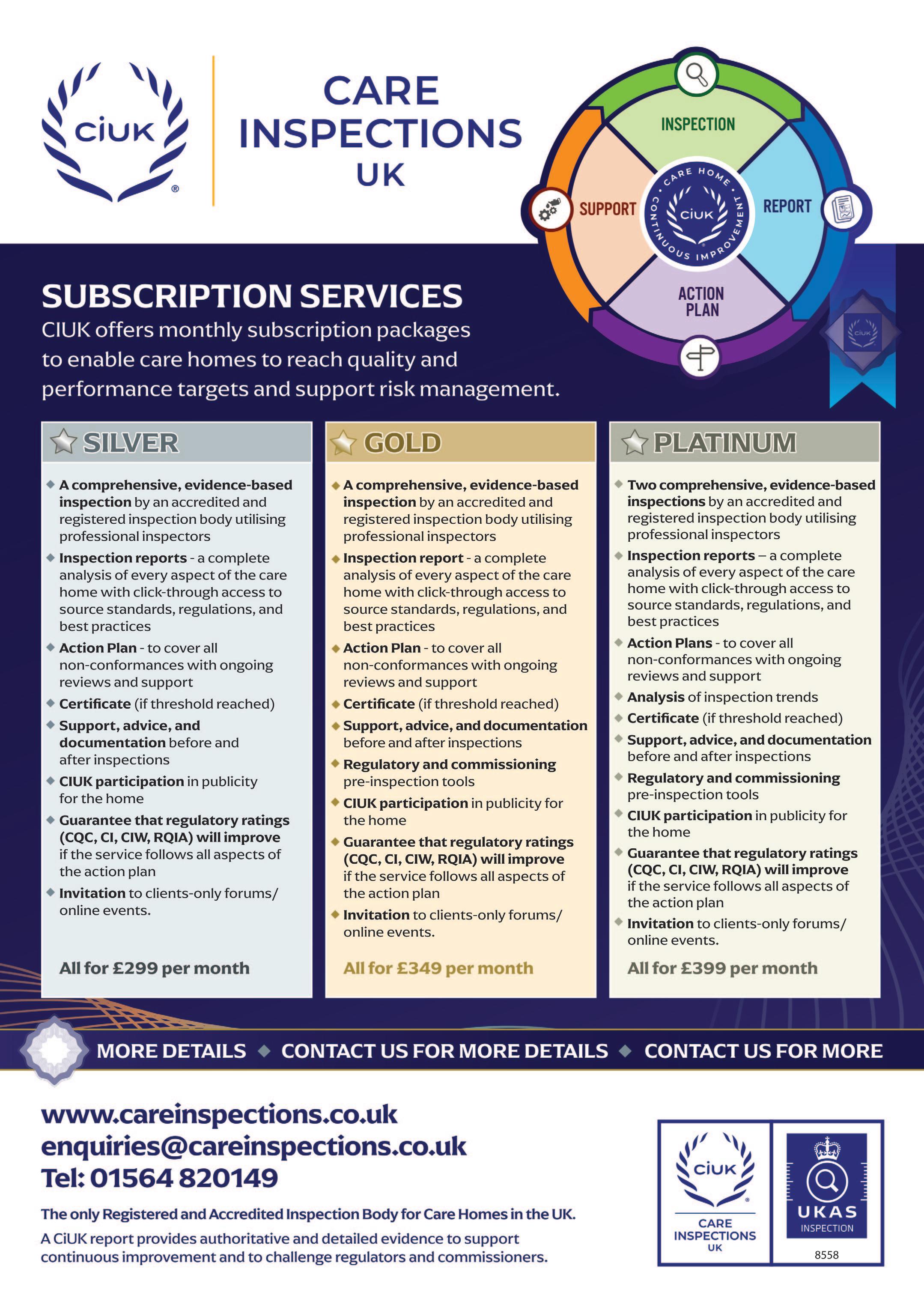
Over 1.3 million people in the UK are sandwich carers - meaning they care for both their parent or elderly relative and a child. With one in two of us affected by dementia in our lifetime2, it's vital that sandwich carers understand the support that is there for them to help them through the challenges they may face while supporting anyone who is dependent on them.
The latest series of Dementia UK's 'My life with dementia' podcast features an interview with Chris Saunders. In the episode, “Caring for Mum and Dad drove me to breaking point", Chris shares the emotional impact of caring for both his parents who were living with dementia, juggling parenting his own son, and working full-time in the emergency services.
Podcast guest Chris Saunders said:“ I’m an only child and we have very little extended family, so my wife and I assumed a caring role without any real discussion. I was working full-time in emergency services, while my wife juggled two jobs of her own. We also had a six-year-old son. To say it was a big adjustment is an understatement.

“I had reached breaking point. I was so exhausted, emotionally and mentally, but the support we received from our Admiral Nurse changed our lives, I don’t know what we would have done without her.”
Dr Hilda Hayo, CEO and Chief Admiral Nurse at Dementia UK said: “If you are caring for a parent or grandparent with dementia and looking after children too, it can be a stressful and socially isolating time.
“Juggling these dual caring responsibilities along with work, finances, the home and wider family life can be very challenging. You may prioritise the needs of others over your own which can take a toll on your overall health and wellbeing. It’s vital that carers take time for themselves.”
TIPS FOR LOOKING AFTER YOURSELF AS A SANDWICH CARER
Reach out to family and friends – take full advantage of wider support networks, whether that be asking friends or family members if they can come by to help with the kids, chores, or simply to have a chat. At the same time, it can allow you to maintain relationships with the people close to you
Find support services – research the support available for unpaid carers and people living with dementia. You may want to look into requesting a Carer’s Assessment from Social Services, as you may be entitled to
respite care for the person with dementia, or other accommodations to help you in your caring role. You can also speak to a dementia specialist Admiral Nurse for advice and support around dementia through Dementia UK’s free Dementia Helpline on 0800 888 6678 (MondayFriday 9am-9pm, Saturday and Sunday 9am-5pm)
Take time for yourself – while it is easier said than done, it is important to take time for yourself as a carer wherever possible, as your needs often fall to the bottom of the list. That might include visiting friends or doing a hobby, it can also mean making sure you're on top of health checks so you are mentally and physically well. It can be difficult to support someone else when you are not at your best Enjoy time with the person you care for - as the person’s dementia progresses, you may find that your caring role overtakes your relationship with them as a spouse, family member or friend. But while your relationship will change, it can still bring you both enjoyment. Rather than focusing only on the care you have to provide, try to find activities that you can still do together to strengthen your connection
Talk to your employer – if you are a carer working a full or part time job, it can be helpful to speak with your employer about your caring responsibilities and to discuss flexible working options. Your workplace might be able to offer you flexibility and support with your current circumstances
Dementia UK’s new podcast, ‘My life with dementia’ is presented by charity ambassador and award-winning journalist and podcaster, Marianne Jones.The podcast brings together real-life stories of people impacted by dementia alongside practical advice from the charity’s Admiral Nurses.
For more first-person stories and advice from dementia specialist Admiral Nurses, subscribe to ‘My life with dementia’ on Spotify, Apple Podcasts, or wherever you get your podcasts to listen to new episodes as soon as they come out.
You can find out more about the podcast on the Dementia UK website: www.dementiauk.org/dementiapodcast/
If you need information or advice on being a sandwich carer visit www.dementiauk.org/information-and-support/looking-after-yourself-as-a-carer/what-is-a-sandwich-carer/
Around 90,000 carers are set to receive Carer’s Allowance Supplement this June – an additional payment of £293.50. The payment is extra money for people who receive Carer Support Payment or Carer’s Allowance on a particular date.
Only available in Scotland, the summer payment will be made between 18 and 19 June 2025. Carers are eligible if they received Carer Support Payment or Carer’s Allowance on 14 April 2025.
Carers eligible for the payment will receive a letter from Social Security Scotland before the payment is made. Carers do not need to apply as it is paid automatically to everyone who is eligible.
Social Justice Secretary Shirley-Anne Somerville said: “This benefit was the first that we introduced when we formed Social Security Scotland back in 2018. It’s an additional payment to recognise the

important contribution of unpaid carers in Scotland. A payment not made anywhere else in the UK.
“It’s another example of how we’ve built a radically different social security system in Scotland, with dignity, fairness and respect at its heart.”
Claire Cairns, Director at The Coalition of Carers in Scotland added: “At a time when many carers are struggling to pay the bills, while providing essential support to loved ones, this payment is a vital acknowledgment of their role and a much-needed financial boost that helps ease some of the pressure they face every day.”
If a carer is eligible for Carer’s Allowance Supplement but has not received a letter or payment by 30 June 2025, they should contact Social Security Scotland free on 0800 182 2222.
Say Goodbye to long lines, chasing down prescriptions or scrambling to find you medications in store!
At Automeds Pharmacy, we’re reshaping the way healthcare is delivered. Serving the South of England with over a decade of expertise, we’re proud to be a distance-selling pharmacy that is truly dedicated to the evolving needs of our patients alongside specialising in care home dispensing.

Whether you’re a care home looking for reliable medication management or are in need of hassle-free prescriptions, Automeds Pharmacy is here to streamline your experience. Our team is specially trained to provide bespoke, efficient medication solutions tailored to your needs.
We partner with a range of eMAR providers, offering flexibility and variety—because every patient deserves a solution that fits just right. From same-day deliveries to bulk dispensing for care homes, we ensure you get the medications you need, when you need them.
We understand that repeat prescription ordering can be a hassle. That’s why our experienced team takes the pressure off our care home staff by handling this process for them. No more wasting time hunting down prescriptions—just more time for what matters most: quality care for residents.
With a daily cut-off time Monday to Friday, urgent items are delivered the same day, so no one has to wait.
As Automeds Pharmacy continues to grow, our mission remains steadfast: to offer tailored medication solutions that make a real difference in the lives of our patients.
We’re not just a pharmacy—we’re a partner in your healthcare journey, and we’ll be with you every step of the way.
Enquire today for your bespoke package! 01305 230091 or wecare@automeds.co.uk or visit www.automeds.co.uk
Two care workers from Hull-based HICA Homecare have raised more than £1,000 for the organisation’s SHINE Fund by completing a sponsored tandem bungee jump at Salford Quays.
Carole Leach, Care Supervisor, and Sharon Foster, Care Coordinator, took the plunge despite Sharon having a fear of heights.
The SHINE Fund helps to create life-enhancing experiences for people supported by the HICA Group, a not-for-profit organisation which operates care homes and community-based care services across the North of England, including HICA Homecare in Hull. Steph Smith, manager at Hull Homecare, said: “I’m so proud of Carole and Sharon, not just for going through with the jump, but for the effort they’ve made to raise money for a cause that benefits so many of the

people we care for. They’re a fantastic example of the dedication we see every day in our team.”
The pair took on the challenge to raise funds for the SHINE initiative, which provides extras that fall outside of core care funding such as day trips, special events or personalised items that bring joy to service users. Sharon said: “It was a terrifying but amazing experience and knowing we were doing it for such a worthwhile cause helped get us through it. The support from colleagues, friends, and families has been overwhelming.”
Carole added: “I’m still in shock that we did it! But the best part is knowing the money raised will go straight back into helping people we support enjoy meaningful experiences and moments.”
Patients will receive better, faster and more appropriate emergency care as the government sets out reforms to shorten waiting times and tackle persistently failing trusts.
The new package of investment and reforms will improve patients’ experiences this year, including by caring for more patients in the community, rather than in hospital which is often worse for patients and more expensive for taxpayers.
Backed with a total of nearly £450 million, the urgent and emergency care plan 2025 to 2026 will deliver:
• around 40 new same day emergency care and urgent treatment centres – which treat and discharge patients in the same day, avoiding unnecessary admissions to hospital
• up to 15 mental health crisis assessment centres to provide care in the right place for patients and avoid them waiting in A&E for hours for care, which is not the most appropriate setting for people who are experiencing a crisis. These centres will offer people timely access to specialist support and ensure they are directed to the right care
• almost 500 new ambulances will also be rolled out across the country by March 2026
The plan, says care England rightly acknowledges the economic reality, highlighting that “falls in social care, home, and community settings make up around 75% of the £2.3 billion NHS cost.” This recognition underlines the importance of investing in preventative care and community-based solutions to reduce avoidable hospital admissions.
Professor Martin Green OBE, Chief Executive of Care England, commented: “This plan ensures that social care is at the forefront of the
way to release pressure from the NHS, recognising that fixing social care fixes the NHS. This is a step in the right direction before the full 10-year plan release.
Together, these measures represent a major step forward in recognising social care not only as a key partner, but as a cornerstone of sustainable, urgent and emergency care. If implemented fully, they offer a real opportunity to improve patient outcomes, reduce system pressures, and support care providers in delivering safer, more responsive services.”
A central theme of the plan is the drive to improve hospital discharge processes. It sets out a clear ambition to “eliminate any internal delays to discharge of more than 48 hours in all settings,” ensuring patients are supported to move promptly into “appropriate rehabilitation, reablement or recovery support.” To facilitate this, the Government has confirmed a 3.9% increase in the NHS minimum contribution to adult social care, as outlined in the 2025/26 Better Care Fund policy framework. This additional funding is critical to ensuring that social care providers can respond flexibly to winter surges and discharge pressures.
The plan also commits to modernising care delivery through digital innovation. It pledges to “set new national standards for initial priority care technologies by March 2026 and publish guidance to support providers to implement technology effectively,” helping care providers adopt smarter tools that enhance independence and reduce risks such as falls.
Public health measures are also a focus, with the NHS working
closely with care providers and local systems to “proactively promote vaccination offers to those who provide and draw on care.” The plan further ensures that “hospitals offer vaccination on discharge to any patients going into a care home,”, an important step to protect vulnerable residents during flu season.
Recognising the need to use care home and community capacity more efficiently, the plan calls for systems to review bed usage and return people to home-based care where possible to shorten unnecessary stays and free up capacity.
In terms of urgent response, there is a clear emphasis on improving coordination with social care. New arrangements are being introduced to “develop Single Points of Access (SPoAs) that accept calls directly from care homes and GPs, avoiding the need for 999 calls.” This is a vital shift that will support timely, appropriate responses without overburdening emergency departments.
Professor Green OBE concluded: “The plan recognises that social care must be part of the solution in mental health pathways. It promotes the “use of the 10 high-impact actions for mental health discharges” to drive timely transitions from hospital to community settings, “supporting flow through all mental health and learning disability and autism pathways.” Showcasing that this plan will help the entire adult social care sector whether domiciliary care, residential, working-age adult or older person, a true change in the right direction for ASC and the NHS.”

Moving thousands of miles away to a new country can be a fairly daunting challenge, but 19-year-old Rhoda Ilesanmi has taken it in her stride and is enjoying a fruitful career at Methodist Homes (MHA).
We spoke to her as part of MHA’s 30 under 30 initiative to celebrate and highlight at least 30 staff members across the organisation in a bid to promote the social care industry as a place of work for people aged 30 and below.
Rhoda came over to the UK from Nigeria in 2023 and started her journey with MHA Walcot Court in Bath and MHA Adlington House in Portishead as a care assistant.
Both places were both Retirement Living Complexes where residents have independent living with the comfort of their own home, plus access to in-house assisted care and support whenever needed.
In February 2025, she moved over to MHA Hartcliffe care home in Bristol, a role which she says is “very different” to her previous roles, but equally enjoyable.
MHA Hartcliffe provides nursing care for 65 residents.
Rhoda added: “Working for MHA is something that I am very happy about and all the locations I have worked at have been very enjoyable.
“I want to make a successful career for myself in the field of care and believe MHA is the right place for me to do this.

“Naturally working in a care home is very different as you see the same residents and there is more routine.
“Each location has given me different experiences, and I am very grateful for that.
“Right from my first day I was made to feel very welcomed, and the residents were very keen to get involved.
“I am very happy in my current role as care assistant, but I would like to progress here at MHA and develop myself.
“The support network wherever I have worked has been amazing and you do feel part of a team.
“Working in care does come with its challenges, but you have to be patient and remember sometimes the residents are not in control of what they are saying or doing.
“For me, if someone asks for advice on working in care, I will definitely tell them to go for it.
“It's important to be able to understand the needs of the residents and communicate and spend time with them.
“The skills and life experiences you pick up are very transferable and you will be able to further enhance yourself.”
Nested among acres of woodland, an Edwardian country home was turned into a care home in 1995.
That is how RMBI Care Co. Home Shannon Court was born. Located in the picturesque village of Hindhead, it first opened its doors three decades ago today. One of its first staff members was Glynis Thorne, who now celebrates her 30th anniversary working at this Home.
To mark Glynis’ and Shannon Court’s joint milestones, the management team launched a day-long party complete with a live music show, an outdoor barbecue for residents, staff and friends, and therapy pets for residents to stroke and enjoy.
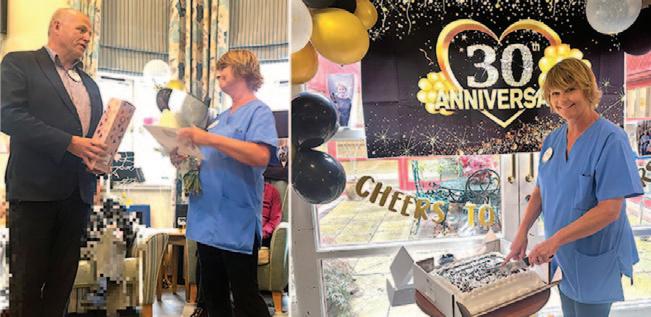
“It has been an absolute honour and privilege to have worked at Shannon Court for three decades of my life. I have made so many great friends throughout this journey!” says staff member Glynis, who received a long-service award certificate, a present and a bouquet from Steve Stace, the Home’s Business Manager.”
“This has been a spectacular party. It is very fitting to celebrate both Shannon Court’s and Glynis’ 30th anniversary today, for no care home can function without the dedication of its staff members,” says Steve Stace. “Glynis’ heartfelt commitment to high quality care is a testimony of what we all aim to achieve each and every day.”
Assisted living, nursing, respite, and dementia care provider Signature Senior Lifestyle, has announced the appointment of Rob Martin as its new Chief Executive Officer.
Rob will officially assume his role in the autumn. In the interim, the organisation will continue to be led by Steve Gardner, who has served as interim CEO. Upon Rob’s arrival, Steve will return to his role as Chief Financial Officer for Signature.
Rob joins Signature from his current role as Managing Director at Anchor, England’s largest provider of specialist housing and care for people in later life. With over 20 years of leadership experience across health and social care, Rob brings deep operational expertise and a strong track record of innovation and growth.
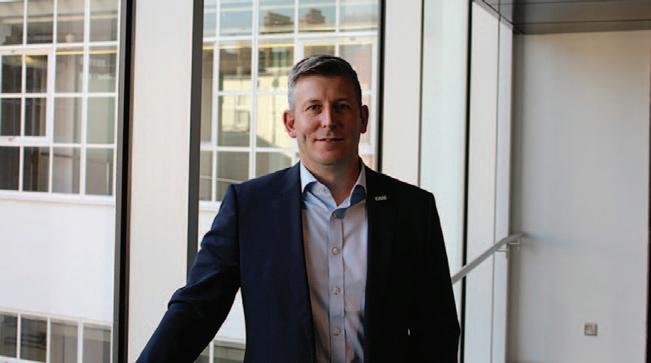
At Anchor, Rob oversaw more than 130 care communities and played a pivotal role in driving innovation and leading acquisition and investment programmes across the group. Rob is widely recognised as a respected voice in the sector, as a Board Member for the National Care Forum and was honoured with the prestigious Social Care Top 30 Award in 2024 for his contributions to the sector.
Before becoming Managing Director, Rob was Director of Quality at Anchor for 7 years, overseeing quality, governance and service improvement. Rob led operational delivery across the portfolio, working closely with District Managers to uphold high standards. Rob also contributed to strategic boards and collaborated with HR, Training, and Safeguarding teams to drive continuous improvement across the organisation and ensure alignment across key organisational functions.
Before transitioning to the private sector, Rob served in the British Army for seven years as part of the Royal Artillery, where he developed a foundation of leadership and resilience that has defined his career. Reflecting on his appointment, Rob Martin said: “Signature Senior Lifestyle is a business that has built an exceptional reputation for delivering luxury care underpinned by clinical excellence and compassion. I’m delighted to be joining at such a pivotal time, as the business prepares to open three new homes in 2026 and continues to expand its reach and impact. I look forward to working with a passionate and dedicated team to ensure we remain at the forefront of high-quality care, delivering outstanding experiences for our residents, their families, and our people.”
The South West’s Leading Care & Occupational Therapy Event – Are You In?
Here’s 5 Reasons You Need to Be at The Care & Occupational Therapy Show!
On 16th July at Westpoint, Exeter, The Care & Occupational Therapy Show is bringing together the best in the Care and Occupational Therapy industries for a game-changing event. We will be there, here’s why you need to be there too: �� Unmissable keynote sessions from industry leaders like The Homecare







A council has said it will pay about £2.3m in refunds after overcharging people for the cost of care.
Southend-on-Sea City Council has contacted residents affected by an error in care cost calculations.
The error, which dates back to 2018, was caused when a new software system used to calculate care charges was configured incorrectly.
This led to some people being overcharged for care in their own homes or while living with family members, supported living, shared lives, extra care and day care.
A total of 586 people have been contacted, including 335 people who currently receive this care.

Cllr Daniel Cowan, Leader of Southend-on-Sea City Council, said: “We recently identified a technical error, originally made in 2018, that has caused some residents to be overcharged for their care. “On behalf of Southend-on-Sea City Council, I sincerely apologise for this error. I am pleased to report that council officers have moved quickly to assess its impact, and we are putting things right.”
“A dedicated team has reviewed every affected individual’s circumstances. We have contacted each person to make sure they get the refunds they may be due, and we are confident that we now have the systems and processes in place to stop this happening again.”
The residents and staff at Elm Bank care home in Kettering are always delighted in attending the local ‘Dementia Sings Out’ group. The group is held every Thursday at the Compass Church in Wellingborough and the Elm Bank care home residents have been attending the group for almost a year.
The group is a community choir that meets every week for those living with dementia, and for their carers, to sing songs that are not only uplifting but also inspirational. It is lovely for the residents and staff of Elm Bank care home to enjoy the music and songs from Gareth Fuller, who certainly has all up on their feet dancing and singing. As always the morning is enjoyable for all that attend, for people to simply let their hair down and immerse themselves in the wonderful group that make them feel so welcome. The volunteers at the group certainly make the morning extra special, Elm Banks residents and staff will definitely be returning weekly for more fun.
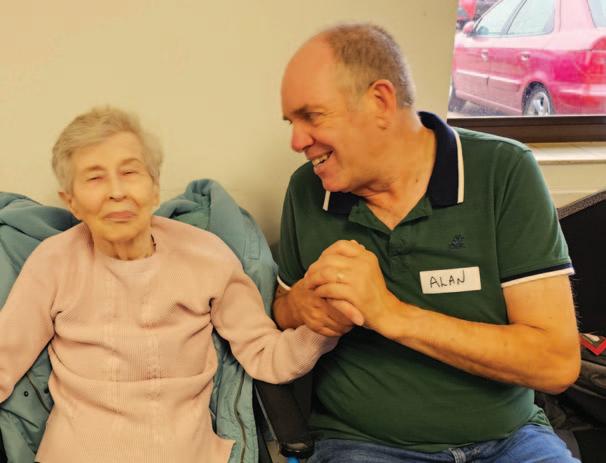
Tina, Activities Coordinator said, “We have been coming to this truly amazing venue for a year now and every time we have attended we can really see what a difference it makes to our residents. It is such a warm and welcoming place and with the volunteers who are full of smiles and ready to help, I can honestly say that our residents really enjoy attending, and so do we!.”
Marvellous Bindura, General Manager said, “It is lovely to see our residents and staff enjoying another morning with ‘Dementia sings Out’, the enrichment this group creates in the lives of all living with dementia is recognisable. It is very important to have links with local groups, it not only allows for good community relationship, but also the impact these groups have on residents here at the home is truly amazing”.
Our varied life enrichment programme keeps residents active, and provides a daily choice of engaging physical, mental and spiritual activities tailored to residents’ interests and abilities.
Ash Court Care Home, run by HC-One, located in Knotty Ash, Liverpool, Merseyside, is preparing to welcome in visitors and guests from their local community to participate in this year’s Care Home Open Week celebrations from Monday 16th June until Sunday 22nd June 2025.
The homes main celebration events are due to take place during Care Home Open Weekend on Saturday 21st June, 11am – 4pm. Ash Court Care Home will be welcoming residents, colleagues, friends, family and the wider community to Ash Court Carnival where there will be live entertainment from 11am and 2pm, a Punch and Judy show, a bouncy castle, outdoor marquee, vintage carnival games, face painting and a tombola.
Care Home Open Week is a national event hosted by Championing Social Care, designed to connect care homes with their local communities. The week will offer care homes the opportunity to showcase their range of services, provide tours of their facilities, and highlight the activities that are offered to residents.
The event also seeks to connect the homes with their neighbours, highlighting the communal support that the home can provide. HC-One’s chosen theme for this year’s Care Home Open Week is ‘The Big Summer Weekender’ emulating the nostalgic feel of British summer holidays with a variety of fun-filled activities culminating in an end-of-week celebration at the home.
Throughout the week, residents, colleagues, families, and friends are set to enjoy a variety of fun-filled activities culminating in an end-of-week celebration at the home. The home and members of the local community will be com-
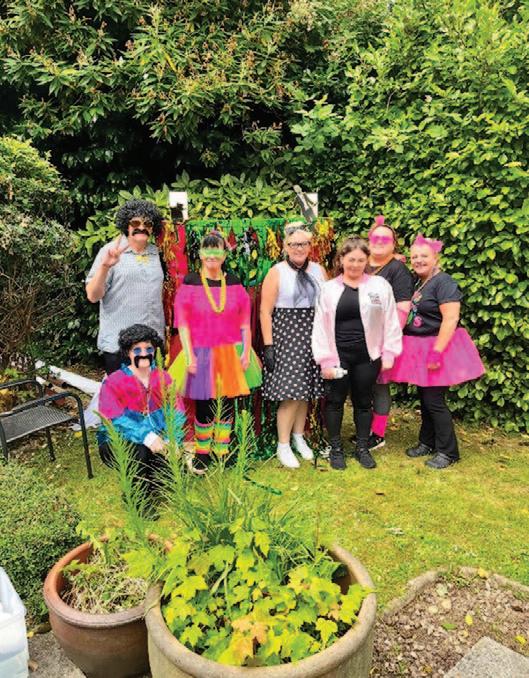
ing together to celebrate summertime memories past and present and hosted a fabulous Summer Weekender event.
Ash Court Care Home will be adorned in a variety of summer themed decorations, emulating the nostalgic feel of British summer holidays past and present providing a perfect setting for everyone to come together as a community, and to learn more about life at the care home.
As well as providing a space for existing relatives and residents to celebrate life at the home, visitors will also be encouraged to hear directly from colleagues in the home about what a rewarding career in care looks like as well as opportunities for community engagement and about the volunteering roles on offer within the home.
Emma Leigh, HC-One’s Ash Court Care Home Manager, said:
“We’re really looking forward to welcoming our local community to Ash Court Care Home during Care Home Open Week.
“It’s a fantastic opportunity for people to see first-hand the kind, person-centred care we provide, meet our dedicated team, and experience the warm, homely atmosphere we’re so proud of.
“We believe in building strong relationships with our neighbours, and this event is a great way to celebrate those connections.”
For enquiries about Ash Court Care Home or visiting HC-One’s Ash Court Care Home’s Care Home Open Week event, please call 0151 259 7522 or email emma.leigh@hc-one.co.uk
In care homes, where hygiene, safety, and reliability are paramount, it’s essential that laundry operations run seamlessly. Forbes Professional’s Complete Care solution is tailored to meet the specific demands of this environment, offering fully supported and cost-effective laundry systems.
With Complete Care, care homes benefit from access to premium commercial laundry appliances without upfront capital expenditure. The all-inclusive rental plan covers installation, routine servicing, maintenance, and repairs; enabling staff to focus on resident care rather than laundry appliance logistics. Unexpected breakdowns can severely disrupt operations, which is why Forbes provides nationwide, award-winning support with a same or next-day engineer response to minimise downtime.
Preventative servicing is central to Forbes’ approach. Their offering includes routine maintenance, full certification, annual gas safety checks, and professional dryer duct cleaning - ensuring systems meet all legal and regulatory standards. Whether supporting existing machines or those rented through Forbes, this proactive strategy improves

operational efficiency and reduces risk.
Under Regulation 35 of the Gas Safety Regulations 1998, annual gas inspections are mandatory. Forbes’ Gas Safe-registered engineers conduct these checks to ensure safe, legally compliant environments. Additionally, regular duct cleaning - often overlooked - is vital not only for performance but also for fire prevention. Forbes’ nationwide service mitigates these risks while optimising dryer efficiency.
Whether you need new rental equipment, service and maintenance for existing appliances, or a full purchase, Forbes offers flexible procurement routes to suit different operational models and budgets. Their expert consultants work closely with care providers to design tailored solutions for each setting.
With decades of experience in the care sector, Forbes Professional is a trusted partner to care homes across the UK; delivering dependable, fully supported laundry solutions that prioritise safety, compliance, and peace of mind.
| 0345 070 2335
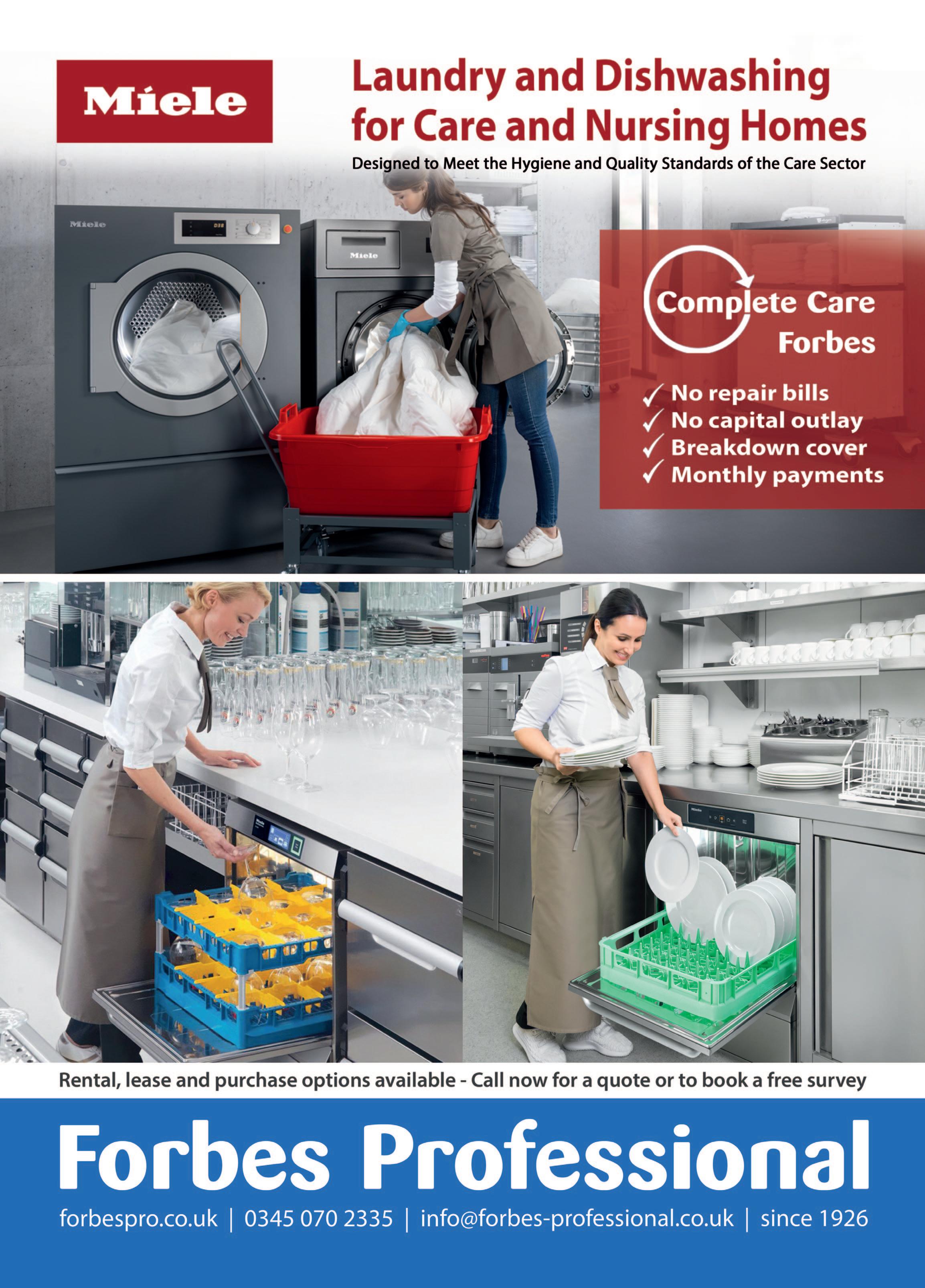

At Rosa Lifestyle, we believe that daily living aids should do more than just meet functional needs - they should spark joy, preserve dignity and reflect individuals’ personalities. This belief is at the heart of every product we create, and it’s a vision born from a very personal place.
Our founder, Sarah, established Rosa Lifestyle after experiencing first-hand the lack of practical yet dignified and stylish solutions available for her own grandmother, who was living with dementia. She found that too often, the market was saturated with clinical-looking, uninspired products that did little to support wellbeing or enhance the experience of those living with cognitive or physical challenges. Rosa Lifestyle was created to change that.
We design products that support people to continue eating and drinking more independently, but also with more confidence and comfort. Our core range of produces includes lightweight, two-handled mugs, compatible mug lids, and matching snack trays - all made from high-quality melamine to give the look of a china or ceramic mug but importantly, without the weight. Each item is carefully developed to be functional, durable, and attractive - bringing a sense of warmth and homeliness to mealtimes.
The impact of beautifully considered daily living aids extends far beyond aesthetics. As a resident living with early-onset dementia shared in her heartfelt response: “I am a youngster in a care home and was needing to use their plastic two-handled beakers which I hated! Found your beautiful, colourful mugs! They are great and don't remind me of my disabilities and much nicer when visitors join me for afternoon tea!” This testimonial cuts to the very heart of our mission - creating products that people are proud to use, that support their needs without highlighting their limitations and fostering greater social connections and inclusion. Our two-handled mugs, for example, are specifically designed to offer greater stability for individuals with limited grip strength, tremors, reduced vision, or reduced dexterity. The dual handles allow for a balanced, secure grip, reducing the risk of spills and burns. This not only improves safety but can dramatically reduce anxiety around drinking - both for users and their caregivers.
Meanwhile, our mug lids help prevent spills and keep beverages warmer for longer, while our snack trays are perfect for that lunchtime sandwich or afternoon cake and have an integrated cup holder for greater
stability, are lightweight, and easy to clean. Together, these products support better hydration and nutrition - two essential but potentially challenging areas in care environments.
The most powerful endorsements of our work come from those who use our products every day. One care home manager told us: “The mugs are being well utilised and have been a wonderful addition to the home.” While at a dementia day centre in Fife, the team shared how Rosa Lifestyle mugs have transformed daily routines: “We use the mugs every day for our clients who love them! With these mugs being lighter than others, we’ve noticed that not only do our clients drink more fluids (and soup) than they otherwise would - which really helps their overall fluid and nutrition intake - it also promotes their independence and dignity as well.” These kinds of outcomes are why we do what we do.
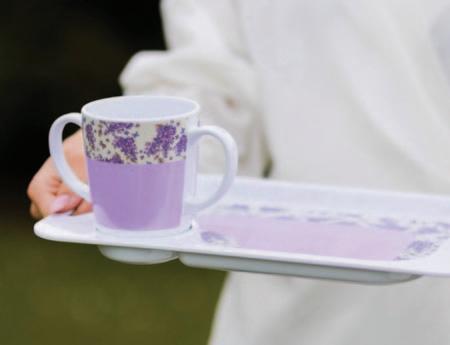
For caregivers, whether professionals or family members, our products are more than tools. They are part of a broader culture of care that values choice, dignity, and self-expression. When a resident or loved one feels more confident and capable using a product that respects their tastes and abilities, the knock-on effects are enormous: greater participation in mealtimes, improved mood, and fewer incidents of frustration or distress.
Our hope is that Rosa Lifestyle products are seen as adaptive homeware rather than clinical aids and become staples in care homes, day centres, and private homes alike - not only because they’re functional, but because they bring a dignified positivity to people’s everyday lives.
In an ever faster moving and busy world, small moments matter. A warm cup of tea enjoyed without fear of spilling. The comfort of a snack on a familiar tray. The joy of choosing a mug that feels personal. These are the moments that build dignity, connection, and overall wellbeing.
To learn more about Rosa Lifestyle or explore our product range, please visit www.rosalifestyle.co.uk or see the advert on page 5
Residents from HC-One’s Abermill Care Home in Abertridwr, Caerphilly, were treated to a heartwarming day of intergenerational joy during a special visit to Nant Y Parc Primary School.
The day featured a cookery session where residents and children came together to prepare and enjoy a traditional Welsh Cawl. Laughter and conversation filled the room as generations bonded over the beloved national dish. The visit also included a creative arts and crafts session, allowing residents and pupils to collaborate on colourful projects and build meaningful connections. The event was further enriched by the involvement of parents by creating a warm and inclusive atmosphere that celebrated community spirit.
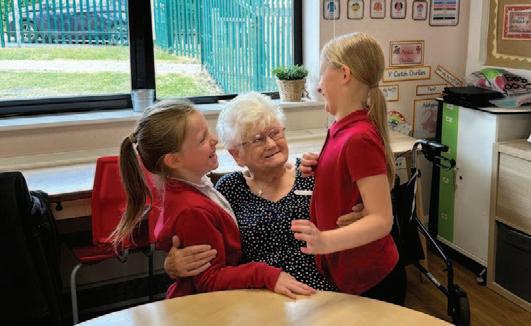
staff and children
Christine
“The relationships between the children and our residents are truly special – it brings a lump to my throat every time I witness their interactions.
“Both our residents and the children take so much joy from seeing each other. These moments are so important, and we’re incredibly grateful for them.
“We’d like to extend a massive thank you to Miss Winters and all the wonderful staff and pupils for always making us feel so valued and included.”
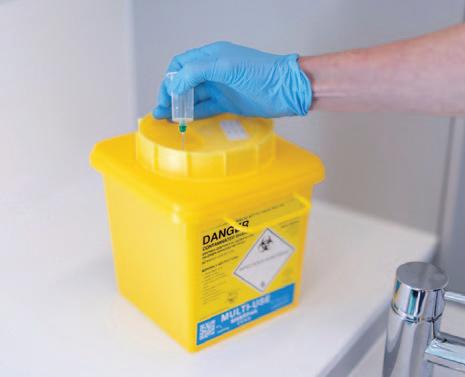
Sanaway, a leading clinical waste, sharps, and washroom hygiene service provider, has introduced new reusable and recyclable sharps containers as part of its auditable ‘Zero Waste to Landfill’ service commitment.
The initiative is part of Sanaway’s ongoing focus to reduce environmental impact for both the company, and its nursing and residential care home customers.
The new reusable recyclable sharps container enables one container to be reused 10 times before being recycled into new reusable sharps containers. The container’s VisiLOCK system optimises safety by eliminating the risk of content spills that may lead to cross-contamination or accidental needlestick injury.
The family-owned business operates across the South of England, servicing customers that demand a reliable, personal and high standard of service at a competitive price.
Co-founder and director, Patrick Martin says: “We are exceptionally proud of our environmental philosophy and commitment, which has been at the core of the company since day one.
“Providing the new reusable sharps service is now standard for all our customers, and at no extra cost. This not only demonstrates our dedication to help minimise the impact our industry has on the environment, but can also help customers achieve up to an 87% carbon saving. This being in line with the NHS’s targets for a 50% reduction in emissions by 2026.”
REDUCE, REUSE AND RECYCLE
Each sharps container has a VisiLOCK closing mechanism to ensure optimum user safety. Once full:
• The containers are collected by Sanaway delivered to the processing facility.
• A robot opens and photographs the contents before:
o Sharps are incinerated.
o Containers are sanitised and recovered.
• The sharps containers are thoroughly checked before being returned for reuse.
• Containers are tracked using barcode scanning to monitor their usage cycles, after 10 uses, the container is granulated and remanufactured into a new sharps container.
• This process is repeated 10 times, meaning the original plastic is reused 100 times.
• After completing 10 full cycles, the plastic is granulated again and repurposed into non-medical products, such as road traffic cones.
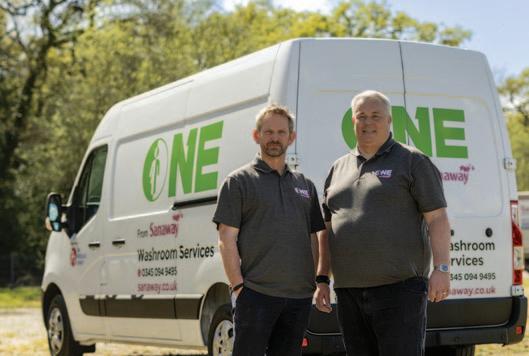
Sanaway’s Zero Waste to Landfill philosophy is a market leading standard, based on Energy from Waste (EFW) technology, which means it is a sustainable solution for both waste management and energy production. 99.995% of the process is recyclable and all the recyclable elements are removed before the incineration process leaving only 0.005% nonrecyclable.
The company’s auditable Zero Waste to Landfill service diverts all of the 50 plus tonnes of waste the company collects from its customers every year from landfill, and contributes towards the power supply for more than 50,000 homes. The company’s ISO 9001 accreditation also gives the added peace of mind from a day to day management perspective, providing a benefit for nursing and residential care homes with ISO 14001 certification, enabling them to fulfil their continuous improvement requirements.
Commenting on the new service, Martin concludes: “We believe considered improvements like these to our customer first, high service standards are the main reason many of our clients have been with us for so many years, contributing to our enviable 95% customer retention rate and year on year growth.” For more information visit

A remarkable first quarter sales performance for UK health and medical equipment manufacturers has flown in the face of low business confidence amongst SMEs.
New figures show the average small-medium UK medical manufacturer made 42% more sales revenue in Q1 2025 than Q4 2024, and 41% more year-on-year.
The findings – based on direct data from over 600 UK firms using Unleashed’s inventory management software – show pessimism amongst the business community may be unfounded.
Recent Q1 business confidence surveys show overall confidence turned negative for the first time since 2022 on the back of tax rises, inflation, weak growth and increased global uncertainty.
However the stellar sales performance in the health and medical supplies industry – alongside a 12% uptick in profitability against Q4 – suggests international market turmoil has created a silver lining for UK businesses.
Joe Llewellyn, GM of ERP Small Business at The Access Group, the parent company of Unleashed, said the unusual business conditions of the first three months of the year had generally played out well for the country’s smaller producers, as had falling bank rates:
“Anecdotally, what we’re hearing from some of our customers is that Q1 brought welcome windfalls. Some tariff-affected international customers have turned to UK firms to do business, while others raced to order more before tariff pauses came off. That’s delivered a shot in the arm for some firms, but more importantly we’re hearing that steadily falling bank rates are starting to stimulate the economy, which obviously is very welcome to UK manufacturers who’ve posted a really strong start to the year.” Unleashed’s data also showed profitability improving as manufacturers held off purchasing new stock, preferring to eat into inventory reserves where possible. Gross Margin Return on Inventory (GMROI) for the average SMB manufacturer lifted 32% YoY, to £5.48 return for every pound spent on buying stock.
Partly this was thanks to further falls in delivery lead times, down to 18 days on average. Faster delivery times allow businesses to reorder in smaller quantities, which is a more cost-efficient way to generate sales that improves margins.
It’s also possible that the higher profit margins seen in Q1 were caused by purchasing managers deferring their inventory replenishment spend in response to low GBP-USD exchange rates. In January the pound dipped to 1.22 USD, making international purchases more expensive for UK buyers of US-dollar denominated goods. By the end of March, however, the exchange rate had trended favourably and reached 1.34 at the end of April.

Across all of the 12 manufacturing categories analysed, sales were up by 30% in Q1 2025 compared to Q4 2024 – and 13% year-on-year. Profitability also jumped by 10% in Q1 2025 with £4.03 generated for every pound spent on stock.
Almost all manufacturing categories saw a positive quarter-on-quarter sales performance, with only Electronics & Telecoms, and Food seeing a decline at -23% and -34% respectively.
All categories benefited from reduced lead times – Sports & Entertainment led the way with a -45% drop, from 22 days to 12. The amount of excess stock held by each company also fell in many categories, including Industrial Machinery which saw the most dramatic decrease at -68%.
View the full Unleashed Manufacturing Health Index report.

Care provider, My Choice Healthcare, has expanded its presence in Powys with the acquisition of The Mountains Care Home, a specialist 50-bed nursing care facility offering nursing care to older people, including those living with dementia, alongside people with learning disabilities and mental health conditions.
Located near the Brecon Beacons, the converted property was previously owned by Milkwood Care, who chose to sell to a provider with an established footprint in the area.
The acquisition brings My Choice Healthcare’s portfolio to 11 care homes, including nine in Wales, supporting its mission to deliver outstanding, person-centred care across the country.
The team at The Mountains provides tailored nursing and residential care, including specialist support for residents living with dementia or Alzheimer’s.
Bethan Evans, CEO of My Choice Healthcare, said: “The Mountains is a wonderful home and the team does an exceptional job supporting residents and their families, so we’re excited to continue the hard work already being done here.

“We’re passionate about delivering high-quality care and supporting the wellbeing of those who need it most. This acquisition gives us an exciting opportunity to do just that in Mid Wales.”
The NACC has announced the launch of their bespoke National Webinars, a new initiative providing accessible, topic-focused online learning for care catering professionals across the UK.
Developed in response to members feedback, the webinars will focus on key challenges and opportunities within the sector, encouraging the sharing of best practice and professional development. The sessions will be free for NACC members, with a nominal fee for non-members.
NACC National Chair, Neel Radia comments: “This forms part of our wider com-
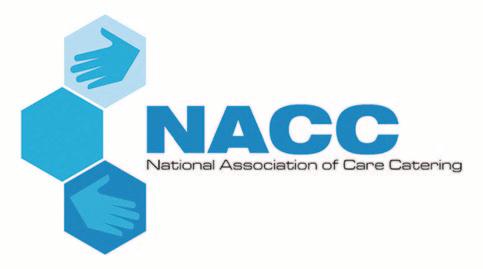
mitment to deliver meaningful member benefits and provides tangible training and advice without our members having to leave their place of work.”
The first NACC National Webinar entitled: ‘Recruitment & Retention in Care Catering’, proudly sponsored by KSB Recruitment, will take place at 3.00pm on Wednesday 26th June 2025. A second webinar will be held Thursday, 23rd October 2025.
The session is open to all care catering professionals, and places can be booked at www.naccwebinars.co.uk
River Court Care Home in
recently had the absolute pleasure of hosting a vibrant and heartwarming performance by the
of The
School of Irish Dancing.
The care home’s residents, along with their families and friends, were thoroughly captivated by the energy, confidence, and skill of the young performers. The lively Irish dancing brought smiles, joy, and a wonderful sense of celebration to everyone in attendance.
The residents were amazed by the performance with a number of wonderful comments being made by residents and their loved ones, including ‘What a talented group!’ and ‘Could they come back and perform again?’

Cecilia Kassanga, Home Manager at HC-One’s River Court Care Home, said:
“Our residents were thrilled by the performance. The dancers brought such a positive atmosphere — it was truly a special day for us all.
“The event provided a sense of community connections and how intergenerational experiences can bring happiness and lasting memories to all of those involved.
“We’d like to extend a heartfelt thank you to The Halpin School of Irish Dancing for their incredible performance and we look forward to welcoming them back for another visit soon.’’
A new hard-hitting report from the Homecare Association reveals government cuts have caused widespread exploitative commissioning by cashstrapped councils, crippling state-funded homecare, and renews calls for a National Contract for Care.
The Association says national and local government are complicit in “statesponsored labour exploitation”. 27% of homecare contracts in England are at rates below direct employment costs at the legal minimum wage, undermining safety and quality of care, worker welfare and rights, and continuity of services.
“When public bodies buy care at prices that don’t even allow payment of the minimum wage, it’s not efficiency, it’s enabling modern slavery,” said Dr Jane Townson OBE, Chief Executive of the Homecare Association.
“Ministers tell everyone they are introducing a Fair Pay Agreement to attract British workers and avoid the need for international recruitment, but this is a fantasy. Our research shows there isn’t enough money in the system even to pay all homecare workers the minimum wage of £12.21 per hour. It’s a scandal of epic proportions on this government’s watch. And it must stop.”
KEY FINDINGS:
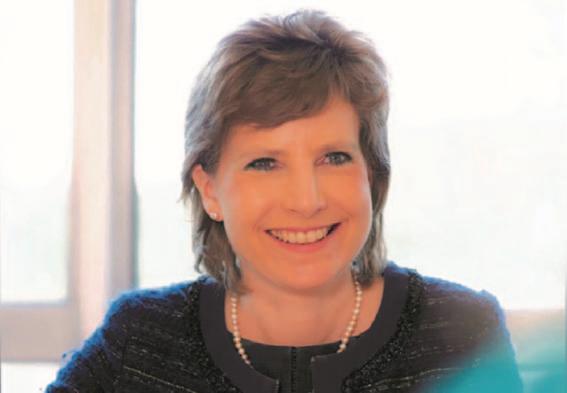
• 27% of contracts fall below the minimum cost of employing a careworker at £12.21/hour, including travel and training.
• Six councils in England, including Labour-led authorities, offered 0% uplift in 2025–26, despite 10–12% cost pressures on providers.
• The average council fee rate is just £24.10/hour, compared to the Homecare Association’s Minimum Price of £32.14/hour.
• Only 1% of contracts meet or exceed the legal and operational threshold for sustainable, safe care.
A PRE-EMPTIVE WARNING TO THE TREASURY
The Association is issuing a direct challenge to ministers ahead of the Comprehensive Spending Review on 11 June warning that if social care is again ignored in favour of NHS investment, the consequences will be severe.
Since 2022/23, the government has allocated an additional £28.5 billion to the NHS (1), more than the entire social care budget for all English local authorities combined (£26.9 billion in 2022/23) (2). Meanwhile, homecare providers are being asked to shoulder rising wage and tax costs with no matching investment.
“We support the government’s 10-year health plan and the three shifts from hospital to community, illness to prevention, and analogue to digital. This is the right course but the government must stop pretending it
can deliver this plan by focusing only on the NHS and starving social care,” said Dr Jane Townson OBE. “The evidence is now overwhelming and ignoring it in this Spending Review would be a catastrophic mistake.”
THE ASSOCIATION WARNS:
• A fair wage for care workers requires a fair price for homecare. Unless the Fair Pay Agreement is accompanied by reform of local authority commissioning and contracting, and closure of the current £1.6 billion funding gap in England to pay the legal minimum wage, labour exploitation and workforce shortages will persist.
• Government and the Fabian Society projections underestimate the true cost of delivering fair pay and safe care by failing to account for historic deficits.
• Without sufficient funding, we risk harm to individuals, heightened burdens for families and increased pressure and cost to the NHS.
Research published by the Association of Directors of Adult Social Services and the Care Provider Alliance has revealed a stark picture of growing unmet need and service failure:
• Over 418,000 people are waiting for care assessments or support to begin (3).
• 57% of providers plan to hand back public contracts and 22% are considering closure or sale (4).
• Careworkers are quitting at unprecedented levels because of low wages and job insecurity
“This isn’t a future risk, it’s happening now. Failure to support us all to live well at home has far-reaching consequences. Ambulance queues, corridor care, burgeoning waiting lists for assessment and treatment, unnecessary suffering and death, and economic inactivity. This affects people of all ages.” Dr Townson added.
Ahead of the 11 June Spending Review, the Homecare Association is calling on the government to:
• Invest at least £1.6 billion immediately to local authorities in England to ensure careworker wages meet legal minimums.
• Introduce a National Contract for Care that guarantees sustainable, lawful fee rates.
• Fully fund the Fair Pay Agreement and ensure it addresses existing shortfalls, not just future aspirations.
• Treat social care as an equal partner to the NHS, not a subordinate or afterthought.
“The Spending Review must mark a turning point.”
“This time, the government cannot plead ignorance. The evidence is here. The need is urgent. Ministers must match their words with action or stand accused of knowingly perpetuating exploitation and neglect.”
A staff member at a Stafford home pounded the streets of Sutton
and managed to raise over £500.
Deborah Phillips works as an activity coordinator at MHA Weston and Queensway and took part in the run to raise funds for the home.
The Royal Sutton Fun Run is an 8.5 mile run through the town centre before entering Europe’s largest urban park, Sutton Park, and finishing in Royal Sutton Coldfield town centre.
Deborah managed to raise £512.00, which will go towards the home’s amenities fund, from which activities and trips are arranged. MHA Weston and Queensway provides high-quality dementia nursing care for 70 residents.
Speaking after the run Deborah said: “I was very happy to have completed the run as six miles in I started getting some pain around my ankle.
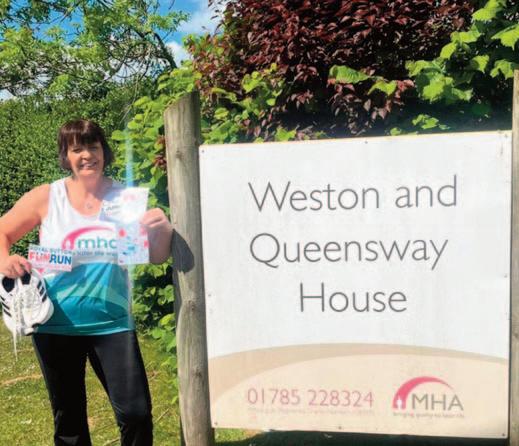
“I went to the medical centre that was there on site, who gave me the onceover, strapped me up and away I went.
“I was always going to finish the challenge as that’s the sort of person I am.
“I am a keen runner and have done longer runs in the past but due to my back I am always careful and participate in smaller runs like this one.
“I was training for around four months for this run, which is one of the reasons I had discomfort in my ankle as I was told I may have overtrained.
“The day went really well, the weather was just right for running and I am very happy with the amount raised.
“The residents love animal visits so I am sure some of the money will go towards booking some animal visits.
“I want to thank everyone who donated for their generosity on behalf of the home, the money will go a long way and will put a smile on the faces of our residents.”
A Plymouth dementia nursing home has been announced as outright winner of three ‘excellence’ awards for its outstanding services at Plymouth City Council’s Celebrating Excellence in Care Awards 2025.
The awards celebrate the contributions of dedicated adult social care workers and teams across care homes, supported living, day centres, and domiciliary care.
Clare Sinclair, manager of Butterfly Lodge, said: “Our most treasured new accolade is that Butterfly Lodge was the overall winner in the ‘Excellence in Dementia Care’ category.
“But we are thrilled to have also scooped Deputy Manager of the Year and the People’s Choice awards, as well as a ‘highly commended’ in the Ancillary Worker of the Year category, and we are so delighted with this well-deserved recognition for each of the winners.”
Sarah McCaffrey was named Deputy Manager of the Year; laundry assistant Teresa Warren was given the People’s Choice award and housekeeper Kirsten Bradbury was ‘highly
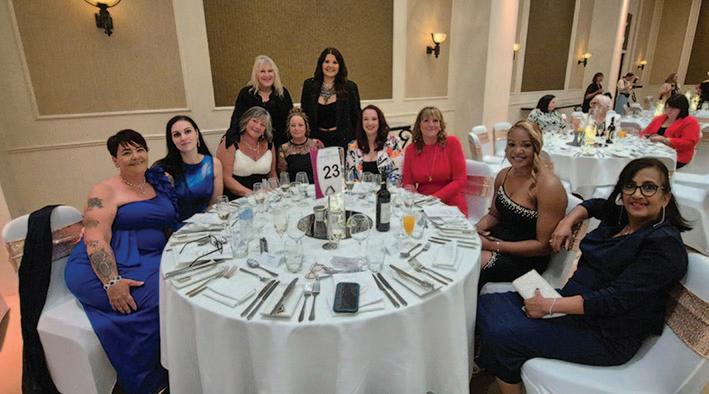
commended’ in the Ancillary Worker category.
Guests at the awards ceremony heard that Sarah “…always makes time for everyone, and nothing is too much trouble for her. She supports her team in all their endeavours and consistently prioritises the best interests of the home. She works tirelessly to ensure that the home as bright, friendly and welcoming in every possible way.”
Asked what it was like to work ‘as a team’ at Butterfly Lodge, Sarah praised the home’s manager, Clare Sinclair. She said: “We have the best manager; she guides us, teaches us; she’s absolutely amazing and I wouldn’t be here today without her.”
Teresa Warren and Kirsten Bradbury were praised for completing “…every task with care and with compassion. They take pride in their work, always making sure the residents’ clothing and bedding are fresh, clean and handled with dignity. They are an invaluable part of the team. They both embody the spirit of care and of excellence.”
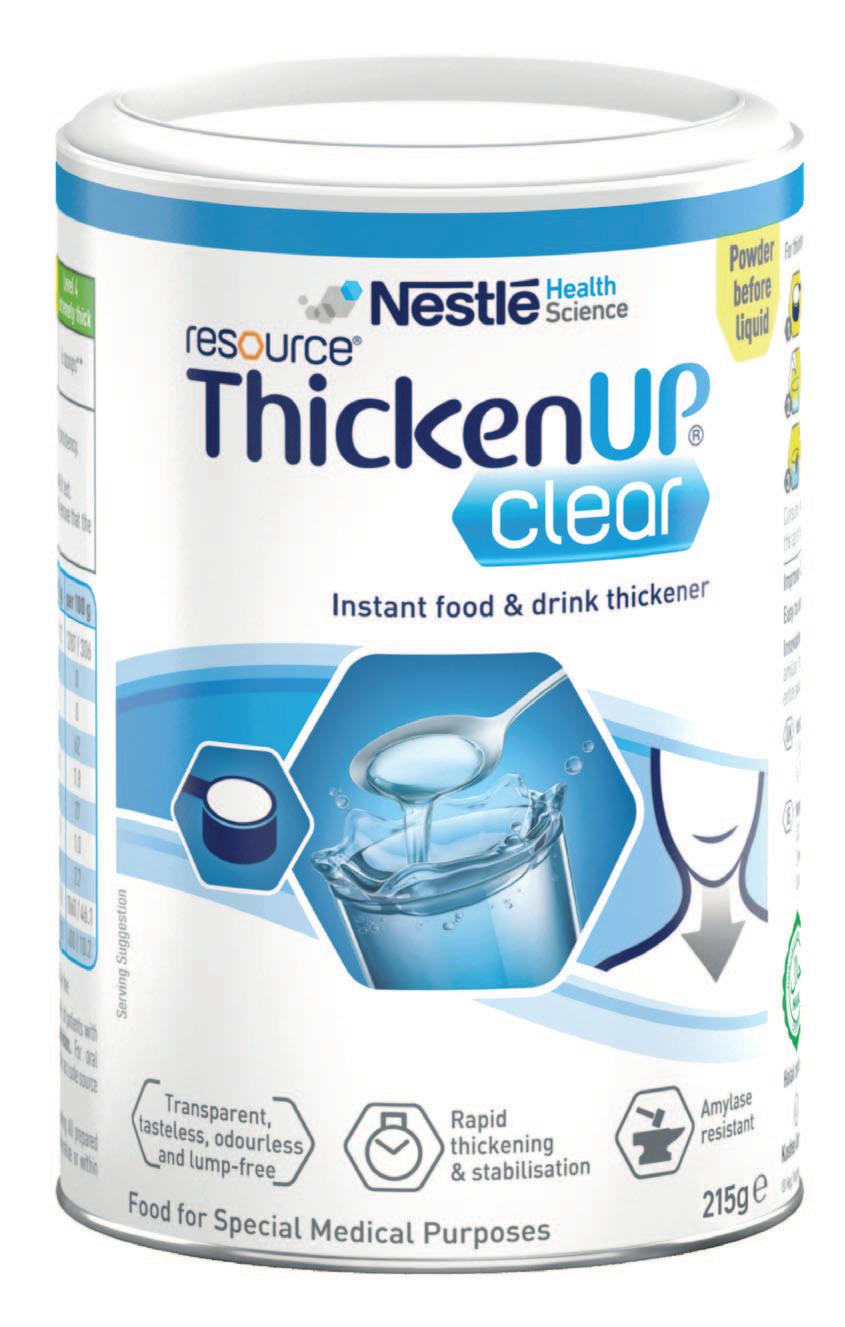
From March 31st, new waste disposal regulations came into effect as part of the Government’s Simpler Recycling initiative.
Designed to reduce waste and increase recycling rates across the country, this has direct and potentially significant implications for the care home and nursing home sector. Anenta, the UK’s leading independent healthcare waste management specialist for the care home sector, explains to issues at hand.
Under the news Simpler Recycling regulations, in addition to segregating clinical waste and offensive waste into separate waste streams, care homes now have a legal duty to separate out all recyclable materials from general waste.

Paper and card, plastic, glass, metal, and food waste all need to be separated and stored in segregated waste collection streams, necessitating larger storage areas, more waste receptacles, and more waste collections.
Although this has implications and associated costs, the new regulations are important because incorrectly disposed waste not only puts a strain on England’s waste capacity – hampering sustainable waste targets – but also significantly adds to the cost of care home waste bills.
FOOD FRUSTRATION
Of all the new waste streams, food waste is likely to be one of the biggest headaches for care homes. That’s because if you produce more than 5kg of food waste per week, you will need to implement a separate food waste disposal system.
Food is a particularly significant form of waste for most care homes as it’s almost impossible to avoid when catering for residents.
In some cases, care homes will have good protocols in place for uneat-
en or waste food, with collections for anaerobic digestion or composting in place. However, for many others this will not be the case, quite simply because it’s always been easier to put waste food into general waste.
And while food waste from canteens or communal eating areas may be relatively easy to collect and recycle, it’s important to remember that a significant amount of other food waste – resulting from items being consumed by both staff and residents in other areas – have the potential to end up in general waste too. Under the new rules that cannot be allowed to happen and that means you now need to make separate food waste bins readily available in public areas.
WHAT IF YOU DON’T COMPLY?
Under the new legislation, if you put food waste into the wrong bins, your supplier will not be permitted to collect them. However, you’ll still be charged, and repeated non-compliance could result in fines or other penalties, which could be as high as £5,000 or more.
To avoid this, you’ll not only need to have sufficient food waste bins in place within your care home, but appropriate training to ensure that all staff are aware of the importance of segregating waste correctly. Here, appropriate signage is also advised to avoid any confusion.
You’ll also need to ensure that food waste collected within your care home – including inedible food parts such as bones, eggshells, fruit and vegetable skins, tea bags and coffee grounds – actually make it into the designated food waste bin for collection.
When you consider that general waste for care homes costs anything between £180 and £250 a tonne, whereas food waste – collected for
Mobile Kitchens Ltd specialises in the hire or sale of temporary catering facilities and foodservice equipment. Ideal for events or to provide temporary catering facilities during your kitchen refurbishment, our versatile units and equipment offer an efficient and economic solution to the caterers’ needs.
Production Kitchens, Preparation Kitchens, Ware-washing Units, Dry Store Units, Cold Rooms and Restaurant Units are available as individual units in their own right or they can be linked together on site to form a complete complex.
Alternatively, we can offer modular, open-plan facilities, usually for larger, longer-term hires.
We offer a free design service, and project management from concept through to delivery and installation on site, plus full technical support throughout the hire period.
The standard specification of our smallest Production Kitchen unit includes a six burner oven range, sala-

anaerobic digestion – costs between £105 to £190 per tonne, it simply doesn’t make sense to continue putting food in your general waste.
Quite apart from avoiding large fines – which could affect your reputation – switching from using the general waste stream for food disposal to anaerobic digestion will save your business anything between 8% and 16%. That’s a saving of £60-£120 per 1,100 litre bin per annum. For care home groups with multiple locations, that’s a saving that soon mounts up.
So, far from being a bad thing financially, the new recycling regulations actually have the potential to bring about long-term cost savings for care homes throughout England. Viewed through that lens switching to segregation makes complete sense.
But it’s not the only benefit. By diverting your food waste from general waste into a separate food waste recycling stream, it can be reprocessed through anaerobic digestion to create organic fertiliser and biogas, helping your business move one step closer to becoming zero-to-landfill and achieving your environmental targets.
This avoids your care home food ending up in landfill where it would release methane, a gas which, according to the UN Environmental Programme, is 80 times more harmful than carbon dioxide
Adopting this process will help to ensure that the correct waste goes into the correct channels, saving your care home money, keeping you compliant, minimising environmental impact, and avoiding inadvertent contamination that could cause issues with your waste collection, leading to extra cost, and stringent action by the authorities.
Far from being feared, the new Simpler Recycling regulations should be embraced, saving your care home money and playing a part in saving the future of the planet.
For guidance and advice on how to meet the Simpler Recycling Workplace Rules, and for information on the best systems to adopt for waste storage and collection, email Anenta at contact@anenta.com or call 033 0122 2143. www.anentawaste.com
mander grill, twin basket fryer, upright fridge, hot cupboard, single bowl sink unit with integral hand wash basin, plus ample power points to plug in Microwaves, Food Processors, Toasters etc. Internal equipment can be interchanged and clients can effectively specify their preferred layout.
We have many tried and tested design layouts and would be pleased to put forward our recommendations for your project.
So if you’re planning a refurbishment or need to cater for an event then why not give us a call and we’ll be happy to provide advice and put forward a competitive proposal.
For further information or to arrange a site visit, email: sales@mk-hire.co.uk or call us on 0345 812 0800, or visit our website: www.mk-hire.co.uk
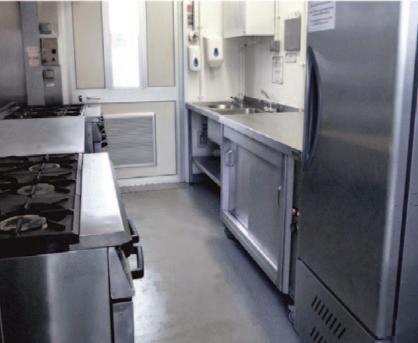
Following the British Dietetic Association’s (BDA) rollout of the Care Home Digest last year, Bidfood, one of the UK’s leading wholesalers, has produced an industry-leading, four-weekly menu cycle, aligned with the Care Home Digest.
Designed to support care operators in implementing the guidelines, the menu cycle offers unrivalled inspiration for Bidfood’s care customers, featuring over 300 Care Home Digest-aligned recipes available for download.
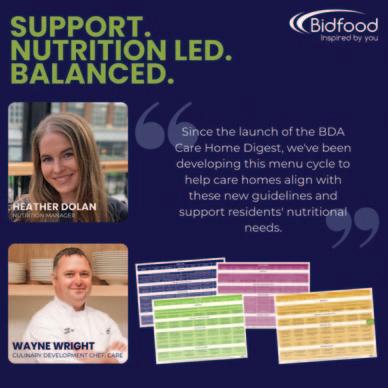
Until last year, healthcare foodservice guidelines were mainly aimed at hospitals, leaving care operators, many of which don’t have access to a dietitian, without tailored resource to support with menu planning.
However, using the new Digest, Bidfood’s expert chef and nutrition team have collaborated to develop this extensive bank of recipes and four-week menu cycle. The cycle demonstrates how operators can align their menus to meet the unique needs and preferences of their individual residents, incorporating food waste tips and a variety of dish types to suit a range of kitchen skill levels.
The menu plan features a balance of food groups including both animal and plant-based proteins, higher-fibre carbohydrates, “healthy” fats and plenty of fruit and vegetables, maximising levels of key nutrients such as protein, fibre and essential vitamins and minerals. The team have also worked hard to reduce sources of saturated fat, free sugars and salt where
possible.
What’s more, every recipe has been nutritionally analysed and adjusted, tweaking both the ingredients used and the quantities, to ensure that nutrition is prioritised whilst also balancing taste, cost and other factors.
Nutrition Manager, Heather Dolan said “At Bidfood we pride ourselves on an evidence-based approach to nutrition, so we were delighted when the BDA’s Care Home Digest was released. We’ve been working on this menu ever since, with the aim of helping care homes to implement the Digest, and ultimately, supporting them in meeting residents’ nutrition and hydration needs.
“It’s been a pleasure collaborating with our healthcare chefs on this project. They’ve brought a wealth of culinary expertise and creative flair to the project. Together, I believe we’ve struck the perfect balance of classic dishes and fresh, innovative concepts.”
To view the four week menu cycle, please visit https://view.bidfood.co.uk/bidfoods-four-weeklymenu-cycle/?page=1
The British Dietetic Association’s Care Home Digest was created to support care homes in developing varied and balanced menus that will tempt residents to eat and drink well, whilst being designed as a toolkit that makes it easy for care operators to dip in and out of chapters as needed. For more information on the Care Home Digest, visit www.bidfood.co.uk/blog/what-you-need-to-knowabout-the-new-bda-care-home-digest/
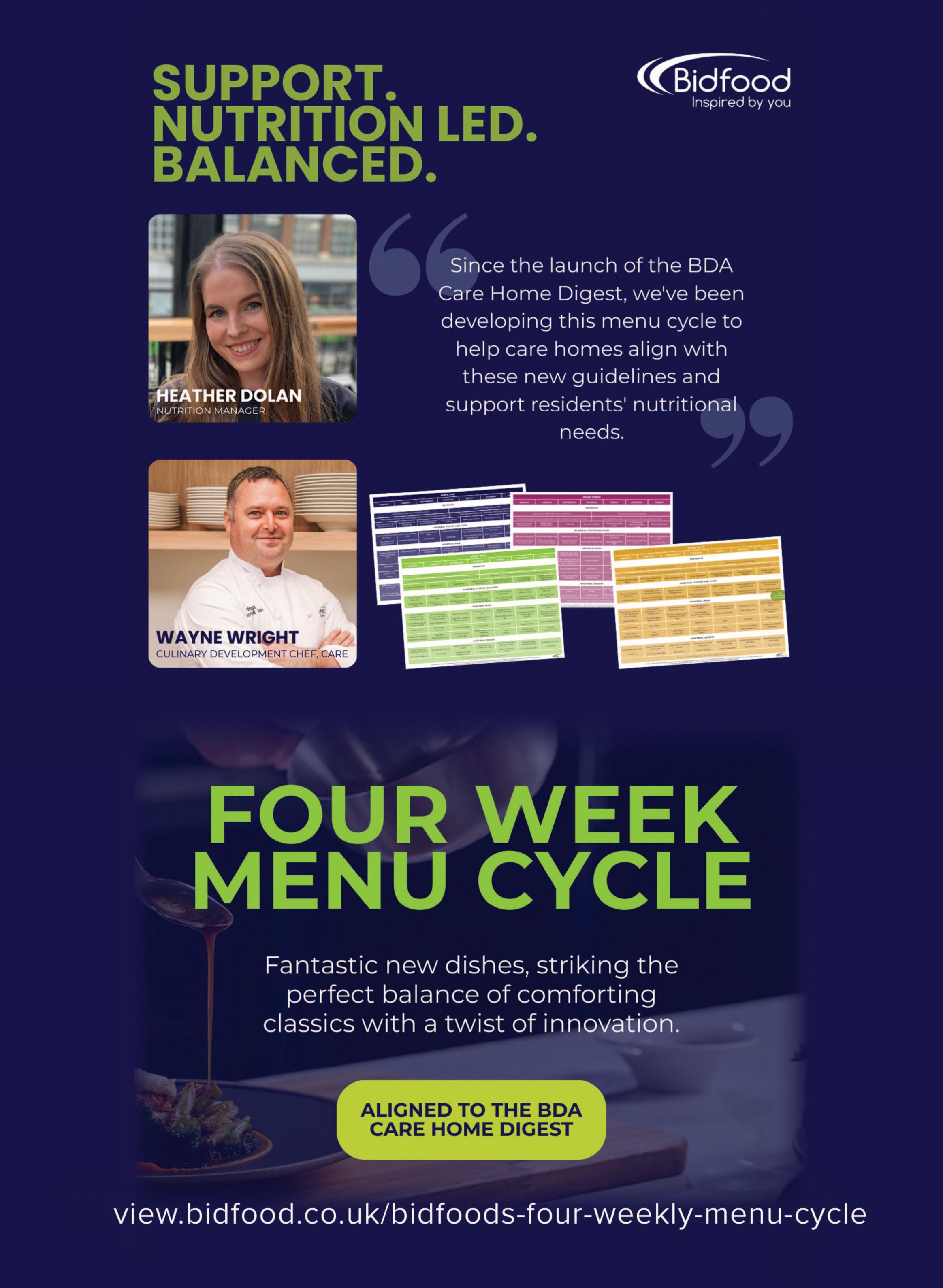
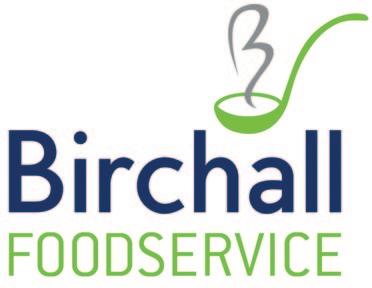
Burnley-based wholesaler and founder Country Range member, Birchall Foodservice, has launched its first-ever Care Home Activity Pack — a 62-page guide designed to support activity coordinators and caterers working within the healthcare sectors.
Recognising the challenges that care home teams face in delivering engaging, enjoyable, and meaningful activities for residents, the pack offers a comprehensive range of creative ideas built around food. Its aim is simple: to spark joy and connection through shared experiences that centre on mealtimes, cultural celebrations, and interactive activities.
At the heart of the pack is a month-by-month events calendar, highlighting key seasonal dates such as Valentine’s Day, Easter, and Remembrance Sunday — each paired with activity suggestions, food ideas, games, and even suggested decorations. These are supported by easy-to-follow recipes and product recommendations.
Popular food-themed games include Biscuit Jenga, Build Your Own Pizza nights, and Food Bingo, which are designed to encourage motor skills, social interaction, and laughter. There's also a "World on a Plate" section, offering immersive cultural experiences for countries including Italy, Mexico, Spain, France, China, and the UK — complete with themed menus, music ideas, and crafts.
To help tackle hydration in fun and engaging ways, the pack features ideas such as mocktail parties, milkshake decorating, and “Guess the Drink” challenges — all designed to improve fluid intake without it feeling like a chore.
Joe Moulton, Marketing Manager at Birchall Foodservice, said: "This pack combines food and fun to help care homes deliver meaningful activities that residents will genuinely enjoy. It’s all about sparking joy through shared experiences, whether that’s a themed afternoon tea or a game of Food Bingo."
The pack has been developed with support from trusted foodservice brands including Albany, Soreen, McVitie’s, Kellogg’s, Lakeland Dairies, and Nestlé. It offers a mix of inspiration and practicality, helping care teams save valuable planning time while delivering enriching experiences. Available now to all Birchall Foodservice customers and care homes across the UK, the pack is free to download.
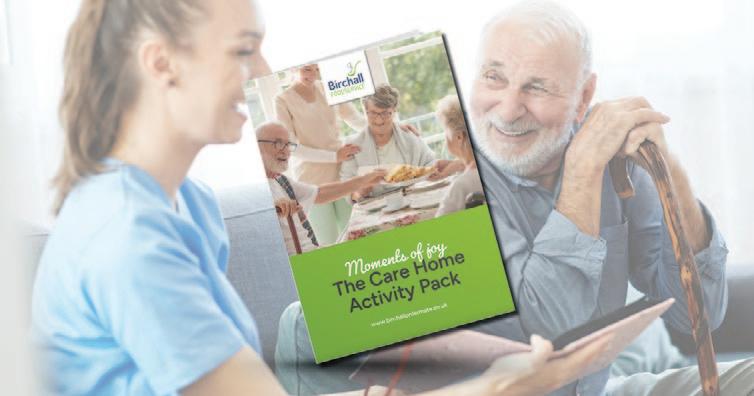
To access the Care Home Activity Pack, visit: www.birchallfoodservice.co.uk/resources or get in touch with the Birchall team by calling 01282 429446.
Jelly Drops (backed by the Alzheimer's Society through their Innovation Accelerator programme) have announced a new 288 pot ‘bulk’ pack for the care sector allowing care homes and in-home agencies to buy in bulk at a reduced rate, ahead of the anticipated warmer summer weather. These award-winning water sweets with added electrolytes boost hydration for people living with dementia and others that struggle to adequately hydrate. By eating two to three pots of Jelly Drops throughout the day, residents with hydration challenges can easily top up their fluid intake in a dignified and independent way.
Dehydration is a common challenge for people living with dementia and aspects like memory problems, potential lack of dexterity and/or avoiding drinks due to fear of incontinence or confusion about where
the toilet is, can all make individuals more susceptible to the dangers of dehydration. Conversely, being well hydrated supports brain function, reduces the risk of urinary tract infections (UTI’s) and unnecessary hospital visits. Even mild dehydration can significantly impact an individual’s wellbeing when they are already dealing with cognitive challenges like dementia.
Jelly Drops have supported over 100,000 families since being developed by Lewis Hornby for his late Grandma Pat who struggled with staying hydrated whilst living with dementia.
If you are interested in learning more about the 288 pot ‘bulk’ case of Jelly Drops to support hydration for your residents or clients,, please contact hello@jellydrops.com or visit www.jellydrops.com

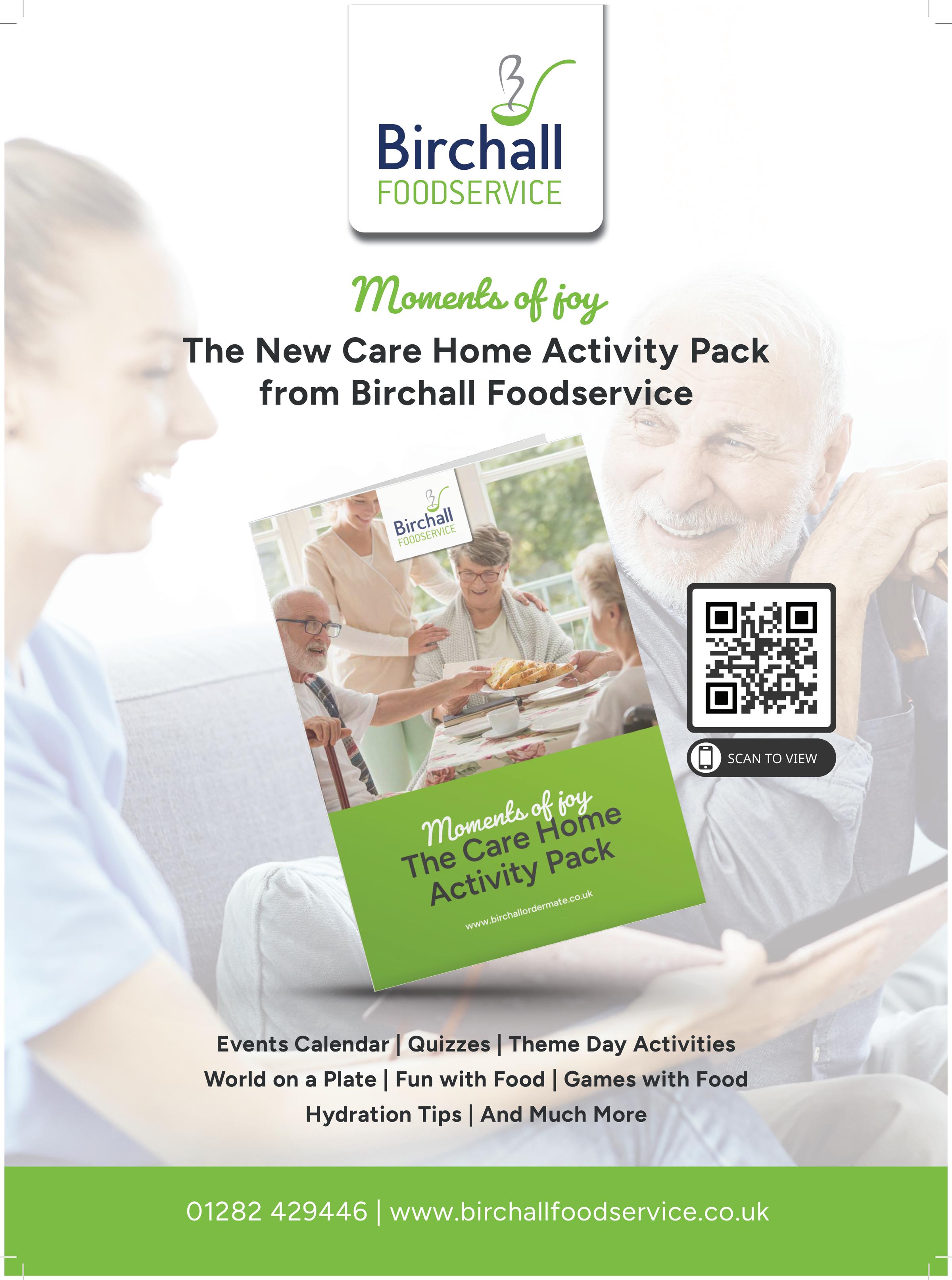
The Treat-Eezi full length pressure relieving mattress overlay (very high risk to stage 4 pressure ulcers) is designed to be laid on top of mattresses. It naturally and gently moves with the patient creating an almost zero chafing area allowing the patient a silent, comfortable sleep along with the assurance any pressure sores present are given the best possible chance to breathe and heal.
Quotations available via checkout.
£241.40p (Exclusive of VAT)
PRODUCT BENEFITS

• Precision Relief: Using advanced 3D pressure sensor mapping, our pressure-relieving mattress overlays provide targeted relief by accurately identifying pressure points, ensuring optimal support for patients.
• Pressure Relief: Our unique 4-layer pressure-relieving mattress overlays offer unique pressure sore prevention, trusted by over 10,000 medical professionals since 2016.
• Sleep Benefits: No noisy pump systems; our static solution guarantees a peaceful sleep environment, free from disruptions or maintenance hassles and allows the patient to sleep with their partner.
• Breathability: Enhanced breathability ensures optimal airflow for keeping patients comfortable and cool.
• Endorsements and Warranty: Backed by endorsements from NHS community services and a full two-year warranty.
• Easy Application: Our pressure-relieving mattress overlays have easy-to-follow instructions.
WHO IS IT FOR
The Treat-Eezi full-length pressure relieving mattress overlay is ideal for individuals who spend prolonged periods in bed or seated, including:
• Elderly individuals with limited mobility
• Patients recovering from surgery or injury
• Those at risk of developing pressure sores
• Caregivers looking to enhance comfort for their loved
ones
Sales/General Inquiries: 0208 133 2851 www.danmedicasouth.co.uk
See the advert on page 11 for more information.
At Novamed, we understand the daily challenges that incontinence brings.
With that in mind, our specialist team, which includes a retired NHS continence nurse, have developed a premium product range designed to give users comfort, protection, and dignity, as well as being manufactured to ISO 13485 quality standards. Our comprehensive incontinence care solutions include: All-in-one (slips) for moderate to heavy use Pull-up pants for light to moderate needs Disposable underpads to protect beds and furniture
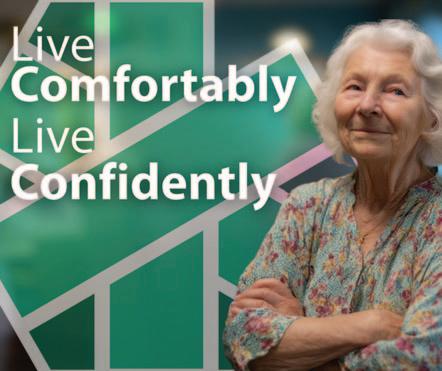
• Biodegradable bamboo pads for light protection with an eco-conscious approach Each product provides skin-friendliness, odour
control, and ease of use. With consistent quality and comfort, Novamed are trusted by care professionals across the UK. Our Devon-based warehouse ensures fast, discreet delivery throughout the country. We offer free samples to help you assess the best fit. Novamed products are also trusted internationally, with distribution in Gibraltar, Montenegro, the Middle East, and Europe. For continence care you can depend on, contact Novamed today to learn more or request your free samples 0808 196 2070 www.novamedpads.co.uk info@novamedeurope.com
See the advert on page 4 for details.
CareZips® Classic are patented, easy dressing unisex adaptive pants designed for older and disabled people suffering with problems associated with continence, mobility, mental function and cognition. Suitable for persons living in care institutions, receiving care at home or living independently at home, CareZips® Classic enable people to dress themselves or with assistance from carers.
CareZips® Classic feature patented 3-zipper system, which opens the front of the pants from the waist to the knees for quicker access during toileting, continence pads changes and personal hygiene.

The forward positioning of the two side zippers lessens pressure on sensitive hip areas, helping to eliminate discomfort. The third zipper facilitates simple full frontal opening for faster more dignified diaper changes, catheter adjustments, personal cleansing and hygiene routines.
CareZips® Classic have many benefits for the older and disabled users and their carers:
• People dressing themselves enjoy the practical
Based in Derbyshire, we’re a family-run business with over 30 years of experience committed to helping care homes create safe, welcoming outdoor spaces for residents, staff and visitors.
We offer a wide range of garden furniture, including benches, companion seats, dining sets, picnic tables and planters, all crafted to be strong, durable and splinter-free. Unlike traditional timber, our furniture won’t rot, warp, or require painting, making it a low-maintenance, long-term solution for care environments.
Our products support the circular economy by transforming waste plastic into something both functional and stylish. Each piece is made here in the UK and built to withstand all weathers, year after year. In recognition of our sustainable practices, we’ve been awarded the King’s Award for Enterprise in Sustainable Development. Here’s what Darley Hall Care Home had to say
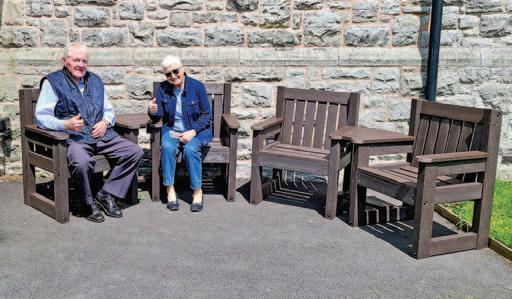
Watch your resident's eyes light up when the trolley arrives! Euroservice trolleys can also be used as a vending trolley or to sell personal care products to residents. How about a delicious snack/pastry trolley or even a drinks trolley for that afternoon tipple? Your lovely trolley could do so much for you and your residents! Visit the website at www.euroservice-uk.com to see the full range.
Or see the advert on page 13.

Angloplas are a UK manufacturer who specialise in producing dispensers for the health and hygiene industry. Although these are designed to keep the workplace tidy and uncluttered they are, more importantly, built knowing the control of healthcare-associated infections (HCAIs) are a priority for healthcare providers, and who are employing a combination of infection prevention and control strategies, including hand hygiene, cleaning, training and the adoption of new technologies, to tackle the problem.

As a result, a wide range of infection control products and technologies are emerging on the market, including antimicrobial technology. Angloplas’ range of dispensers are produced in the world’s first
proven Antimicrobial PVC with silver ion technology and which is exclusive to Angloplas. This helps reduce the risk of cross infection by stopping the growth of bacteria and mould and works continuously for the lifetime of the product, reducing levels of bacteria such as MRSA, E Coli, Legionella, Salmonella and mould by up to 99.99%.
For non-clinical environments Angloplas has recently launched its new Budget Range of products which are made to the same exacting standards as the antimicrobial protected ones but with lower price tags.
You can order Angloplas products directly from its website at www.angloplas.co.uk
See the advert on page 9.
functionality and versatility of the CareZips® Classic, all day comfort and easy garment care.
• People dependent on assisted dressing appreciate quick easy dressing process with less stress, embarrassment and greater dignity offered by CareZips® Classic.
• CareZips® Classic offer practical gains to the carers, helping them to provide better care, whilst reducing physical efforts and saving valuable time.
CareZips® Classic are unisex, available in 6 sizes and 3 practical colours (i.e. black, charcoal and navy). Tapered fit at the ankles gives a tidy appearance. Made from breathable moisture-wicking 4-way stretchy crease-free and easycare durable fabric, CareZips® Classic are comfortable, practical and conveniently functional. For more information, contact Win Health Medical Ltd - 01835 864866www.win-health.com
See the advert on page 3 for further information on Win Health’s product range.
Since our founding in 2010, Activities to Share has been dedicated to enhancing the lives of those in care by providing thoughtfully designed activity products. Our mission is to support activity coordinators in delivering uplifting, engaging experiences that foster connection, joy, and well-being.
We achieve this by listening closely to your feedback and evolving with your needs. Whether over the phone, via email, WhatsApp, or Live Chat on our website, our team is always ready to offer advice and help you find just the right products to bring your ideas to life.

While we embrace the convenience of technology to expand our resources and share knowledge, we remain firm believers in the irreplaceable power of sensory engagement. That’s why we continue to
make our Reminiscence Kits and Sensory Bags with real, tactile items that stimulate the senses. Some experiences— like popping bubbles for the splash, breathing in a familiar scent, or piecing together a puzzle with others—simply can’t be replicated on a screen. These sensory moments are invaluable in encouraging storytelling, sparking memories, and fostering conversation. Our values remain rooted in this commitment to meaningful connection. We’re here to partner with you—the professionals on the front lines of care—to create a sense of structure, well-being, and fun for those who need it most.
for your activity diary
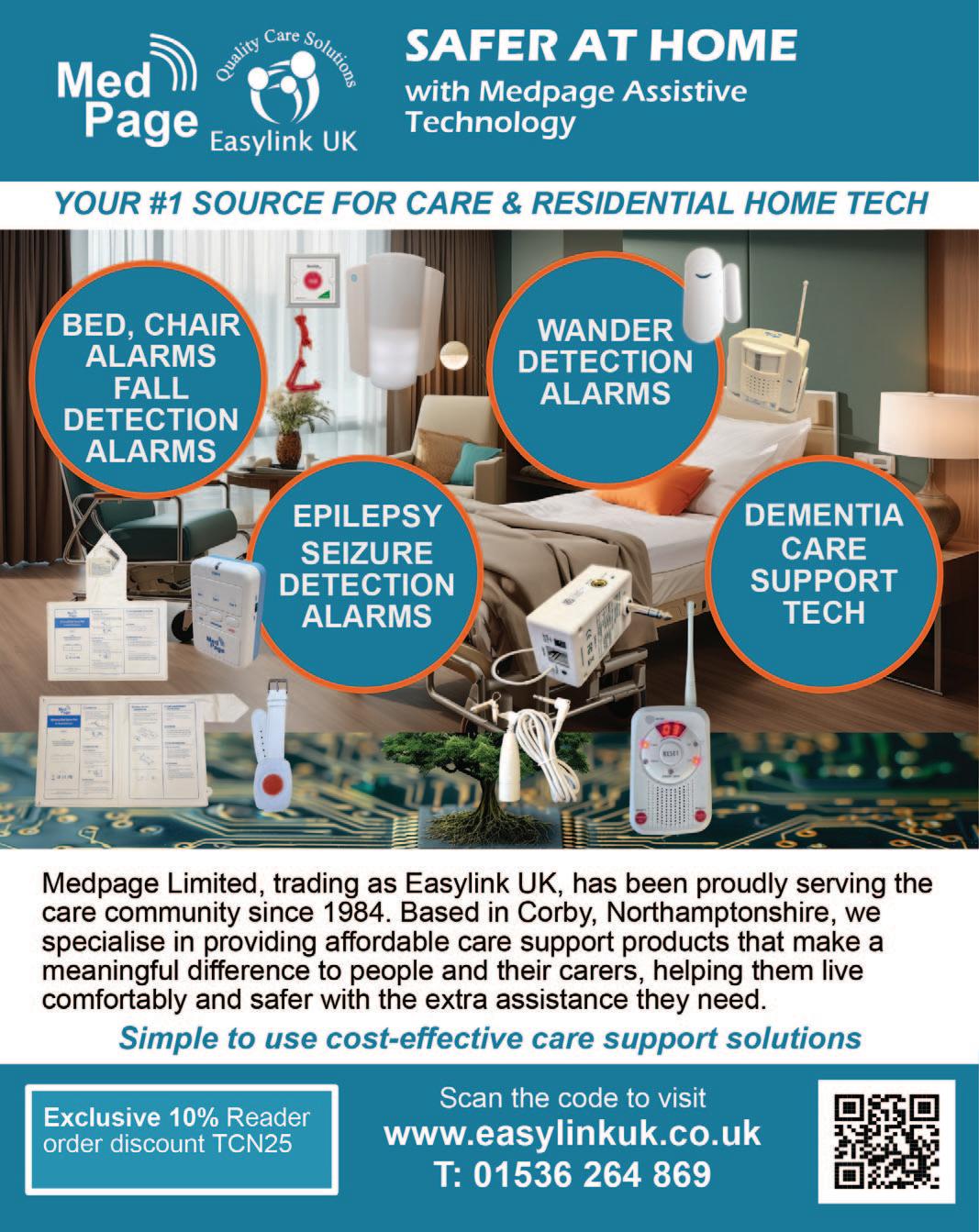
In the evolving landscape of residential and nursing home care, technology now plays an increasingly pivotal role in enhancing said patient safety, staff responsiveness, and overall operational efficiency.
One of the most critical technologies at the heart of this transformation is the nurse call monitoring system. These systems serve as the backbone of communication between residents and care staff, and their importance cannot be overstated in delivering timely and effective care.

UNDERSTANDING NURSE CALL MONITORING SYSTEMS
A nurse call system enables residents to quickly and easily summon assistance. However, modern systems have evolved far beyond simple buzzers. Today, care facilities can choose from wireless, integrated, and modular systems—each designed to meet different operational needs, with modern solutions now connecting with fall detection sensors, electronic patient records (EPR), and mobile caregiver apps. This integration not only streamlines workflows but also helps care homes meet Care Quality Commission (CQC) compliance requirements while delivering faster, more personalised care.
Wireless Systems are ideal for facilities seeking flexibility and ease of installation. Without the need for extensive cabling, these systems can be deployed rapidly and expanded as needed.
Integrated Systems tie into a facility’s broader infrastructure—such as fire alarms, CCTV, and building management systems—allowing for a holistic response to emergencies and enhanced safety protocols.
Modular Systems provide a customisable solution, enabling care homes to scale up or down based on the size of the facility or changing care requirements.
The implementation of an advanced nurse call monitoring system delivers measurable benefits across multiple areas:
• Improved Staff Efficiency: With real-time alerts and data analytics, care teams can streamline workflows and focus attention where it’s most needed, reducing unnecessary checks and overlaps.
• Enhanced Patient Safety: Immediate access to assistance reduces the risk of falls, unattended health episodes, and delayed medication administration.
• Greater Resident Satisfaction: Prompt responses foster a sense of security and dignity among residents, improving their overall experience.
Operational Cost Savings: Efficient use of staff resources and reduced emergency incidents contribute to long-term financial sustainability for care providers.
As regulatory expectations and resident needs continue to rise, nurse call monitoring systems are no longer a luxury but a necessity. They not only support compliance with Care Quality Commission (CQC) standards but also set the tone for a culture of responsive, resident-centred care.
Implementing a nurse call system offers numerous benefits, including improved communication, enhanced safety, increased staff efficiency, better resource allocation, and improved documentation. These advantages contribute to a higher quality of care, improved patient/resident satisfaction, and a more efficient and effective healthcare environment
Investing in the right system requires careful evaluation of a care home’s size, staffing levels, and longterm care strategy. However, the return on investment—in terms of safety, efficiency, and satisfaction—makes it one of the most impactful upgrades a care home can undertake.
In today’s care environment, technology must work in harmony with human compassion.
Nurse call monitoring systems exemplify this synergy, serving as a quiet but powerful ally in the mission to deliver safe, dignified, and effective care.

Technology has made people more connected with the world around them and the revolution in assistive care devices has made it possible for the elderly to spend their last years in a comfortable and familiar environment. These devices have also made it easier for home carers to provide quality care for their loved ones while managing their own lives. They allow you to care for your elderly whether they are travelling in the city for errands, staying alone at home, or staying in the same home as you. They are also helping nursing homes provide better care for them with discrete monitoring and quick responses to emergencies.

If you’re looking for these kinds of assistive care devices for your loved ones or nursing home, Frequency Precision produce some of the best systems available to help you with elderly care and mobility monitoring, ranging from bed, chair and floor sensor mats through fall monitoring and GPS tracking to fully integrated nurse call plug or wireless systems.
Phone: 01837 810590
Email: contact@frequencyprecision.com
Website: www.frequencyprecision.com
Blaucomm’s Nurse Call Messaging Service (NMS) is the market leading solution to remove the dependency on noisy nurse call panels and pagers, through its intelligent software, which delivers the alerts straight to the care staff who need them.
Care homes are rapidly introducing smartphones for digital care planning and eMar - now, the same devices can be used to receive the nurse call alerts they need for the residents under their care.
Furthermore, Blaucomm NMS is deeply linked into Person Centred Software MCM, so call bell data is linked straight to care plans. This unlocks a huge benefit to care homes to enhance the staff performance with how they accept and respond to residents, which ultimate-
ly promotes better response times and visibility for management to audit their performance.
The best part is that Blaucomm NMS links into your existing nurse call system - we work with all major brands such as Aidcall, ARM, Courtney Thorne, C-TEC, ENS, Intercall, Medicare, SAS and TeleAlarm.
Care operators are constantly recognising Blaucomm NMS for its reliability and dependability to their care operations, which is why we’ve been chosen time and time again over other solutions.
Head of IT Trudi Harrow at WCS Care had this to say about Blaucomm NMS:
“We find Blaucomm is a genuinely fantastic company with a reliable product.
"We would highly recommend this to anybody who wants to replace expensive pagers and silence those annoyingly loud nurse call screens!” To find out more about Blaucomm NMS, visit www.blaucomm.co.uk/healthcare
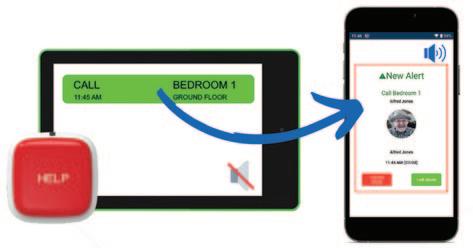
Fall Savers®, are an experienced market leading healthcare provider of resident safety solutions for over 15 years.
FALL SAVERS ® WIRELESS MONITOR
Eliminate all cables with our new generation falls management solutions!
Upgrade your falls programme with the latest technology from Fall Savers®. The NEW Fall Savers® Wireless eliminates the cord between the monitor and sensor pad. This results in less work for nursing staff, improved safety for patients and reduced wear and tear on sensor pads. Wireless advantages include the ability to use one monitor with two sensor pads simultaneously and support for many new wireless devices. BENEFITS INCLUDE:
Safer for patients; less work for staff

Bed and chair pads available
One monitor works with two sensor pads
Integrates with most nurse call systems
A variety of options, including: Call button
sensor mat Wireless door/window exit alerts TREADNOUGHT ®FLOOR SENSOR PAD
The TreadNought® Floor Sensor Pad is built to last with a durable construction that far out lasts the competition. Our anti-bacterial floor sensor pad is compatible with most nurse call systems or can be used with a portable pager to sound an alert when a person steps on to the sensor pad. Caregivers typically place the sensor
pad at the bedside, in a doorway or other locations to monitor persons at risk for falls or wandering. An optional anti-slip mesh reduces the potential for slippage on hard surface floors.
FEATURES INCLUDE:
Connects directly to most nurse call systems
High Quality anti-bacterial Floor Sensor Pad
Large Size Pad: Measures (L) 91cm x (H) 61cm
Options (sold separately): Anti-slip mesh for hard surface floors

See the advert on this page for further details or visit www.fallsavers.co.uk.
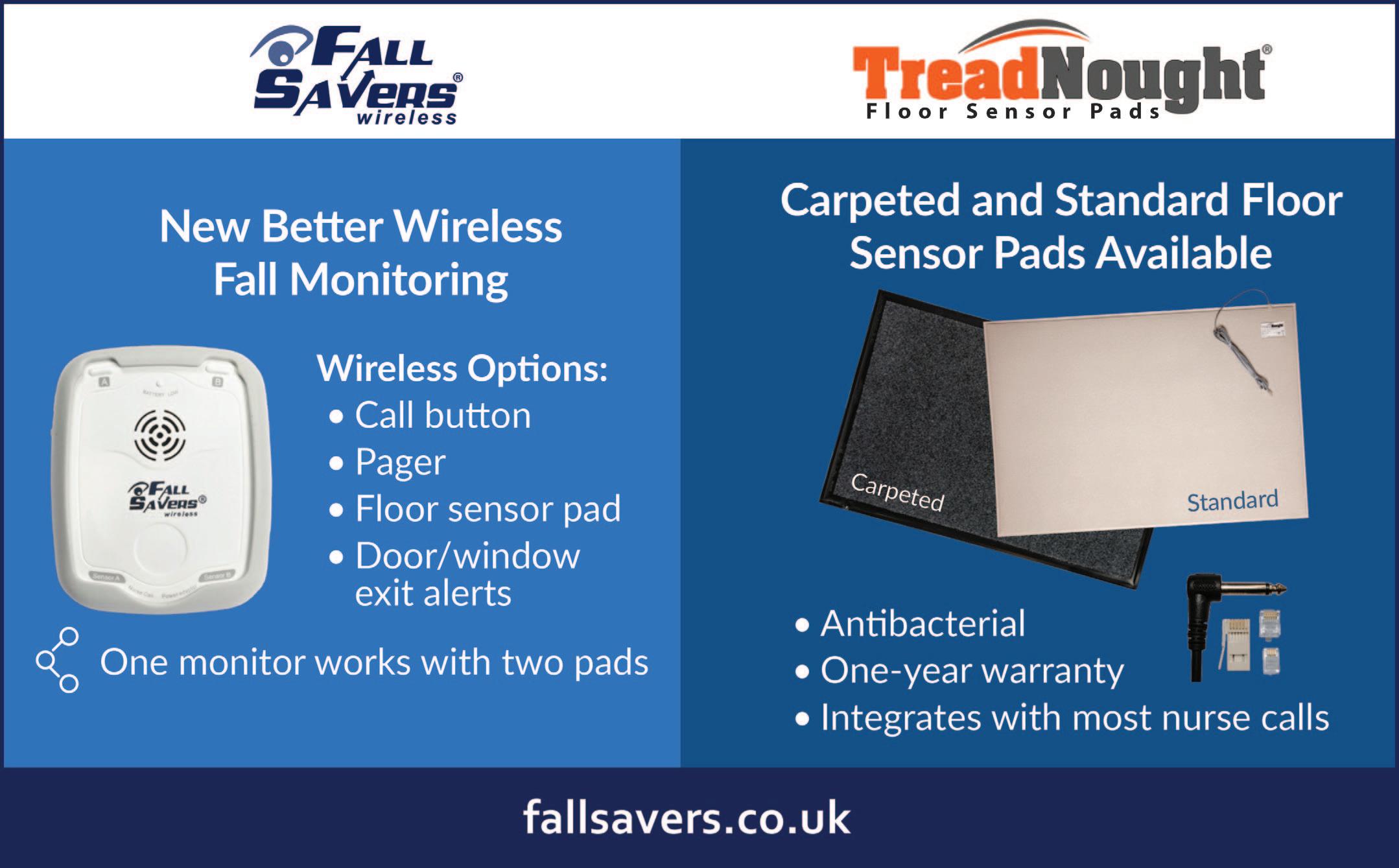
Falls are a significant concern for vulnerable individuals, especially seniors and patients at risk. Medpage, a leader in assistive technology, offers a range of cuttingedge products designed to enhance safety and provide peace of mind for caregivers and families. Here’s an in-depth look at some of their standout solutions:
MPRCG1 (2023) BED LEAVING DETECTION ALARM WITH CAREGIVER RADIO PAGER
The MPRCG1 is a comprehensive system tailored for fall prevention in domestic, commercial, and NHS care settings. This all-inclusive kit includes a bed pressure mat sensor, a BTX21-MP alarm sensor transmitter, and an MP-PAG31 radio pager. The system is designed to alert caregivers when a patient leaves their bed, reducing the risk of falls. Key features include:
Wireless Alerts: Notifications are sent to the caregiver’s pager via tone or vibration.
Customizable Alarm Delays: Options for instant, 15-minute, or 30-minute delays.
Durable Design: Antimicrobial and disinfectant-resistant materials ensure longevity.
• Ease of Use: Minimal installation required, making it user-friendly and portable.
HDKMB2 HOSPITAL DISCHARGE KIT FOR FALLS RISK PATIENTS

monitoring capabilities of healthcare facilities. Its versatility makes it a valuable addition to any care environment, ensuring timely responses to patient needs.
RON-WC2 WATERPROOF DISABLED PULL CORD ALARM TRANSMITTER WITH WIRELESS ALARM RECEIVER
The RON-WC2 is a robust solution for disabled individuals requiring immediate assistance. This waterproof pull cord alarm is ideal for use in bathrooms and other high-risk areas. Paired with a wireless alarm receiver, it ensures that help is just a pull away.
Features include:
Waterproof Design: Suitable for wet environments.
Wireless Connectivity: Reliable transmission to the alarm receiver.
Ease of Installation: Simple setup for quick deployment.
WHY CHOOSE MEDPAGE?
Medpage’s commitment to innovation and quality is evident in their product range. Each solution is designed with the user’s safety and convenience in mind, making them a trusted choice for caregivers and healthcare providers alike.
The HDKMB2 is a thoughtfully curated kit aimed at supporting patients transitioning from hospital to home care. It includes essential tools to mitigate fall risks and promote recovery. This kit is ideal for caregivers seeking a comprehensive solution to enhance patient safety during the critical post-discharge period.
CMEX-21 MULTI-PORT WIRELESS SENSOR INPUT EXPANDER FOR NURSE CALL CONNECTION
The CMEX-21 is Medpage’s latest innovation, designed to integrate seamlessly with existing nurse call systems. This multi-port expander allows for the connection of multiple wireless sensors, enhancing the
By investing in these advanced fall prevention tools, families and facilities can create safer environments for those at risk. Medpage continues to lead the way in providing practical, reliable solutions that make a real difference.
For more information, visit Medpage’s official website or contact their team to explore these products further. Safety starts with the right tools, and Medpage delivers just that. www.easylinkuk.co.uk
T: 01536 264 869
Courtney Thorne, a long-standing innovator in healthcare communication systems, is setting new standards in the care home sector with its advanced wireless nurse call technology—designed to improve resident safety, enhance staff efficiency, and support a more responsive care environment.
With over 30 years of experience serving the UK healthcare market, Courtney Thorne’s systems are now trusted by thousands of care homes nationwide. Unlike traditional hardwired solutions, their wireless nurse call systems offer non-invasive installation, scalability, and smart analytics—making them ideal for both new builds and retrofit projects.
“At the heart of our technology is the belief that better communication leads to better care,” says Graham Vickrage, Managing Director at Courtney Thorne. “Our wireless systems not only reduce response times but also empower staff
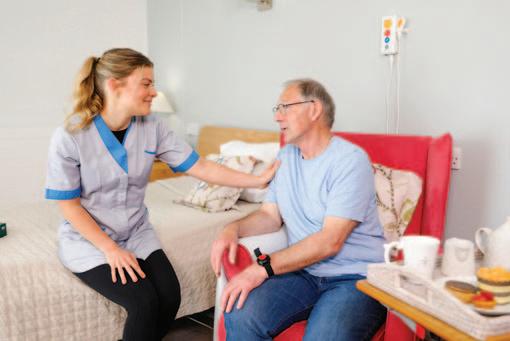
with the tools they need to deliver safe, person-centred care.”
Care providers are increasingly choosing wireless systems for their flexibility, reliability, and cost-effectiveness. With a full suite of accessories—including neck pendants, door monitors, fall detection, and bed sensors—Courtney Thorne systems can be tailored to meet the specific needs of each home and resident.
In an industry where compliance, safety, and staff pressures are always front of mind, Courtney Thorne provides more than just products—they offer ongoing support, training, and a commitment to innovation that helps care homes futureproof their operations.
For more information or to book a free demo, visit www.c-t.co.uk or contact info@c-t.co.uk.
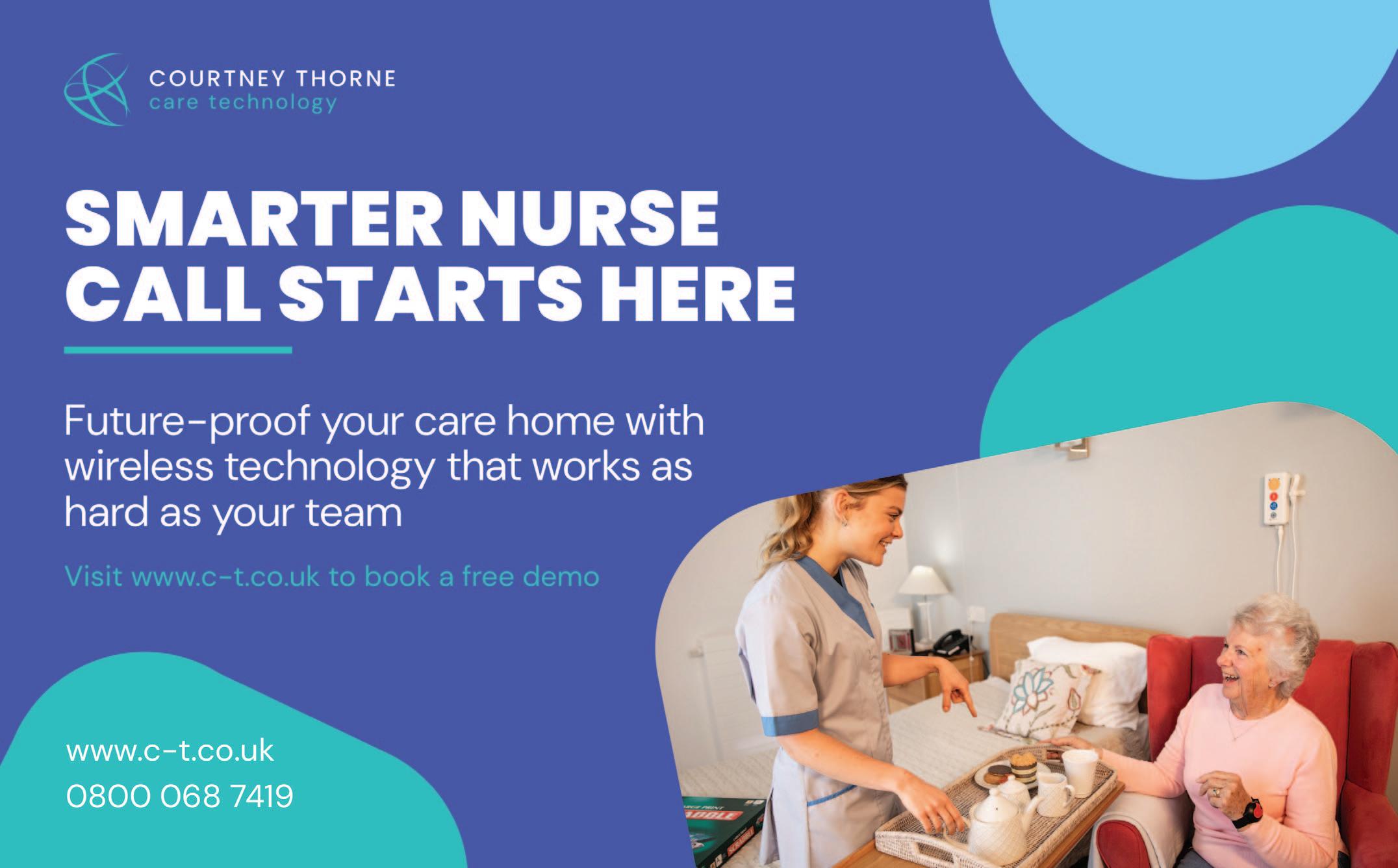

The social care sector is under increasing pressure. Tightening regulations, financial strain and staff shortages are leading providers to rethink their approach.
In response, PASS by everyLIFE has launched PASSgenius™, a transformative suite of AI, data and automation tools built directly into its award-winning care management software. This innovation is set to revolutionise how care businesses operate, making it easier to deliver safe, person-centred care while driving efficiency.
At its core, PASSgenius™ is built to simplify complex roster and care data and quickly turn it into actionable insights, like when your next staffing gap is, concerning changes in customer wellbeing, and what routes can be optimised to reduce travel times.
Care operators already hold great amounts of information, and through this new suite they can leverage its full power to make smarter, faster decisions to run a better, more efficient care business.
One of the standout features of PASSgenius™ is its AI-powered care note summaries. This tool can scan weeks of care logs in seconds, highlighting crucial changes in a client's health or behaviour. It enables care teams to identify potential risks earlier and act swiftly. Instead of manually combing through records, users get concise summaries and smart recommendations, ensuring more efficient and responsive care. This not only promotes continuity of care between shifts but also provides care staff and clients with an enhanced experience.
REAL-TIME OVERSIGHT AT YOUR FINGERTIPS
At the heart of PASSgenius™ is the Dashboard, a fully interactive and customisable tool that gives managers real-time oversight across key performance areas. Whether it's tracking required care hours, spotting gaps in rosters, managing unassigned visits, or monitoring travel time and punctuality, this feature makes it easy to stay on top of the daily demands of care management. With live data in one view, managers can address issues immediately, without the need for multiple systems or spreadsheets.
STREAMLINING ADMINISTRATIVE TASKS
The social care sector has come a long way when it comes to digital transformation, and artificial intelligence (AI) is a big part of its future. While AI is still finding its place in many care settings, the impact it can have is huge.
Here’s a closer look at why AI is set to make waves in social care:
1. BOOSTING EFFICIENCY
AI can help handle those resource-draining tasks in seconds. Whether it’s crunching a mountain of data, summarising care notes, or suggesting next steps, it frees up your team to do what they do best.
It can also improve communication, such as helping new team members quickly access policies or answer routine questions without waiting for assistance. By handling these background tasks, AI allows organisations to redirect resources to other core priorities.
2. ENSURING PERSON-CENTRED CARE
AI can support your teams when providing persona-centred care by analysing data over time, so they can build tailored plans that align with each individual’s goals, preferences, and abilities. It can even predict future needs, flagging issues before they arise so your
team can act proactively.
3. ENHANCED MONITORING
Care organisations often operate round-the-clock, and AI can offer real-time monitoring to support this. For example, AI can highlight subtle behavioural changes, like someone sleeping poorly or becoming more withdrawn. These insights can alert your teams to potential concerns early, which means better, faster decisions can be made to support your clients.
For organisations, this level of tracking ensures care quality stays high, without adding to the workload. It’s like having an extra layer of support that’s always on duty.
4. EMPOWERING TEAMS
AI is here to help empower your care teams, not replace them. AI tools can provide instant recommendations or resources, which could help your newer employees confidently manage unexpected situations. Similarly, AI can assist with summarising care notes or giving quick access to up-to-date best practices, helping your teams provide the high-quality care they work so hard to deliver.
5. OPTIMISING COSTS


Beyond care delivery, the feature also includes a suite of automation tools that help with time-consuming tasks such as payroll calculations, invoicing and timesheet verification. In-built reminders and alerts help keep teams on top of compliance, while automated workflows reduce paperwork and improve consistency across the board. This reduces paperwork and administrative burden, freeing up time for what really matters – providing the best care possible.
A PLATFORM THAT EVOLVES WITH YOU
PASSgenius™ is built directly within the PASS platform, eliminating the need for additional software or bolt-ons. This powerful suite is available at no extra cost to existing All-in-one PASS users, with new features and updates set for release throughout 2025.
Duncan Campbell, Commercial Director at PASS by everyLIFE, said: “PASSgenius™ is more than just a feature update – it’s a transformative shift in how care services operate. By combining live data, automation and AI, we are providing care teams with the tools they need to run stronger, more efficient services.”
For more information and to see PASSgenius™ in action, visit www.everylifetechnologies.com/passgenius.
One of the big wins of AI is its ability to do more with less. By automating tasks and making resource allocation more efficient, it can help organisations manage tight budgets without compromising on care.
AI can even help reduce staff turnover by easing workload pressures, which means savings on recruitment and training costs too. Plus, because AI solutions are scalable, it can adapt to your organisation's needs.
THE FUTURE OF AI IN CARE

AI in social care isn’t about replacing people with tech. It’s about giving your teams the time, insights, and tools they need to focus on the people they care for. That’s why OneAdvanced AI, the first UK hosted fully secure, private AI tool for businesses, was created. OneAdvanced AI can help care providers improve efficiency, deliver person-centred care, and empower teams, all while safeguarding your data. This marks a significant step towards a more innovative and sustainable future in social care.
Find out more at: www.oneadvanced.com/ai
See the advert on the back cover of this issue for further info.


People with dementia can enjoy productive and rewarding working lives in the digital era, contrary to the widespread stereotype that dementia is incompatible with the use of modern technology, according to new research from the University of Bath.
The study - Working lives with dementia: A digital futures perspective – argues that the digital revolution risks exacerbating inequalities amongst those with diverse needs but that organisations can and should develop, adapt and deploy digital technology and the working environment to help those with dementia to continue in employment.
“The bottom line is that we have an ageing population and workforce in which dementia will feature and which should, and can be, accommodated by the judicious use of digital technology and adapting working conditions. The reality is, this is not dealt with in any meaningful way right now – there are very rarely strategies in place,” said Dr James Fletcher of the University of Bath School of Management.
“There is widespread prejudice that those with dementia cannot cope with, or benefit from, digital technology, and they often get bundled into the same category as the oldest people. But it’s worth putting some perspective on this – an experienced 60-year-old employee with early stage dementia will have grown up through the digital, internet and social media revolutions – and with the right support, they will still have much to offer,” Dr Fletcher said.
The study was published as the UK government announced its welfare reform plans, part of which is to encourage more disabled people into work. Dr Fletcher said he hoped the research could be a useful example of the prospects and challenges of fulfilling that goal.
Dr Fletcher noted that quite simple adjustments to the working environment, such as improving workstation lighting, using appropriate fonts and colour schemes, and providing workers with calendars, voice activated controls, and automatic reminders could make a big difference for somebody diagnosed with dementia.
“And AI offers really interesting opportunities – it is superb at solving many of the problems faced by those with dementia, such as finding words, organising text and putting words in the right sequence. Couple that with the potential offered by hybrid working for those with dementia, and you can see the benefits for both employees and companies,” he said.
Dr Fletcher and his co-researcher Dr Olivia Brown argue that dementia is not inherently disabling and that its impact depends heavily on the environment and surroundings in which an employee is operating. Employers might consider, for example, that an employee with dementia may be able to access a building with a swipe card but may be foiled if access relies on codes that they have to remember.
“We need to approach this in the way we already respond to people with diverse needs, which is already familiar to most employees. Also, there is a misplaced tendency to see a dementia diagnosis in black and white terms when the reality is, the effects can vary day-to-day and hour-to-hour depending on environment and relationships,” Dr Brown said.
Dr Fletcher said that employees could suffer tremendous stress from a dementia diagnosis and disclosing this to their employer, with some developing strategies to conceal their condition. He said that, while we lack good statistics, it appears that the ‘vast majority’ of those diagnosed with dementia go into unemployment, often unwillingly.
“There are many who could stay in the workforce and don’t. And this is not just an issue for older people –growing numbers of younger people are being diagnosed,” he said.
The researchers noted that dementia is often considered to be a post-retirement phenomenon, but estimates suggest that 9% of the 35.6 million people worldwide with dementia are under 65 years of age, with around 370,000 new cases of young onset dementia annually.
Technology is a key part of the CQC’s improvement agenda; especially when it comes to how care services record performance during inspections.
THE PROBLEM
Many care providers want to move away from pen and paper-based audits and spreadsheets, but most software lacks the capability and flexibility to handle the complexity of the CQC requirements and ratings structure – leading to gaps in oversight and accountability.
THE SOLUTION
Drawing on our experience providing CQC improvement support, we developed an easy-to-use care audit platform designed to help care providers stay on top of their compliance obligations with the user in mind and the CQC framework at its core.

Our Enterprise Care Audit Tool enables care providers to improve oversight and respond to CQC requirements with confidence — delivering greater visibility, accountability, and control.
Now, we’ve made that same expertise and capability more accessible.
Our new cloud-based version is built on the same trusted foundation, giving providers of all sizes a faster, more flexible way to manage compliance with ease.
KEY FEATURES
• CQC-Aligned Dashboard - View audit outcomes and actions against CQC rating thresholds, with drill-down visibility for full organisational oversight.
• 100+ Ready-to-Use Audits - Covering all core operational areas including Care, Health & Safety, Estates, Catering, HR, and more.
• 2,000+ Question Library - Choose from a comprehensive library of questions, each aligned to statutory regulations and the CQC inspection framework.
• Automated Action Management - Audit outcomes that require follow-up are automatically fed into the dashboard and actions portal for clear accountability and tracking.
Reporting - Access a suite of structured reports to support internal reviews and inspection readiness.
• Engagement Surveys - Collect feedback from staff, service users, and relatives
STRESS LESS. TRACK MORE. BE READY.
If you’re spending hours chasing paperwork or stressed about being prepared for any inspection any day
- Care Audit Tool can help.
Website: careaudittool.co.uk
Email: info@careaudittool.co.uk
Phone: 0333 577 0807
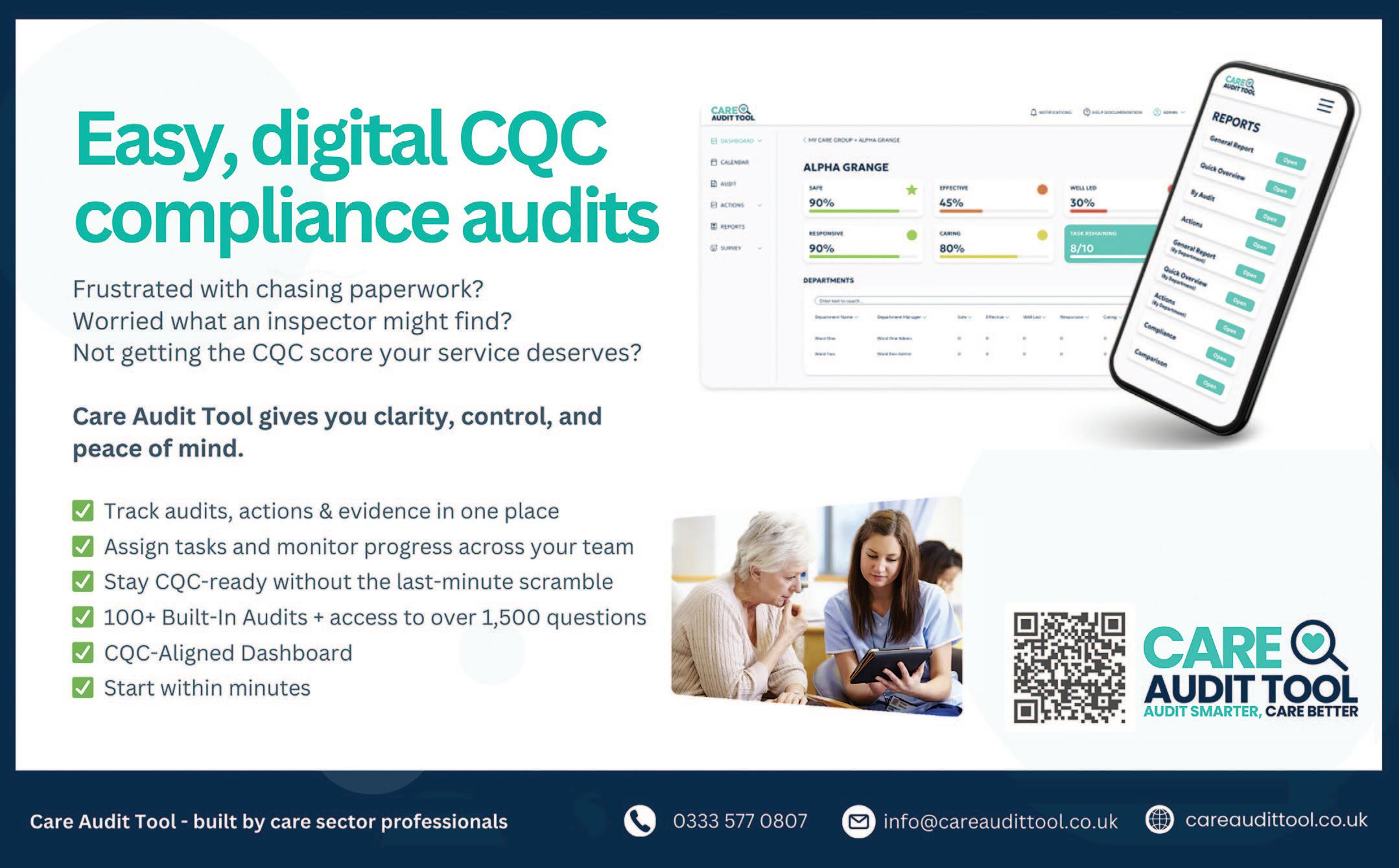

When Sharon’s mum Monica lost her partner and began struggling with her health, Sharon found herself trying to care from a distance—juggling a demanding job in Exeter with near-daily phone calls and constant worry about her mum, who lives alone with her two dogs in Barnstaple, Devon.
“Mum was always independent, but after losing her partner and being told she needed a hip replacement, she became withdrawn and physically frail. I was constantly worried,” said Sharon.
“I’d ring every morning to check she was up, had taken her pills, had something to eat. It was overwhelming.
“She didn’t want a carer. She insisted she didn’t ‘need care.’ But with living over an hour and a half away, I knew I needed to find some kind of support for both of us.”
Sharon learned about new technology being offered by her employer Bluebird Care N.E.W. Devon in partnership with Access Health, Support and Care (HSC), using discreet technology enabled care (TEC) to provide reassurance without intrusion.
The system, Access Assure, uses non-intrusive smart home devices – no cameras, no recordings – just sensors placed around the home to understand daily routines. Movements like opening a cupboard, boiling the kettle, and general mobility patterns are monitored, with alerts sent to family members if anything out of the ordinary occurs or daily living activity patterns change.
For Sharon, the reassurance was instant and the relief had an immediate positive impact on her own wellbeing.
Article supplied by The Access Group
“Suddenly, I wasn’t waking up worried. I knew Mum was up and moving, when the kettle went on, when she’d opened the medicine cupboard. And I knew I’d be alerted if anything changed for Mum.
“It completely changed our dynamic. I could go back to being her daughter again, not just her carer.”
A Bluebird Care N.E.W Devon professional now visits once a week to check the equipment and provide some company.
What started as a technical check-in is now something Sharon’s mum actively enjoys, helping ease the path toward accepting future care, should she need it.
“I didn’t expect technology to bring us closer,” Sharon reflected. “But it has. When I visit now, we go out, we laugh, we just enjoy each other’s company again.”
The smart system behind Sharon’s peace of mind uses AI to learn her mum’s typical routines and flag any irregularities, like missed medication or disrupted sleep, while preserving her Mum’s privacy.
It’s a lifeline that’s helping more families keep loved ones safe at home, without compromising their dignity or sense of autonomy.
“This has been a game changer for us,” Sharon said. “I’d recommend it to anyone.”
William Flint, Director for Bluebird Care N.E.W Devon said: “Using TEC has changed the way we think about care at home. It’s not just about early intervention or risk reduction, it’s about giving families space to reconnect, to be daughters and sons again for example, not just carers.
“It’s a powerful reminder that the right technology, used in the right way, can be deeply human.”
Andy Sparkes, Managing Director for Access TEC, added: “Access Assure is about more than sensors, smart technology, or even an intelligent dashboard that transforms data into meaningful action.
At its core, it’s about reassurance and restoring peace of mind. Families like Sharon’s shouldn’t have to choose between their loved ones living independently and their safety.
“This technology works quietly in the background, empowering individuals to live fulfilling and meaningful lives in the place they choose, while making sure someone’s always on hand if they need that extra layer of support.”
Following stories like Sharon’s, Bluebird Care N.E.W Devon is now preparing to roll out Access Assure across more of its services, bringing the benefits of technology enabled care to families across the region.
PASS by everyLIFE has announced the launch of PASSgenius™, a powerful new suite of data, AI and automation tools built into its award-winning care management software – marking a major step forward in digital innovation for social care.
Designed to turn complex data into clear, actionable insight, PASSgenius™ helps care providers make faster decisions, plan smarter rotas, reduce admin and stay ahead of risk – using the information they already collect.
Commenting on the launch, Robin Batchelor, CEO of PASS by everyLIFE, said: “Care providers are under more pressure than ever. With PASSgenius™, we’re giving them the tools to unlock the power of the data they already hold, helping them make better decisions, deliver safer care and free up time for what really matters.”
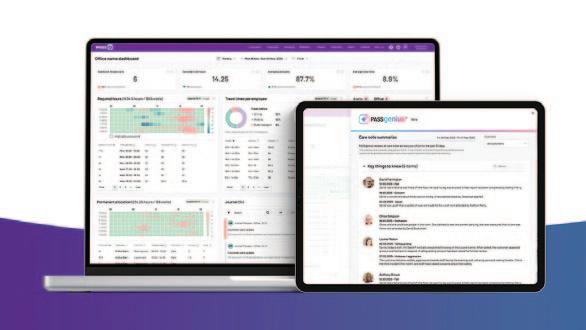
One of the standout features of PASSgenius™ is its AI-powered care note summaries – a tool that can scan weeks of care logs in seconds and highlights key changes in behaviour, health or mobility, helping
teams identify risks earlier and provide more responsive, person-centred support. Instead of reviewing long records manually, users receive concise summaries and recommendations that surface what’s changed and what needs attention, improving both care quality and continuity across shifts. At the heart of the new suite is the PASSgenius™ Dashboard – a fully interactive, customisable dashboard that provides real-time oversight across key performance areas, such as:
• Required hours: Spot gaps in care hours early and plan ahead
• Pending hours: See unassigned visits and fill them faster
• Travel time: Flag long journeys and improve routing
• Punctuality: Track lateness trends and take action sooner
• Cancelled hours: See costly cancellations and reduce repeat offenders
• Missed and overdue visits: Catch missed visits fast and protect care quality
PASSgenius™ is available now at no extra cost to All-in-one PASS users.
To learn more or see PASSgenius™ in action, visit: www.everylifetechnologies.com/passgenius
Under-25s (Generation Z) have much to offer the world of care, especially as it progresses. In a constantly adapting industry, young people are key to helping care companies grow with the times, especially surrounding technology.
However, young people make up only 11% of care workers. Why is this? What is keeping Gen-Z from joining and staying in the world of care?
With the average care worker aged 45 and over a quarter of the workforce potentially choosing retirement in the next 10 years, there aren’t enough young workers to pick up the many mantles left behind. With social care already having the highest number of vacancies in the UK, care providers cannot afford for this number to grow and for their workforces to decrease.
Supporting service users is no 9-5 or Monday to Friday job. This alone can be off-putting to the under-25s, who may juggle education and prioritise a larger social life.
This is what Gen-Z values. They have entered the career world understanding the importance of mental health and their worth in the workplace - and they are often viewed negatively for this. But they couldn’t be more correct.
Just as care services get a bad rep for offering a poor work-life balance, Gen-Z gets a bad rep for prioritising a healthy one. You can see the dilemma. So, how can this be fixed?
Irregular, unsociable hours, poor workload management, and low resources can easily lead to poor staff retention. From the most recent

findings in 2021-2022, care saw a high turnover rate of 53% for those under 20 years old while care workers over 60 had a rate of 24%. It’s common for shift-based workers to feel they have very little control over their working lives, leading them to accommodate the shifts they have no say over. Especially due to last-minute scheduling and changes, many shift workers often must change or completely scrap personal plans - or wait until after shifts are allocated - resulting in lives only revolving around work.
As much as someone can be a work-first individual, removing time
By Becky Mundie, RotaCloud (www.rotacloud.com)
for personal and social lives - and simply downtime - can be damaging in the long run, causing stress and mental health issues. Factor in graveyard shifts or being on-call, and the feeling is greatly exacerbated.
Is there any wonder, when combining this with the high workload and responsibility that comes with care, that the under-25s - the generation valuing mental health - make up so few care workers?
There are simple ways to remedy this, however.
Simply offering flexibility, allowing staff to have a say in the days and hours they work, and offering the ability to oversee shifts further in advance, can make all the difference.
Implementing digital automation allows staff to feel more in control of their work and lives. This alone can greatly improve employee experience.
Surprisingly, employee experience can go hand-in-hand with updated technology - and what goes hand-in-hand with technology? The generation that has grown up with it.
Not only does digital automation benefit your service users, employees, and overall business growth, but it will also make your workplace more attractive to the new generation - who, once joining, can make adopting these new technologies and processes all the smoother. Under-25s are the future, as well as new technologies. It’s time to start investing in both.
For further information on RotaCloud, please see facing page.

By Elena Martin, Director of Operations and Commissioning, Langdale Care Homes
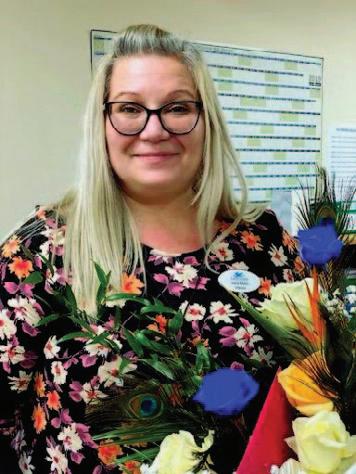
In the ever-evolving landscape of adult social care, it is essential to ensure that training initiatives not only equip care professionals with the necessary knowledge and skills but also nurture an environment where they feel confident and supported to deliver their best.
As a Registered General Nurse with over two decades of experience in the care industry, I have seen first-hand how thoughtfully designed training programmes can bring about meaningful changes that resonate with both staff and residents. These programmes, when aligned with the real-world needs of care professionals, have the power to transform not only the quality of care but also the overall morale and satisfaction within the care setting.
One of the key features of impactful training is its accessibility, relevance, and applicability to the challenges faced by care staff on a daily basis. From comprehensive first aid instruction to specialised courses on dementia care, well-designed training modules can provide care professionals with the tools and techniques required to respond effectively to a variety of situations. By prioritising the development of our staff's clinical proficiency, we enable them to deliver high-quality, person-centred care that focuses on the well-being and dignity of residents.
However, building confidence and capability goes beyond technical skills alone. It is equally vital to focus on the interpersonal skills that underpin meaningful relationships with residents and contribute to their overall happiness and fulfilment. Training programmes that emphasise relational care, for instance, can help care staff appreciate the importance of creating an atmosphere of trust and understanding. By encouraging
staff to focus on these human aspects of care, we cultivate a setting that radiates warmth and kindness, ensuring that residents feel valued and respected.
Moreover, to ensure that staff can consistently provide the best possible care, our training must remain adaptable and responsive to emerging trends and best practices in the sector. By implementing regular refresher courses, we reinforce foundational knowledge, address any skill gaps, and ensure that care professionals are up to date with the latest advancements. Similarly, ongoing supervision and performance evaluations play a vital role in identifying opportunities for professional growth, creating a framework of accountability and continuous development. This commitment to lifelong learning not only enhances the quality of care but also reinforces a sense of purpose and pride among staff.
The ripple effect of robust training programmes extends far beyond individual care professionals. When staff feel confident, valued, and well-equipped, they are better positioned to deliver exceptional care that is tailored to the unique needs and preferences of each resident. This, in turn, results in improved well-being for residents, greater peace of mind for their families, and stronger outcomes for the care community as a whole.
At the core of our training philosophy lies the understanding that empowered staff lead to empowered residents. When care professionals are equipped with the knowledge, skills, and assurance to excel in their roles, they are better able to encourage residents to maintain their independence, involve them in decisionmaking, and take the time to truly listen to their stories and concerns.
In conclusion, aligning training with the practical needs of both staff and residents goes far beyond fulfilling regulatory requirements—it is the foundation for fostering confidence, compassion, and excellence in adult social care. As we look ahead to the challenges and opportunities of the future, let us remain steadfast in our commitment to investing in our staff, enabling them to make a lasting difference in the lives of those they care for.
In today’s care home environment, staff training is under constant pressure. Limited time, tight budgets, and high workloads mean traditional training methods often struggle to keep up. Yet, with complex conditions like diabetes affecting up to one in four residents, there’s never been a greater need for effective, accessible learning.
Game-based learning (GBL) offers a powerful way forward. Whether through board games, card games, or digital tools, GBL turns essential training topics into engaging, memorable learning experiences that fit seamlessly into busy care home routines. It’s proven to boost knowledge retention, spark discussion, and improve practical understanding.

Focus Games (www.focusgames.com) leads the way in this space, with a wide range of evidence-based games developed for health and social care. Their innovative Virtual Care Home is a standout example—a digital environment where staff can explore realistic care scenarios, click on hotspots, and practise deci-
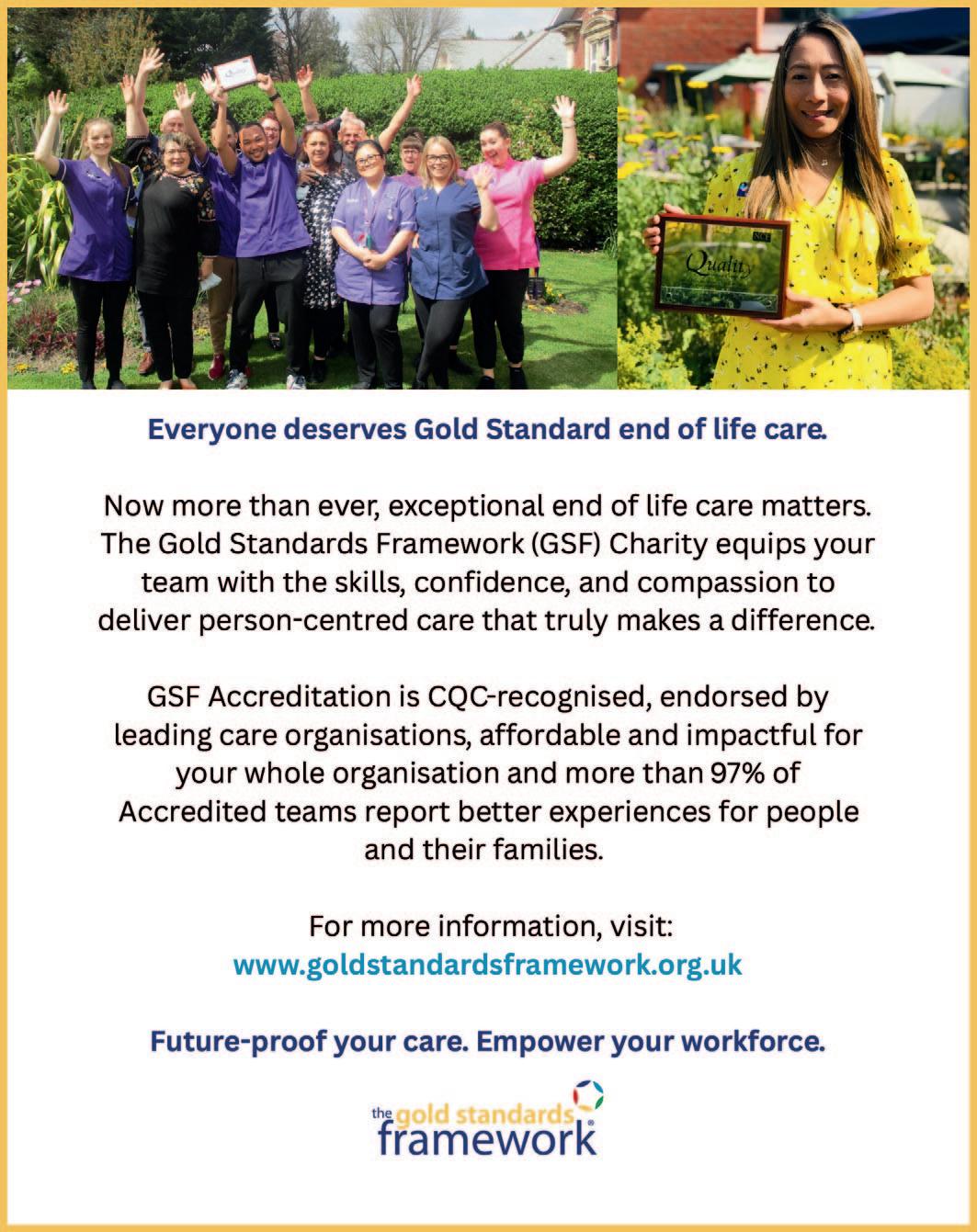
sion-making in a safe, simulated setting. From managing blood glucose to identifying signs of hypoglycaemia, staff gain confidence in handling real-world challenges. All on their pc or smart pnone!
Best of all, these ready-to-use resources are designed to be flexible. Maximising every learning opportunity. With options tailored to your setting, including customisable content and multi-modal learning styles, there's a solution for every home. In a sector facing increasing demands, GBL offers a costeffective, forward-thinking way to build skills and confidence. Whether you're new to game-based learning or ready to take it further, now’s the time to explore the difference it can make. To discuss our virtual care home resource contact info@focusgames.com.
See our cover advert for a special discount code to get started today. Visit www.focusgames.com
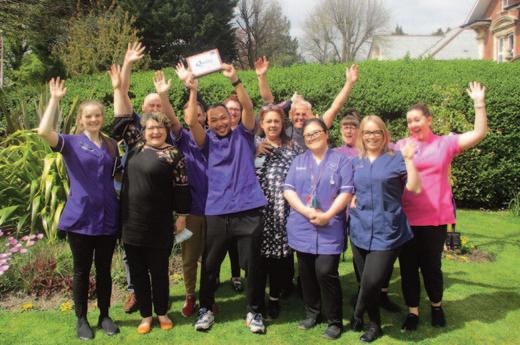
of life care that you provide and is: CQC-Recognised
Endorsed by sector leaders
• 97% report better experiences for patients and families
• Affordable and impactful for your whole organisation
Join the

Cyber security is an increasing concern in social care, with data breaches, phishing scams, and cyber attacks putting sensitive information and essential services at risk. However, learning about cyber security can often feel overwhelming, full of jargon, and difficult to apply to everyday situations. That’s where the Digital Care Hub’s new Cyber Game comes in—an engaging, interactive way for adult social care providers to learn vital cyber security skills.
Learning doesn’t have to be dull. In social care, where training is essential but time is scarce, gamification—using game-like elements such as quizzes, rewards, and interactive challenges—makes learning more engaging and memorable. It provides a safe space to learn and make mistakes, increasing engagement, motivation, and knowledge retention. Gamification also allows for instant feedback and supports long-term behaviour change, making it an effective tool for cyber security training.
The Digital Care Hub has launched the first-ever Cyber Game designed specifically for adult social care providers. It offers a fun and practical way to learn about cyber security and data protection, helping care managers, care workers, and other staff members develop the skills they need to keep their organisation safe.
The Cyber Game takes players through real-world scenarios relevant
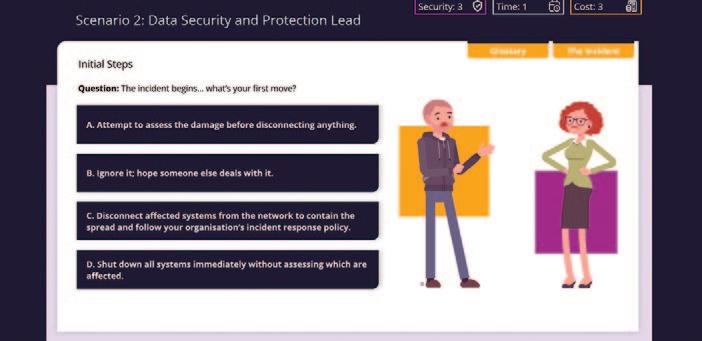
to social care settings, making it easier to recognise and respond to cyber risks in a safe environment. Whether it’s identifying a phishing email, ensuring secure data sharing, or responding to a cyber incident, players gain hands-on experience that translates directly to their work environment.
One of the biggest challenges in cyber security training is making it relatable. The Cyber Game brings cyber risks to life through realistic characters and workplace situations. Players can take on the role of a registered manager, a data protection lead, or a care worker, each facing different cyber threats.
Each scenario is based on real cyber incidents that have affected
The delivery of safe care is the paramount responsibility of social care providers. Central to achieving this is the governance framework adopted by service providers. And at the core of this framework are policies and procedures. These enable the provider to comply – and evidence compliance – with relevant legislation and regulations, as well as facilitating best practices, supporting business needs, and assisting in recognising and managing risks.
Providers have a legal duty of care to the people they employ. Policies and procedures should provide clear guidelines to staff on how the organisation operates, as well as informing them of best practices and processes to be followed.
Policies should be reviewed annually as a minimum to ensure they are still fit for purpose and align with legal and regulatory requirements. They should be reviewed not only by employees of the business, but also by experts in various subject matters (e.g., infection control or medicines management).
For many small- to medium-sized providers, there may not be the in-house skills, knowledge, and experience to complete such a robust annual review. Many choose instead to purchase their policies and
social care providers. The goal is to manage the crisis effectively—containing the damage, notifying the right people, and implementing steps to prevent future incidents. Decisions impact security, time, and cost, requiring players to balance risk and consequences.
WHY GAMIFY CYBER SECURITY TRAINING?
Daniel O’Shaughnessy, from the Digital Care Hub, explains:
“We created the Cyber Game to make cyber security training more accessible and engaging. Gamification encourages active participation and helps staff retain information better, making learning feel rewarding and practical.”
WHAT CARE STAFF SAY
Care staff who tested the game found the scenarios helpful and realistic:
“These are good scenarios – typical and indicative of what may occur and give people an idea of what they need to be thinking about.”
Through interactive decision-making, players experience the consequences of their choices, reinforcing key lessons in a way that traditional training cannot.
TRY THE CYBER GAME TODAY!
The Cyber Game is available online, completely free to play. It’s a great way for care providers to improve their cyber security awareness in an engaging and practical way.
Play the game online at: www.digitalcarehub.co.uk/cyber-game
procedures from a reputable provider like W&P Compliance & Training, who will also complete reviews and ensure their policies and procedures remain up to date. This way a provider not only ensures they remain compliant; they also benefit from best practice policies and procedures that provide a solid foundation for safe working practices and – ultimately – protect and support service users and staff.
Ben Erskine – Director at W&P Compliance & Training www.wandptraining.co.uk | Tel: 01305 767104

See the advert on page

By Satya Cashman, Partnerships Manager for national charity Dementia Carers Count
Here at Dementia Carers Count we’re supporting professional carers, looking after increasing numbers of people with dementia. Day in, day out, we provide emotional advice and practical support to family carers, as they cope with the challenges of dementia care. Those challenges don’t stop when a loved one moves to a care home. They change. And what many families tell us is, they would like better support from the professional carers they meet.
In fact, of the 1,300 family dementia carers who responded to our 2023 survey, only one third agreed that paid carers understood their needs. This is worrying, given the best possible person-centred care is only possible through working in partnership with families
With estimates of the number of professional carers receiving dementia training as low as 29%1, it could be that some carers just don’t have the training or practical experience to support families well. But most care homes invest in regular dementia training, and a host of other professional requirements. Despite this, many families are not confident about paid carers’ understanding of dementia. Only around a quarter (27%) of our 2024 survey respondents said that paid carers had a ‘good understanding of dementia and dementia care2
So, what could you do differently to ensure your busy, committed and hard-working team have everything they need to support residents and families with the care and compassion you’d want?
Well, whilst you’re busy arranging shift patterns, cover, inspections,

visits and the rest, it’s easy to overlook problems with the current basic training model:
1. Dementia has so many presentations, and no one prognosis, affecting every person differently. To provide high-quality, person-centred care for people with dementia, you need a wide range of knowledge from a broad practice base.
2. Staff churn is challenging for any care business. But all too often, staff
move on because they don't feel confident or supported by low-quality training, when they do face those challenging situations.
3. It’s tough getting carers together for a whole or half day of training. Arranging shift patterns and cover, transport from other sites, or managing sickness and emergencies.
At Dementia Carers Count, we understand the pressures you face and the genuine commitment you have to your residents. As a dedicated charity, our mission is to improve support for anyone caring for someone with dementia. That’s why we’ve developed short, regular interventions, delivered live by trainers with experience and insight, to help your staff understand all the dimensions of expert dementia care for your clients and their families.
Our 90-minute format minimises disruption to your schedules, while maximising learning outcomes. These focused sessions share genuinely useful knowledge in an accessible and engaging way. And as all our CPD accredited training comes from years of experience supporting carers, you can feel confident you’re your staff will learn from the very best. What’s more, proceeds from our training go to our work for family carers across the UK. When you work with us, you're supporting your team and your local community.
To speak to Satya and find out more about training – visit www.dementiacarers.org.uk/what-we-do/dementia-training
A host of health and social care courses delivered by leading training provider Realise have received the new Quality Assurance Care Learning Services (QACLS) endorsement.
The Department of Health and Social Care (DHSC) has taken on responsibility for reviewing the quality of individual courses and qualifications delivered by training providers within the sector.
Realise submitted 11 of its health and social care
programmes to be quality assured – and all received the stamp of approval, including the Level 2 Adult Social Care Certificate.
Funding for health and social care qualifications is now provided through the Government’s Learning and Development Support Scheme (LDSS), which has replaced the Workforce Development Fund.
From April this year, only courses and qualifications delivered by training providers that have been
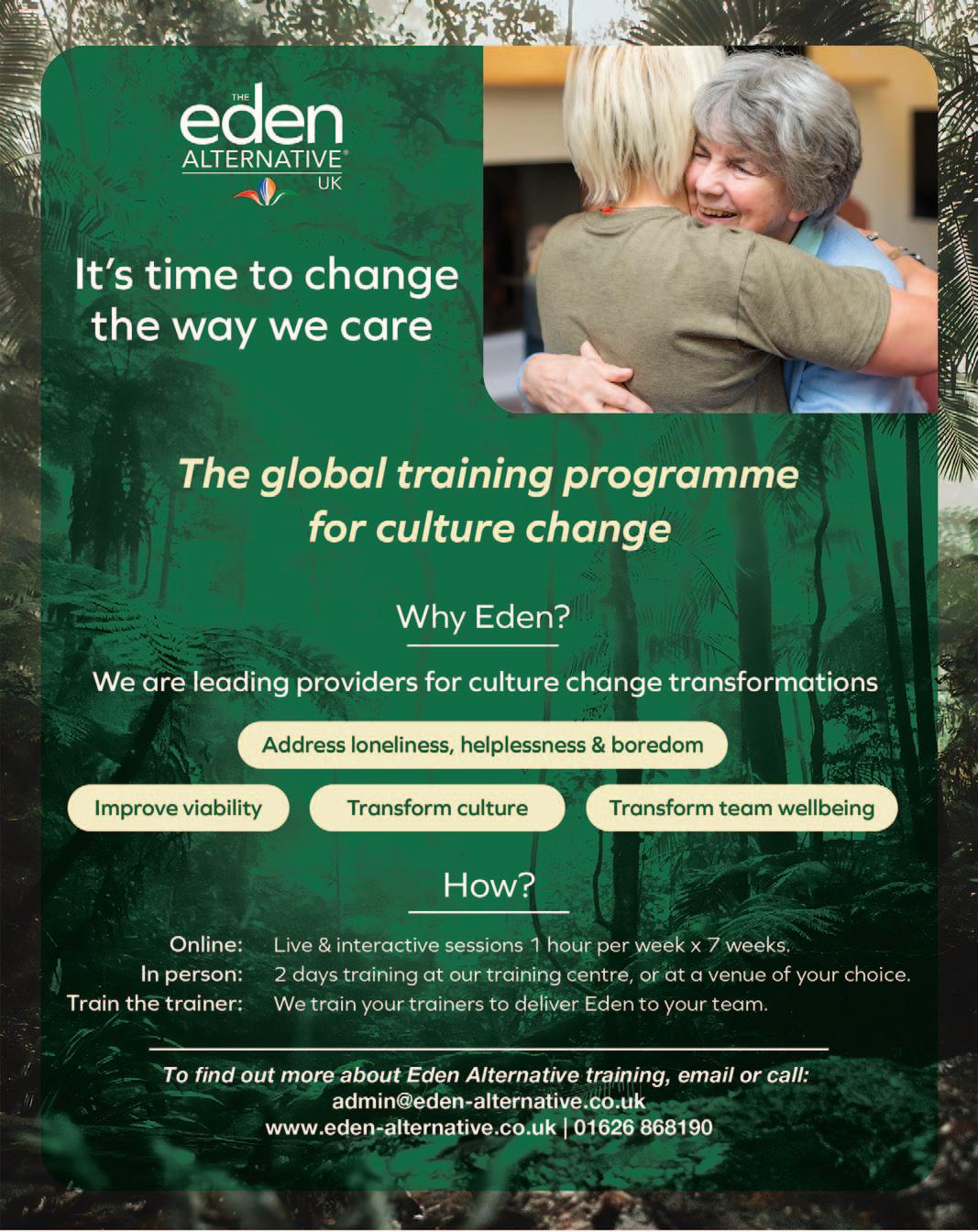
QACLS endorsed will be identified as preferred options by LDSS.
And from next year onwards, employers will only be able to claim LDSS funding for courses that have been quality assured.
Care providers currently have to replace almost a third of their workers each year due to staff leaving their jobs. This high turnover has a negative impact on the quality of care - and the DHSC hopes the QACLS endorsement will help boost retention.

Lesley O’Connor, Head of Strategic Development at Realise, said: “We are absolutely delighted to be one of the first training providers to achieve endorsements across a wide range of courses.
“This new system marks a step-change for the industry as it means, for the first time, individual courses are being reviewed rather than the training provider as a whole in an attempt to drive up standards.
“The approval process was thorough, looking at evidence of quality of delivery, testimonials, achievement rates and policies.
“Being QACLS endorsed is very important as it demonstrates quality and also allows employers to continue to claim LDSS funding. Soon employers will have to pay the full price for programmes that are not endorsed.
“We look forward to working with employers who
"23 years, operating 4 Devon Nursing homes, has been pretty tough, as anyone in social care, knows, only too well. And if it was hard already, after 2024 budget, it's just got harder.
Anyway, at heart, I am just customer of Eden Alternative, and it was a stroke of luck to come across this whilst on holiday in New Zealand in 2009. It started in USA in 1994 and now runs in 22 countries.
The fact that I am now involved with this not-forprofit organisation (in the UK area) came about when one of the 2 main UK directors died suddenly just before Covid. But it's something I have run with for 11 years to help make 'vision' a reality, not a struggle. So, being both a customer and helping the admin seems quite natural.
It is a modern philosophy of care, but moreover, it's
can benefit from quality assured training.”
The QACLS endorsement lasts for three years, with regular monitoring every six to nine months.
Realise will strive to have all its health and social care programmes approved through QACLS during phase two and three of the process. Phase two runs from now until the end of the 2025-26 financial year, and phase three follows immediately after.
The Government says it is "fully committed to a professional, well supported social care workforce" with learning, development and training that is "of outstanding quality, relevant and accessible".
The full list of Realise’s 11 quality assured courses are: Level 2 Certificate in Understanding Autism, Level 3 Certificate in Understanding Autism, Level 2 Adult Social Care Certificate, Level 2 Certificate in Understanding the Care and Management of Diabetes, Level 2 Certificate in Falls Prevention Awareness, Level 2 Certificate in Understanding Nutrition and Health, Level 3 Diploma in Adult Care, Level 4 Diploma in Adult Care, Level 5 Diploma in Leadership and Management for Adult Care, Level 2 Certificate in Understanding the Safe Handling of Medication in Health and Social Care and Level 2 Certificate in Awareness of Mental Health Problems For more information, visit www.realisetraining.com
a programme that is straight forward, tried and tested for 30 years and really works. Its member care organisations generally become trainers for their own teams, and run it themselves. The programme is run in person over 2-3 days or online 1 hr a wk for 7 weeks. You choose. It addresses loneliness, helplessness and boredom and operates through 10 principles to underpin 7 critical domains of wellbeing.
Moreover, it's effective, transformational and really works. As residents, and team members wellbeing, matter so much , it's a must, in my opinion. Geoffrey Cox Southernhealthcare.co.uk eden-alternative.co.uk"

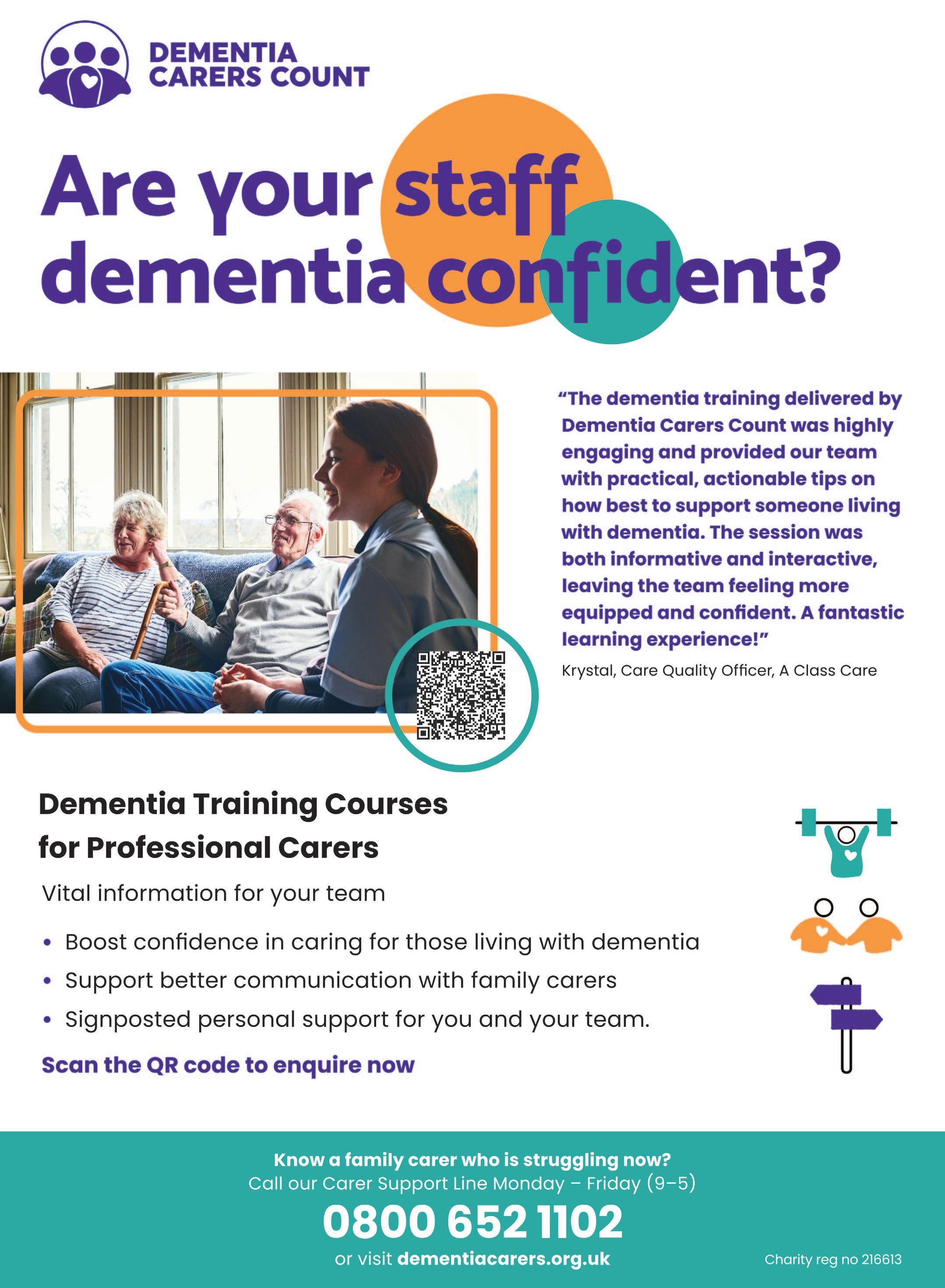

From April 2022, the Health and Care Worker visa route gave UK care providers a desperately needed pipeline to international talent. But with the current Labour Government signalling an end to this route, providers are once again staring into the eye of a workforce storm.
It’s a pivotal moment. The social care sector already faces more than 150,000 vacancies. Labour costs are rising sharply, up to 10% in 2025 alone, driven by increases in the National Living Wage and employer National Insurance contributions. Now, with international recruitment under threat, many operators will see their already narrow options for staffing become even tighter.
Ending the care worker visa route is more than a headline, it has real operational consequences. It’s no secret that providers have leaned heavily on overseas hires to fill roles that remain persistently unattractive to the domestic workforce due to pay, flexibility and public perception.
Cutting off this access will likely drive greater dependence on agency staff, which are not only costly, often commanding 30% premiums, but also disrupt continuity of care and team morale.
Even before this immigration shift, providers were bracing for significant
financial pressure. A typical organisation with a £100m income is already facing £5.5m in additional labour-related costs, including £7m from wage increases and £5m from higher employer NI contributions.
And that’s without factoring in the operational impact of the upcoming Employment Rights Bill. Since April, predictable scheduling, compensation for last-minute changes and stricter zero-hours rules have become mandatory. That means more administrative load, less flexibility and higher staffing costs.
In short, the financial squeeze is very real. And the traditional cost-cutting playbook, reducing staff ratios, asking councils for more funds, or freezing employee benefits, is no longer viable, especially when quality of care and compliance are non-negotiable.
A modern response: smarter operations. So what now?
The good news is that providers aren’t powerless. The most resilient organisations are shifting from reactive crisis management to strategic operational transformation. That means investing in systems that make labour smarter, not just cheaper.
In our latest industry report, we break down how providers are already unlocking significant savings and efficiencies through smarter operations.
Modern shift management platforms, for instance, allow providers to surface open shifts to existing team members quickly, reducing the need to fill gaps with costly agency staff. In one example, agency spend dropped by 38% within four weeks of deploying a new digital scheduling solution.
Additionally, better time tracking tools with geo-fenced clock-ins and payroll integrations have helped providers save up to £4.2m annually by avoiding overpayments and automating manual processes.
Intelligent scheduling systems now also use commissioned hours and
By Abbey Milne, Social Care Lead of Sona (www.getsona.com)
real-time staffing data to avoid both understaffing and costly overstaffing. This has led to 2–5% savings in total labour costs, equivalent to up to £3m for some organisations.
With new compliance demands arriving this year, reducing the administrative burden is critical. Tools that consolidate scheduling, HR and payroll into one workflow can free up hundreds of hours per year, allowing managers to focus on team support and care quality.
This isn’t just about efficiency, it’s about survival. According to a recent Hft and Care England report, a third of providers are now considering exiting the market due to cost pressures and long-term uncertainty. But those who embrace operational transformation stand a chance not just to weather this shift, but to emerge stronger.
At Sona, we help social care providers meet today’s challenges head on, with solutions that drive efficiency, empower teams and elevate care. Advinia, a residential care provider with over 4,000 employees, was spending between £35,000 and £40,000 a week on agency cover. After transforming their internal scheduling strategy, they brought that figure down to £16,000 a week, a change that’s not just financial but operationally transformational.
As leaders, we need to view this moment not just as a policy change but as a call to action. The gap between those who invest in smart systems and those who don’t is widening, and fast. Providers that digitise their operations, empower their teams, and deliver consistently high-quality care will be the ones who thrive in this new era.
While we can’t control the economic landscape, we can control how we adapt. The providers who do so with agility and foresight will help shape the future of social care, not just survive in it.

We are a leading supplier of comprehensive healthcare staffing solutions to care, residential and nursing homes, hospitals, medical facilities and establishments that need person-centred personnel.
By providing staffing solutions that are both cost-effective and highquality, Nexime Healthcare helps with everything that is required. Our extensive database of experienced Support Workers, Carers, Healthcare Assistants and Nurses of various specialities is available to provide highquality care on demand to our clients for:
• One-off shifts, staff absence and shortfalls (often at very short notice),
• Establishing a new unit, whilst permanent staff are recruited,
• Emergency cover during very busy periods,
• Temporary or permanent positions,
• Regular support to full-time teams,
• Contract or SLA (Service Level Agreement) arrangements.
We’re a one-stop, temporary employment business operating nationwide and providing dependable and experienced Nurses, Healthcare Assistants, Carers, Support Workers, domestic and other types of staff.
We are proud of our values, manners, good timing and a friendly ‘can do’ attitude. We’re professional and our clients know that there’s no substitute for our dependability, reliability and our prices.
Owned and managed by people who have years of experience within the healthcare sector, Nexime Healthcare knows what it takes to match the right staff with clients needs. Using our insights into what is required
for each situation, we provide a service with professionals trained for each and every scenario. With access to a broad network of available staff, we can find the right person for the assignment. Nexime Healthcare will make sure you gain access to the reliability, flexibility and experience that you need to support your own clients. We know how critical these are to you.
What we have always done better than anybody else is to provide the highest quality care staff. We apply internal Quality Assurance Systems, that are continually being improved, during our rigorous hiring process. It is essential to us and our clients that our staff are compliant. 0151 673 1899
info@neximehealthcare.co.uk www.neximehealthcare.co.uk
A TEAM of experts have come together to disrupt the expensive and complex social care system by launching an ‘app’ to bring care homes/providers and carers together using AI.
AgoraStaff, a temporary staffing app for the social care sector, is the brainchild of Richard Williams-Pears, a longstanding Cornwall councillor and former mayor of St Austell, who saw firsthand the rising costs and inefficiencies in social care.
He teamed up with his wife Jolene, AgoraStaff’s Director of Outstanding Compliance, who has an extensive background in operating theatres, and Janet Shreeve, who brings hands-on care sector experience from running Shreeve Care Services, based in Wiltshire.
Together, they partnered with tech experts Ben Grave and Simon Wetherell —creators of the UK’s leading asbestos management system - to bring the app to life.
Richard said: “Providing care is expensive and it’s even more expensive if a care home, local authority, or other care provider has to pay an agency to find carers, particularly at the last minute. The carer gets minimum wage, or just above and the agency takes a hefty cut on
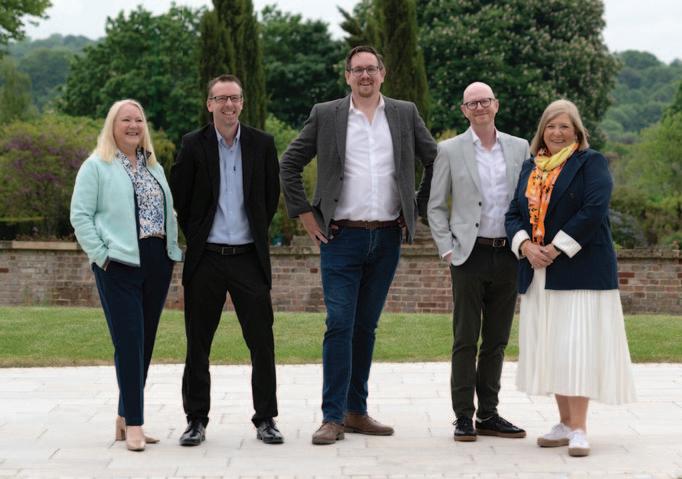
average around 30% of the fee from the provider.
“We felt there had to be a better way, using modern technology, to speed up this process leaving more money available for carers and providers. So much money is lost on agencies sitting in the middle between providers and carers, our app is designed to cut through this inefficiency.
“We have therefore combined deep sector knowledge with smart tech.”
Janet Shreeve is the Chief Business Development Officer

for AgoraStaff. She said:
“Many carers throughout the UK are self-employed and rely upon agencies to find them suitable shifts. Our marketplace gives them the opportunity to not only register for free but have complete control over the shifts they apply for and undertake.
“We are committed to ensuring the carers within our marketplace are the best professionals for individual roles. We achieve this with a vetting process to ensure they are legally entitled to work in the UK (if relevant) and must register their relevant training. They will also have the option to undertake more training to enhance their rolesa concept not commonly found within traditional agencies.”
AgoraStaff goes live week commencing May 19th in Somerset and the surrounding counties.
Care providers can sign up for the app for a monthly fee of £34.99 per location (plus five per cent from the agreed daily shift fee) and trained carers sign up FREE once they have completed the vetting process.
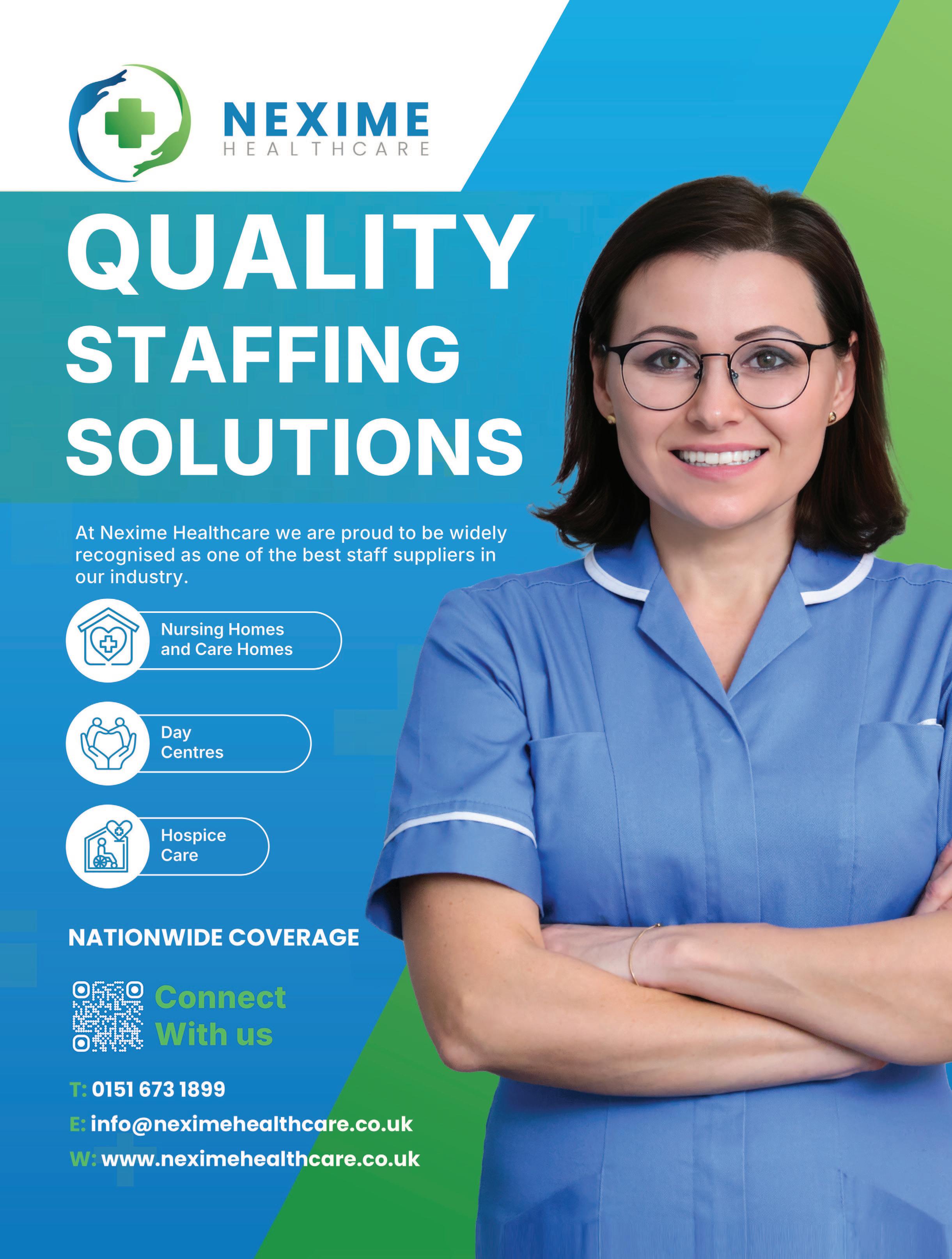
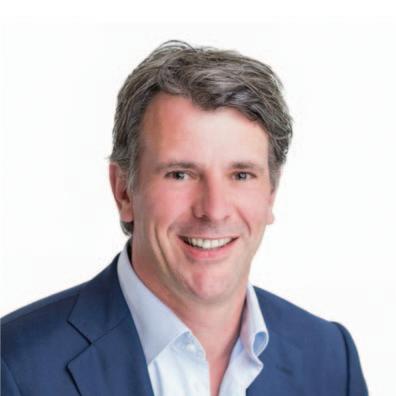
Conducting full employment screening and vetting is recognised as a fundamental element of the hiring process, particularly when working with vulnerable groups in the nursing and care market. However, these processes may be occasionally overlooked, or elements may be missed by some employers looking to quickly recruit and onboard new staff to fill critical gaps in their workforces. However, even in what remains a highly skills-short environment, failing to carry out thorough checks on people employed in any capacity could open the door to a range of risks that can have a critical impact on vulnerable populations. Perhaps more concerning is the fact that this trend is growing as more care facilities are turning to the gig workforce — a notoriously complex segment to vet and screen.
The gig workforce has grown in parallel with seismic shifts in the nature of employment in the UK. Fewer people are seeking ‘a job for life’ than ever before, and the number of those operating on a gig basis has more than doubled in size in recent years. In fact, data suggests that an estimated 7.25 million people (around 22% of the workforce) participated in some form of gig work in the UK in 2024, and there are 1.7 million professionals who work solely in this way.
Gig models are also highly popular in the care industry, and there is evidence that the workforce in this sector may actually be the largest one across the entire market. In addition, recruitment services for the gig workforce are increasingly being delivered via digital platforms, but according to a recent UK Government report, only 41% of gig platforms require enhanced Disclosure and Barring Service (DBS) checks, and fewer still verify qualifications or conduct ongoing vetting.
While there’s no doubt that the gig model provides greater flexibility to both individuals and employers, and may help to tackle staff shortages seen in the child and social care markets, it has also opened the door to increased risks, particularly when it comes to fraud, misconduct, and exploitation if workers are not thoroughly vetted.
The rising risks in not carefully screening gig workers are only intensifying. A study from 2023 by CIFAS, the UK’s fraud prevention service, revealed a 22% rise in ‘insider threats’ and employee fraud compared to the previous year. Perhaps most alarmingly, one in five of those frauds were committed within the first three months of employment.
By Rolf Bezemer, Executive VP and General Manager International at First Advantage
In the care sector especially, mitigating risk such as fraud could and should be tackled through a thorough and careful inspection of candidate backgrounds and working history. However, employers may be under significant pressure to rapidly fill workforce gaps to meet rising demands for care. At the same time, they must maintain high standards for residents and their families, which inadvertently leads to some processes being overlooked.
This would be a challenge in any working environment, but with roles in care and nursing that support vulnerable populations, this oversight could have drastic consequences. Providers that don’t fully vet or screen staff risk the wellbeing of their populations, the safety of their facilities, and may face potential for consequences (reputational damage, heightened legal liabilities, financial losses, and lost public trust).
On top of the potential damage caused by these risks, failure to prevent fraud is also likely to become a corporate offence once the Economic Crime and Corporate Transparency Act 2023 is fully enacted. And, on March 30 2025, the Home Office announced a further crackdown on illegal working in the gig economy by those without the necessary right to work status. These emerging rulings place a greater onus on the employer, meaning those that fail to vet staff — inadvertently or not — who then go on to commit fraud, could be criminally liable for their inaction and face major fines or even potential prison sentences.
The strength and quality of care provided by any home is also dependent on its employees – no matter how short or temporary their contract or assignment. Conducting the fundamental elements of screening and completing thorough background checks on gig workers, not only when an individual starts a position, but also at any point they are engaged by the facility, is critical.
The digitalisation of modern society, alongside the growth of gig working models, makes it far easier for ‘bad actors’ to slip through the net. However, tech-backed screening processes and the use of digital identities to verify information also make it easier for companies to make well-informed, confident hiring decisions. Crucially, leveraging a modern, tech-first screening provider also supports the employers with their screening needs and helps them manage their compliance requirements.
It’s undeniable that the UK is in the midst of a major staffing crisis in this sector, with speed of hiring a top concern. It’s crucial to acknowledge, however, that screening and vetting gig staff is critical, and while it’s important to hire workers quickly, it’s even more critical to hire them safely and compliantly. That means that conducting adequate DBS checks, digital identity, right to work, credit and financial checks, as well as verifying references and carrying out ongoing monitoring on all gig workers may be important considerations for hiring organisations. It can be a significant undertaking, but partnering with the right screening vendor can help the hiring organisations with their compliance requirements
By Ben Stepney, Partner, and James Woollard, Trainee Solicitor,
in the Employment team at Thomson Snell & Passmore LLP (www.ts-p.co.uk)

The care sector in the UK provides essential support for the elderly, disabled, and vulnerable individuals.
In recent years, the industry has faced acute staff shortages, exacerbated by an ageing population, increased demand for care services, and reductions in funding from Local Authorities. The care sector is often not seen as an attractive place to work, with a perception of poor pay and conditions. As a result, visas have become a crucial mechanism for recruiting overseas workers to meet the staffing needs of care homes and other health and social care providers.
The UK social care sector employs over 1.5 million people, but there are approximately 131,000 vacancies in the adult social care workforce in England, a vacancy rate of 8.3%. Domestic recruitment has not kept pace with rising demand.
THE HEATH AND CARE WORKER VISA
In response to mounting pressure on from employers, the UK Government expanded the Health and Care Worker visa in early 2022. This visa allows eligible foreign nationals to work in specific roles within the NHS and adult social care. It is a subcategory of the Skilled Worker visa and offers several benefits: Reduced visa fees compared to other Skilled Worker routes
• Exemption from the Immigration Health Surcharge Faster processing times
• Eligibility for dependants (partners and children)
A route to settlement after five years.
To qualify, applicants must:
Have a confirmed job offer from a licensed UK sponsor (such as a care home or care agency)
Be employed in an eligible occupation (e.g., care worker, senior care worker)
• Be paid a minimum salary, generally £20,960 per year or £10.75 per hour (subject to change)
Meet English language requirements.
In March 2025, the government announced significant changes to the immigration system, particularly affecting the care sector. These reforms aim to reduce net migration to the UK generally but also address issues with recruitment in social care.
KEY CHANGES TO HEALTH AND CARE WORKER VISAS
Recruitment Prioritisation: From 9 April 2025, care providers in England must first attempt to recruit workers already residing in the UK before seeking overseas candidates. This policy encourages the employment of British citizens or those with Skilled Worker Visas already resident in the UK and aims to reduce reliance on immigration.
Employers must demonstrate they have attempted to recruit those already in the UK before trying to hire overseas. This requires employers to work with regional partnerships to identify suitable candidates before looking abroad. Employers must obtain confirmation from these partnerships that genuine efforts were made to recruit from within the UK and that no suitable candidates were available
Those already in the UK on Health and Care Worker Visas will be able to continue to work, extend their visas and switch to other visa routes including switching employers. Those already in the UK already will be able to switch into Health and Care Worker Visas until 2028.
Salary Threshold Increase: The minimum salary for those on Health and Social Care Visas has risen from £23,200 to £25,000 per year (£12.82 per hour). This adjustment aligns with the latest national pay scales and applies to new Certificates of Sponsorship issued from 9 April 2025.
Dependants: Care workers and senior care workers recruited after 11 March 2024 are no longer permitted to bring dependants to the UK. This measure addresses concerns over the high number of dependants accompanying care workers.
Employer Registration: Only Care Quality Commission (CQC) registered providers can sponsor care workers in England. Additionally, employers must demonstrate efforts to recruit from the existing UK workforce before hiring overseas notwithstanding the other changes announced.
These changes are part of a broader strategy to reform the UK's immigration system, aiming to reduce net migration. While the government asserts that these measures will encourage domestic recruitment and improve working conditions, critics argue that they may exacerbate existing staffing shortages in the care sector.
The Government's approach reflects a shift towards what it calls a more controlled and skills-focused immigration policy, with an emphasis employing UK citizens rather than relying on immigration.
These changes have raised concerns among social care providers and unions, who worry about potential workforce shortages and the impact on care services. The government is also proposing to increase the time required for immigrants to qualify for permanent settlement from five years to ten years, which may discourage some potential overseas workers.
The government has agreed to introduce an EU ‘youth mobility’ scheme, so employers may be able to make up any shortfall in their workforces from the changes to the Health and Care Worker Visas by recruiting from the European Union. Details of the ‘youth mobility’ scheme are still being outlined at the time of going to print.
The penalties for illegally employing someone remain severe and do not require fault on the employer’s part. So stay up to date on developments and periodically review your right to work compliance. Be prepared to provide information to existing employees who are on a visa and may be concerned about their right to work and how this impacts their dependents. Just being able to signpost them to guidance or further information may help reassure them.
Review your workplace planning. Are there visas expiring soon that may require sponsorship or additional checks before they can renewed.
Jennifer Moore, Director at Leonard Curtis Legal (www.leonardcurtis.co.uk)

Succession is one of the most pressing and personal decisions a care business owner will make. For many founders, particularly those who have built a service rooted in compassion, community and quality of care, handing over the reins is far more than a financial transaction. It’s also about legacy.
Increasingly, owners in the care sector are choosing to exit through Employee Ownership Trust (EOT); a structure that avoids the disruption that can often accompany third party sales, while simultaneously safeguarding their values, rewarding their team and securing long-term continuity.
At Leonard Curtis Legal, we’ve supported a growing number of businesses through the transition to employee ownership. In our experience, it’s not just a legal process, it’s a cultural shift that is transforming how businesses plan for the future.
An EOT is a government-backed ownership model that allows a business owner to sell a controlling interest (more than 50%) of their company to a trust set up for the benefit of all employees. If certain conditions are met, the sale is then exempt from Capital Gains Tax
discusses the growing number of care home businesses choosing Employee Ownership Trusts and explores the benefits for founders within the care industry.
(CGT), which is an obvious benefit for those planning retirement or succession.
While the trust doesn’t run the business, it does own it on behalf of the workforce. Decisions continue to be made by a management team, but under a new structure where the staff are the ultimate beneficiaries. In an industry where staff retention, engagement and continuity of care are vital, EOTs offer a compelling alternative to trade sales or private equity investment.
WHY
The values behind employee ownership align closely with the realities of social care. Businesses succeed here because of their people –the carers who turn up day after day to deliver life-changing support. Yet many of these same staff face limited recognition or reward. EOTs done well can help to rebalance that.
Businesses adopting the EOT model often benefit from improved staff retention and morale, a stronger sense of shared purpose and an increased perception of trust and credibility both internally and externally.
EOT-owned companies can also pay staff annual tax-free bonuses of up to £3,600, providing a meaningful benefit in a sector struggling to compete on wages alone.
LEGAL AND PRACTICAL CONSIDERATIONS
It’s important to remember that this is a legal transaction and one that must be carefully structured. To qualify for CGT relief, several conditions must be met. The EOT must acquire more than 50% of shares and voting rights, and the company must be a trading business and not an investment vehicle. It must also benefit all employees on equal terms and the former owners must not retain control.
In the care sector, time is one of the most precious—and limited—resources. Whether it’s a nurse supporting an elderly resident or a finance officer reconciling invoices across multiple funding streams, every hour counts. Yet while much attention is given to frontline care, a quieter crisis is unfolding behind the scenes: payment inefficiencies.
Care providers operate in one of the most complex funding landscapes in the UK. Between over 150 local authorities, 42 Integrated Care Boards, and thousands of self-funders, the process of paying and being paid is often fragmented and manual. That complexity doesn’t just create paperwork—it creates risk. Late supplier payments can disrupt services. Missed payroll deadlines can cause stress for care workers, many of whom live paycheque to paycheque. In a sector where emotional labour is high and financial stability is rare, a delayed or inaccurate payslip can tip the balance from just coping to burning out. When the back office falters, it impacts the front line.
As Victoria Ramsay, founder of Aequalis Accountancy, put it: “There’s a vicious circle. Late invoices mean poor cash flow, which means providers can’t afford to invest in the very systems that would solve the problem.”
And with care workers under unprecedented strain, payroll isn’t just an admin task—it’s a matter of respect. Timely, accurate payments send a clear message: we value you. Delays or errors, on the other
Global assists clients throughout the U.K. who specialise in the healthcare sector to achieve their objectives of purchase, development and refinance.
We have organised over £1.8bn for clients in the past 30 years, providing clients with competitively priced funding to refinance existing debt, ease cashflow and develop businesses further.
From helping clients make their first purchase through to allowing groups to grow significantly in size we assist at every stage of your business expansion.
hand, erode morale and trust at a time when retention is already a challenge.
The good news? Change doesn’t always require sweeping reform. One of the biggest wins can come from automating payroll and payments. Faster Payments, for example, allow providers to process transactions in seconds—not days—giving finance teams the flexibility to act quickly and confidently.
Crucially, automation frees up time. According to industry data, automating care payroll can reduce processing time by up to 90%. That’s hours saved every week—time that can be redirected back into care, strategy, and staff support.
What’s often missing from transformation conversations is this: operational efficiency is human efficiency. Every error avoided, every minute saved, helps build a care system that’s not just compliant, but compassionate.
In a sector stretched thin, improving payments isn’t a “nice to have.” It’s a foundation for dignity, stability, and sustainable care.
To learn more about how care providers are modernising payments, visit Modulr at www.modulrfinance.com/care-payments


Every proposal is individual and deserves to be treated that way, so we hope you will allow us to be of assistance to you and call us to chat through your plans and requirements, I am sure we will be able to tailor a facility to your requirements. Call us on 01242 227172 or e-mail us at enquiries@globalbusinessfinance.net
Once established, the trust is governed by a board of trustees usually including independent members and employee representatives. It’s vital that the governance structure reflects both the legal requirements and operational needs of a care provider.
However, in the care industry it’s not only about meeting technical criteria, we must also think about designing governance models that work for regulated services. That means considering CQC implications, continuity of leadership and long-term financial planning.
FUNDING THE TRANSITION
A common concern is whether a care business can afford to buy itself. In most cases, the purchase is funded through future profits of the company with the outgoing owner receiving deferred payments over time. Some providers also access third-party lending to accelerate the process.
Robust cash flow forecasting is key. Margins in the sector are often tight, so careful modelling is essential to ensure the business remains stable while making repayments. We work alongside accountants and lenders to manage this risk.
A FUTURE-PROOF MODEL FOR VALUES-LED CARE
What sets EOTs apart is the ability to exit and secure a fair financial return while keeping the culture and purpose of the business intact. In a sector increasingly shaped by scale and commercial pressure, that’s a powerful proposition.
For owners who have built care services with love and long hours and who want to leave something meaningful behind, employee ownership is more than a tax-efficient exit. It’s a legacy model.
PLEASE MENTION THE CARER WHEN RESPONDING TO ADVERTISING

